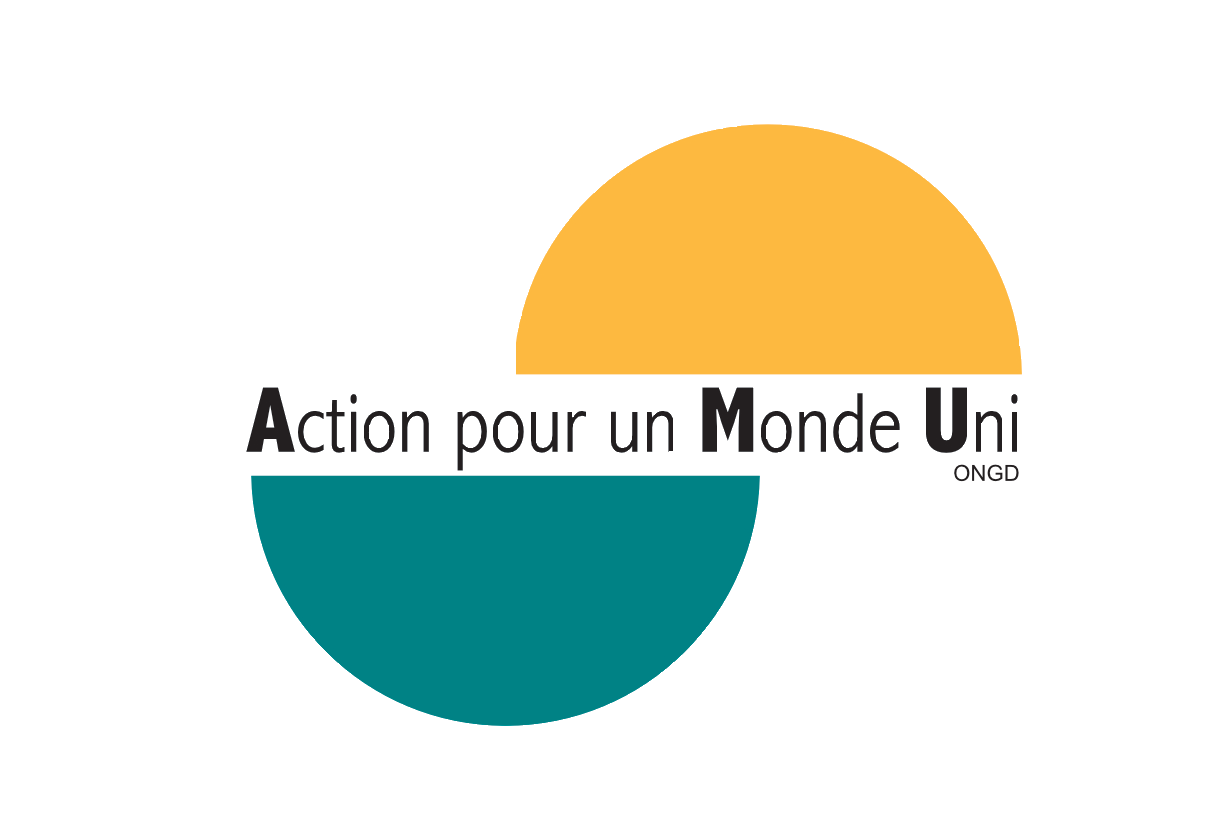Closed projects by country !
Central America




Total budget of the project: 381'663.20 €
Action Avenir Haiti asbl: 24'869.48 €
Action pour un Monde Uni: 22'380.00 €
Luxembourgish Government: 324'413.72 €.
Project carried out in cooperation with ACTION AVENIR HAITI asbl.
In 2010 Action Avenir Haïti asbl (AAH) bought the land with the building and fenced the site with a wall. The old house was partially demolished, however the frame and the roof sheets were still in good shape and were used to build temporary classrooms along the wall that borders the land on the right side.
In order to guarantee a minimum level of hygiene for the canteen, an annex (ground floor only) was built with the funds of AAH Luxembourg asbl. For the same reason, latrines have also been built.
Thanks to the installation of these temporary structures the school year 2010/2011 was able to be assured.
Today, 200 orphaned, single-parent or otherwise vulnerable children have the chance to attend this school free of charge and can learn to read and write. Each child also has the right to a hot meal a day, served at school, and is provided with the necessary equipment and school uniform to attend classes.
The nine teachers have a work contract and are covered by health insurance.
AAH Luxembourg also pays an administrative director, a pedagogical advisor, cooks and a watchman. The running costs of the school amount to EUR 3,000 per month and are covered by donors from Luxembourg.
Construction of a new structure:
Safety as an important criteria in the choice of the construction technique used , as well as feasibility within an agreed period of time, convinced us to build a wooden structure. A Luxemburgish company (Toitures Rollinger) offered us their cooperation and support. They offer prefabricated elements adapted to the weather and natural conditions of the country, as well as to the situation of assembly on site and to the transport limitations. They even suggested to train Haitian technicians beforehand in their company. In addition, they have offered to pay the salary and travel expenses for two of their technicians who installed the construction on site.
Beneficiaries:
200 children between 4 and 15 years old and their families. (School fees are paid through a sponsorship system). The teaching staff (nine teachers, one gardener's assistant, a pedagogical director, a technical director, a watchman, two cooks).
Local associations can take advantage of the meeting room. (Scout groups, youth groups, local craftsmen's association, football club)
The population of the zone Rivière Froide; about 400 families (Cybercafé / library)
2006-2007 Construction, furnishing and equipping of 2 classrooms, a kitchen for the canteen and the digging of a water well for the school of the Frères Unis in Zilma




Total budget of the project : 26'777.84 €
Action pour un Monde Uni : 8'925.95 €
Luxembourgish Government : 17'851.89 €
Local partner in Haiti: School of the Frères Unis de Zilma
History of the school of the Frères Unis of Zilma
In Zilma it all began in 1996 when members of the agricultural cooperative Frères Unis de Mont-Organisé, abbreviated to CAFUMO*, decided to help the "street children" of Zilma. The cooperative bought a plot of land to build a straw bower to accommodate the children. This school, initially called the "Ecole Frères Unis des Enfants Pauvres de Zilma", was founded on November 14, 1996 with, during the first two years, a literacy class of 44 children.
It was in 2000 that a building made of round wooden sticks and a tin roof with 4 classrooms was built. This construction was financed thanks to the support of the “Immaculate Conception Church” (Rev. Father Harry Clacke) from Toronto and a 25% participation by the parents of the students who are all members of the cooperative. However, it should be noted that these wooden stick constructions cannot be considered as permanent constructions. They cannot withstand the bad weather, which is quite strong in this region.
AMU's project was carried out in Zilma, a village lost towards the border with the Dominican Republic and without access roads. The houses are simple huts made of wood or tin, scattered all over the place.
Through this project, the school in Zilma was extended by two classrooms and a fully equipped kitchen. In addition, a drinking water supply was ensured by the installation of a rainwater collection system. The digging of a well, initially planned, could not be carried out due to the increased costs, which exceeded the available budget.
The hygienic conditions of the school could nevertheless be improved so that, as a result of this project, the World Food Programme (WFP.) provides food and nutrition for the children of the school.
2008 Construction and equipment of two classrooms for the "Sainte Famille" school located in the suburbs of Mont-Organisé




Total budget of the project : 12'890.47 €
Contribution of the local partner : 214.84 €
Action pour un Monde Uni : 4'081.98 €
Luxembourgish Government: 8'593.64 €
Local partner in Haiti: Ecole des Frères Unis de Zilma
The population of the Mont-Organisé region stems largely from a wave of expulsions of Haitian families settled in the Dominican Republic in 1937.
These people had to leave everything. Since Mont-Organisé is close to the Dominican border many of these familes have settled there. They remained poor. According to the United Nations Human Development Index, Haiti ranks 150th out of 173 countries.
In 2002, according to a file published by UNESCO on the fight against poverty in Haiti, the proportion of illiterate people was 55%. The insufficient food supply, low purchasing power, and poor medical and educational supervision constitute a serious handicap to the country's socio-economic development.
In October 1998, La Sainte Famille school started with 80 students. The school consisted of 2 classrooms. Two teachers were teaching without being paid and the parents of the students participated in the running of the school with a contribution of 125 gourdes (+/- 3.12 dollars), to buy textbooks and chalk.
After 7 years of existence, in October 2005 and following the acquisition of the necessary land, 6 additional classrooms were built for the school "La Sainte Famille". Today the school has 359 pupils. Already four times pupils have taken part in the state examination with a pass rate of 81%. In order to reduce the number of pupils per class and to create a pleasant and hygienic environment, our project foresees the construction of 2 additional classrooms with locally manufactured furniture.
2010-2012 Development of the schools "Frères Unis de Zilma" and "La Sainte Famille" with a view to improving the educational and living conditions of the inhabitants of the municipality of Mont Organisé




Total budget of the project: 203'149.66 €
Action pour un Monde Uni: 67'716.55 €
Luxembourgish Government: 135'433.11 €
Local partner in Haiti: Ecole Frères Unis de Zilma
Since 2006, Action pour un Monde Uni has been working closely with its partner "Ecole Frères Unis de Zilma" in Mont Organisé, Haiti. Two projects were carried out together in 2006 and 2007. Even if these projects have brought improvements to the situation of the students, the learning conditions are far from being favorable. Through this project, we plan to offer a comprehensive education to the students of two schools.
Although these schools were not destroyed by the earthquake in January 2010, in this region, as in many rural areas, there is an increase in population by those leaving the areas devastated by the earthquake. It is this increase in population that gives even more importance and shows us the urgency of this project. During a meeting on June 15, 2009 with André Weis, our contact person for projects in Haiti, we agreed on a 3rd project with our local partner in Mont Organisé in Haiti. André Weis explained that a lot is still missing to be able to offer the children of the villages of the commune of Mont Organisé an adequate education.
Together with the partner we developed the following project:
Primary school and kindergarten "Sainte Famille"
- Construction of five classrooms
- Construction of a kitchen
- Installation of four toilets
- Furnishing of a room into a library and computer science center
- Provision of teaching materials
- Supply of playground equipment
- Drilling a well
- Installation of a fence
- Construction and equipment of three classrooms, a warehouse and an office for kindergarten education
Primary School "Frères Unis de Zilma"
- Construction of four classrooms
- Construction of a large community hall
- Three-bedroom construction
- Supply of computer equipment
- Drilling a well
- Installation of a fence
Following the ministerial agreement of December 2010, a first advance payment was made in February 2011. Work started in March 2011 and is progressing very well, as shown in the photos.
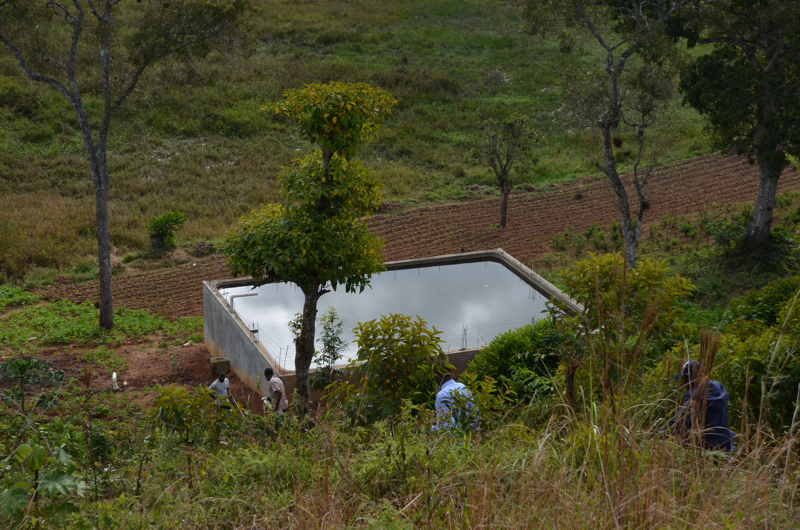
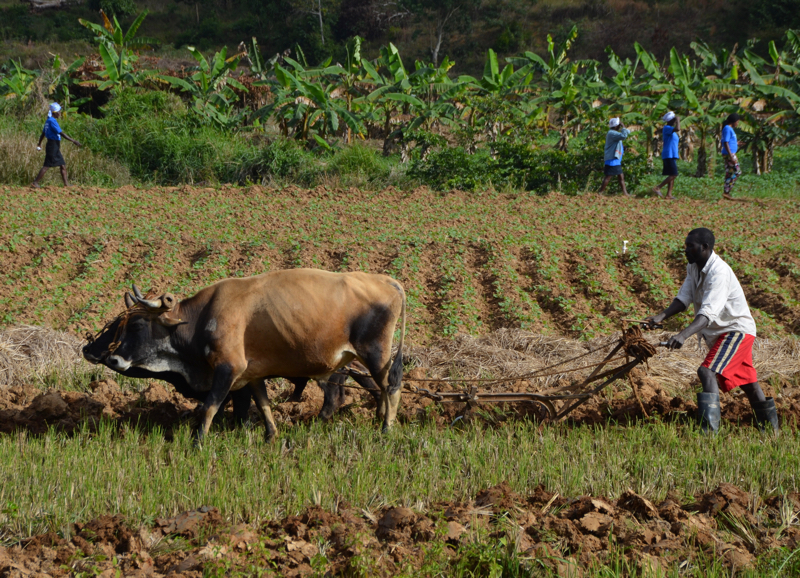
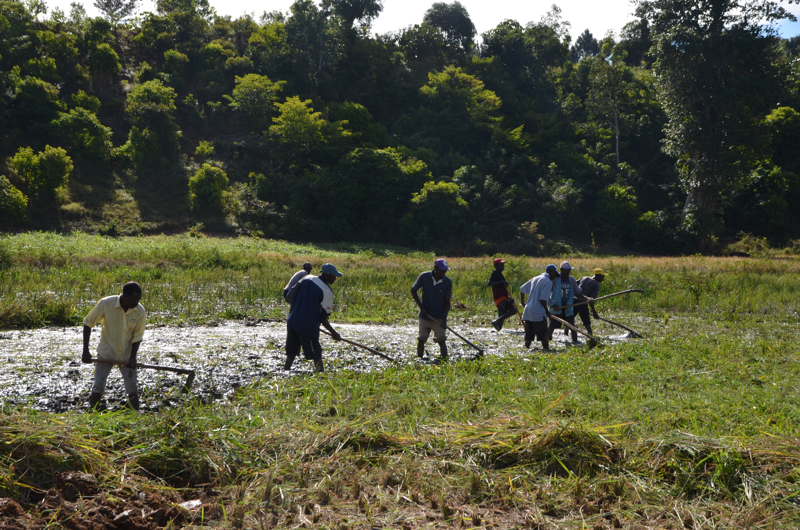

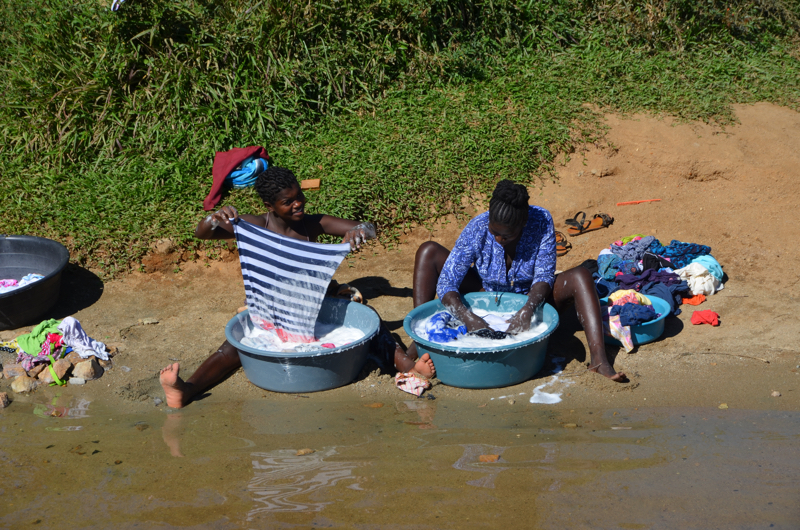
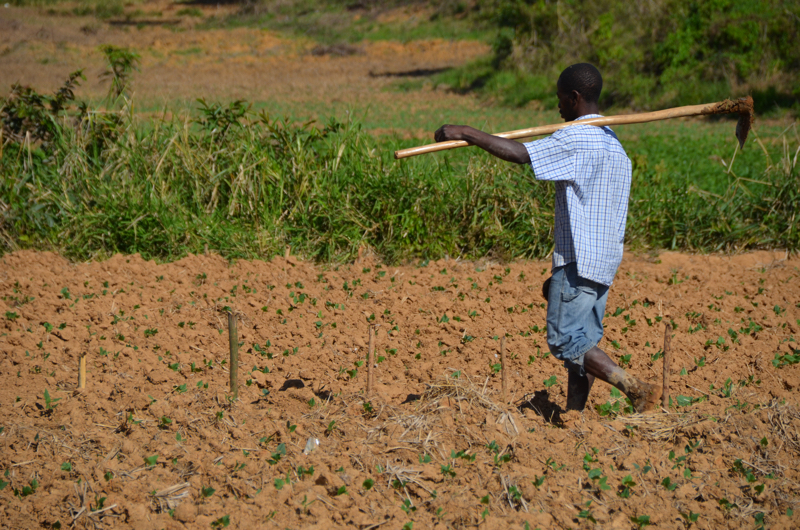
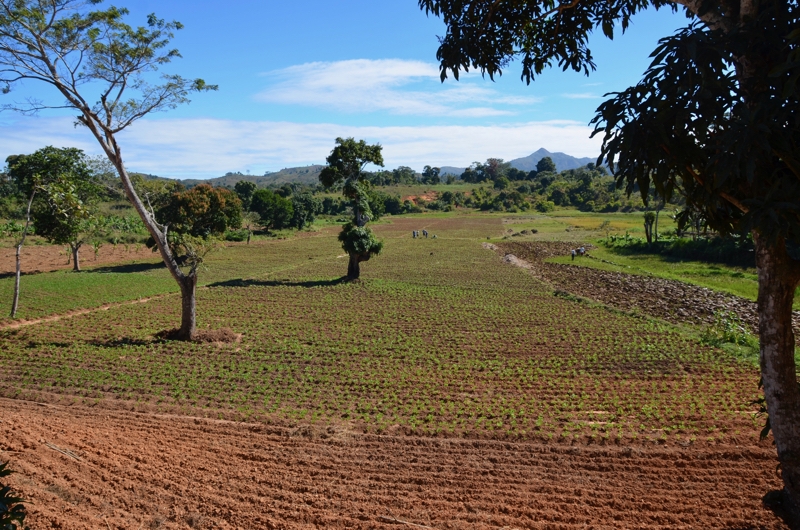
Location
The project is carried out in the municipality of Mont-Organisé, near the border with the Dominican Republic. The North-East department has about 280.000 inhabitants. It is subdivided into 4 districts: Fort Liberté, Ouanaminthe, Trou du Nord and Vallières. The district of Ouanaminthe regroups 3 municipalities, including Mont -Organisé.
Current situation
Haiti is a country living primarily from agriculture. However, even on fertile farmland farmers encounter difficulties in improving their yields. They often lack adequate farming techniques, means to develop their land, and trainings on how to improve their work.
Some numbers
In Haiti only 60% of the population receives a meal a day. Today, Haiti must invest 80% (326 Million USD) of its export revenue to re-import food: 50% of its consumption of dairy products, 75-85% of its cereals and almost 100% of its sugar and oils. In addition, more than 1 million Haitians have left their land and their country to seek a better future in the Dominican Republic.
a) Training of 150 local farmers in the cultivation of vegetable and cereal crops.
b) Training of "Technical Facilitators" to transfer knowledge to farmers in other communities.
c) Use of appropriate techniques, such as irrigation, to increase agricultural production by up to 30%.
d) Creation of a cooperative to sell products at the regional level.
229'319.29 EUR : Budget allocated to the project
152'879.53 EUR : Contribution of the Luxembourgish Government
61'439.76 EUR : Contribution of Action pour un Monde Uni asbl
15'000.00 EUR : Local contribution
Local partner in Haiti: PACNE
Co-financed by the Luxembourgish Ministry according to the framework agreement signed between the Luxembourgish Ministry and the NGO Action pour un Monde Uni on 11.01.2018.







Location
The project is carried out in the municipality of Mont-Organisé, near the border with the Dominican Republic. The North-East department has about 280.000 inhabitants. It is subdivided into 4 districts: Fort Liberté, Ouanaminthe, Trou du Nord and Vallières. The district of Ouanaminthe regroups 3 municipalities, including Mont -Organisé.
Current situation
Haiti is a country living primarily from agriculture. However, even on fertile farmland farmers encounter difficulties in improving their yields. They often lack adequate farming techniques, means to develop their land, and trainings on how to improve their work.
Some numbers
In Haiti only 60% of the population receives a meal a day. Today, Haiti must invest 80% (326 Million USD) of its export revenue to re-import food: 50% of its consumption of dairy products, 75-85% of its cereals and almost 100% of its sugar and oils. In addition, more than 1 million Haitians have left their land and their country to seek a better future in the Dominican Republic.
a) Training of 150 local farmers in the cultivation of vegetable and cereal crops.
b) Training of "Technical Facilitators" to transfer knowledge to farmers in other communities.
c) Use of appropriate techniques, such as irrigation, to increase agricultural production by up to 30%.
d) Creation of a cooperative to sell products at the regional level.
229'319.29 EUR : Budget allocated to the project
152'879.53 EUR : Contribution of the Luxembourgish Government
61'439.76 EUR : Contribution of Action pour un Monde Uni asbl
15'000.00 EUR : Local contribution
Local partner in Haiti: PACNE
Co-financed by the Luxembourgish Ministry according to the framework agreement signed between the Luxembourgish Ministry and the NGO Action pour un Monde Uni on 11.01.2018.
South-America




Total budget of the project : 115'740.20 €
Action pour un Monde Uni : 38'580.70 €
Luxembourgish Government: 77'160.13 €
Local Partner: Nuevo Sol
The population of the "Villa Albertina" neighborhood has a high percentage of children and adolescents who spend most of their free time hanging out in the streets, exposed to problems such as drugs, prostitution, violence..., or facing the other accessible alternative: contemplating another world through television.
In this area there are no public squares and the large open spaces are full of rubbish. The economic and social reality in which these children and young people live keeps them from any re-creative alternative that needs purchasing power.
Description of the project
The "Esperando Sueños" center tries, besides sports activities, to offer greater support to families. There have been many information meetings over the last two years on the role of family support as well as the maternal and paternal role. The workshops on the theme "limits in the family" were among the most visited. Violence in sports and alternatives for resolving conflicts without violence is a topic often discussed in these meetings. In addition, the center has organized information workshops on specific health topics, such as drug prevention, good eating habits, etc. The center also tries to revive discussions with schools in the area in order to reintegrate adolescents who have dropped out of school into the educational system.
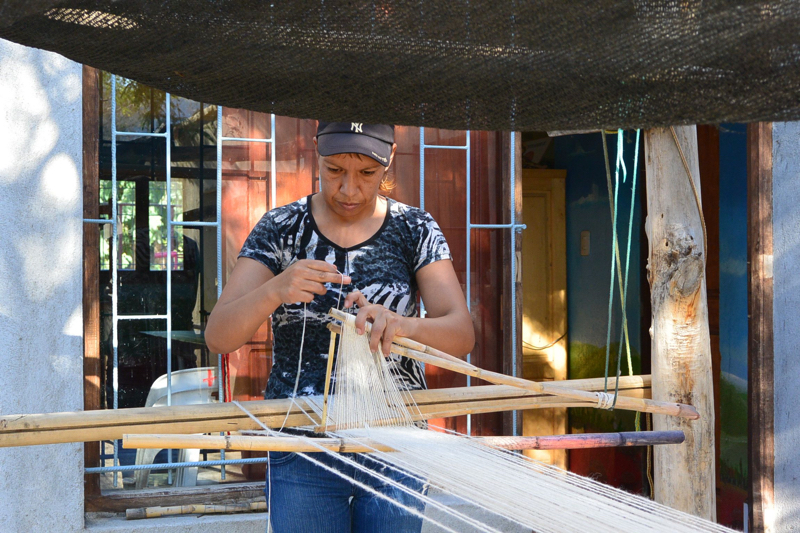
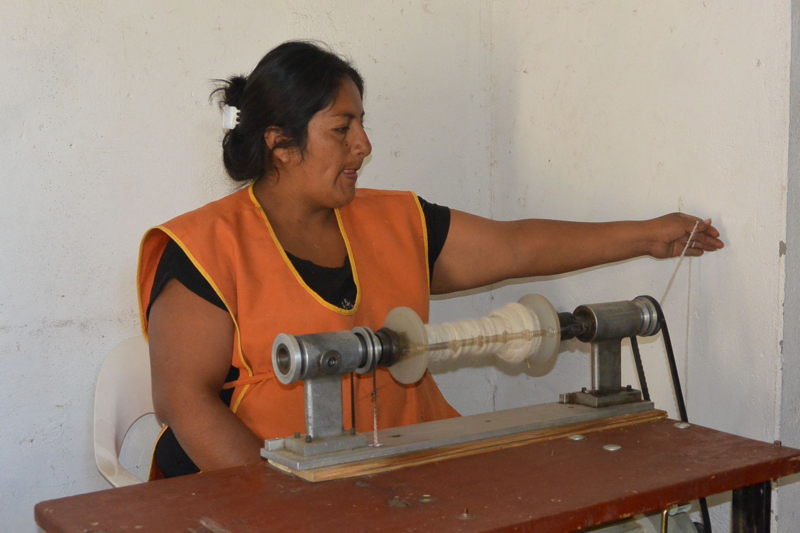
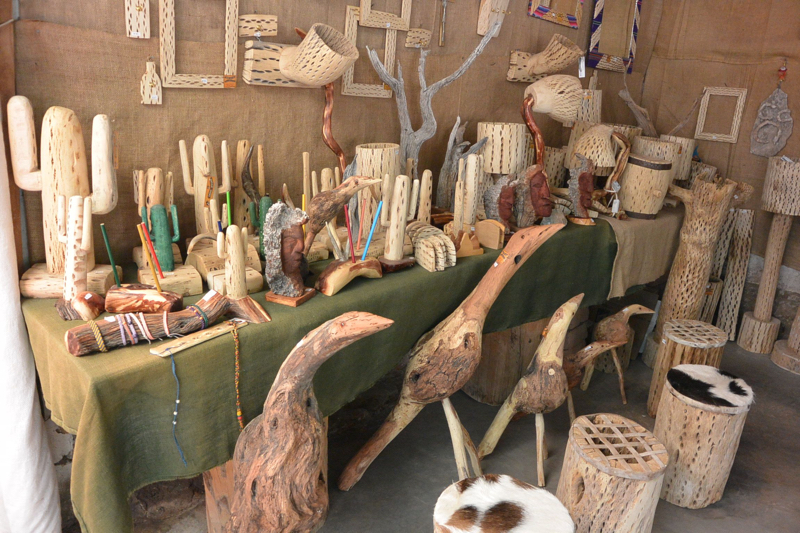
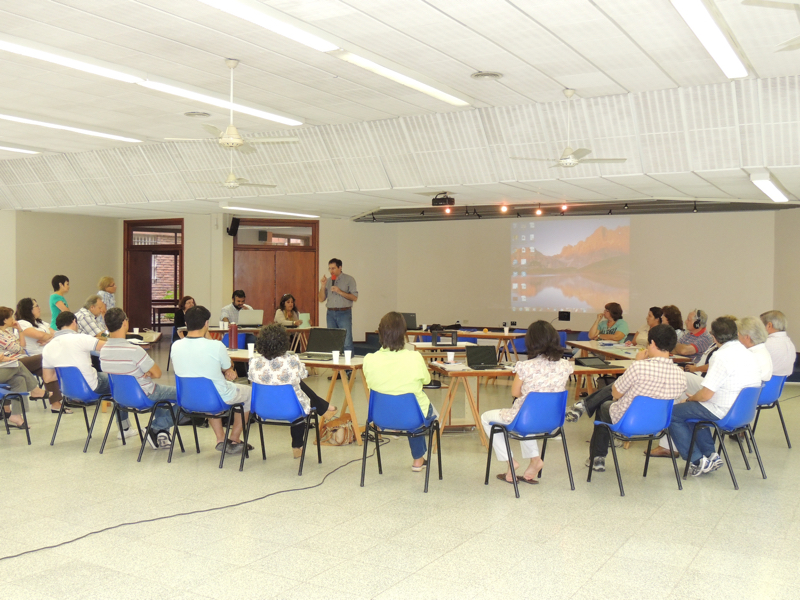
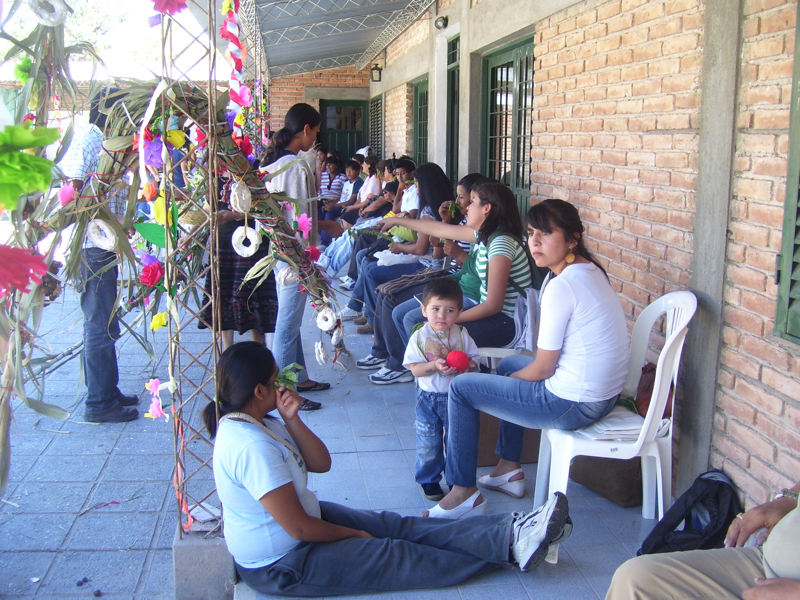
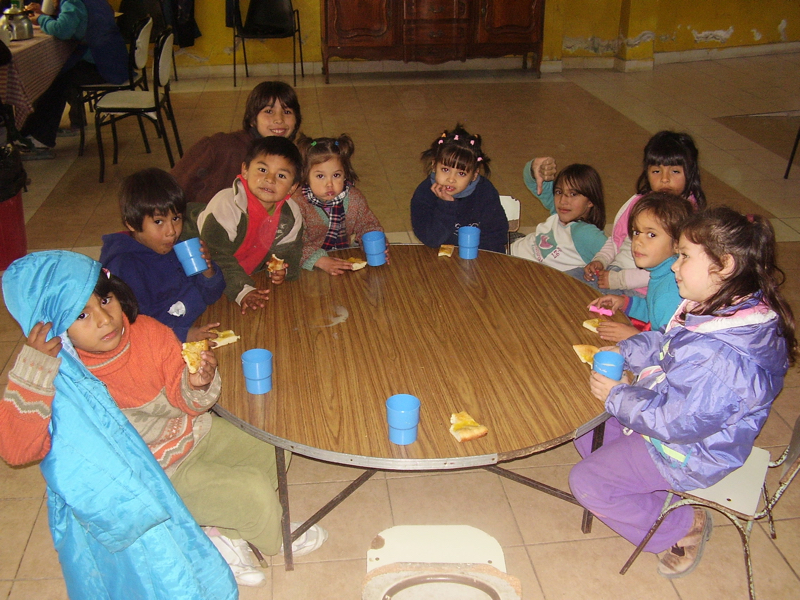
Description du projet
Ce projet prévoit de fournir un appui (formation) technique à 21 organisations latino-américaines dans 6 pays différents (Argentine, Pérou, Bolivie, Paraguay, Uruguay et Chili). L’ objectif est de renforcer les capacités professionnelles de ces organisations afin qu’elles puissent, à long terme, aborder et résoudre d’une manière durable les problèmes de la pauvreté persistante, de l’inégalité et de l’exclusion sociale dans leurs zones d’intervention.
Situation actuelle
- Près de 9 % de la population du sous-continent ne reçoit pas les calories quotidiennes nécessaires à une vie saine.
- La croissance des économies nationales n´a pas abouti à une diminution des conditions de vulnérabilité rencontrées par une partie importante de la population.
Les objectifs du projet
- Elaborer des propositions de projets avec chaque organisation afin d’ accéder à des fonds de financement.
- Se mettre en réseau avec d’autres partenaires et institutions.
- Définir leurs stratégies et améliorer les programmes de communication et de relations publiques.
- Améliorer le suivi et l’évaluation des projets en cours.
- Gérer mieux leur organisation au niveau organisationnel.
- Stabiliser leur situation financière.
Selon notre expérience
De nombreuses organisations travaillent dans des milieux pauvres et marginaux. Souvent, ces organisations ne disposent pas des ressources nécessaires pour former leur personnel par leurs propres moyens pour pouvoir faire face aux réalités et aux défis qui se présentent! Et, dans la plupart des cas, elles ne peuvent pas compter sur le soutien de l’Etat.
Description du projet (download FLYER)
Au Paraguay.....en faveur d'un quartier défavorisé
UNIPAR a fondé le quartier San Miguel de Capiatá pratiquement de zéro, pour aider de nombreuses familles dans leur espoir d´une vie meilleure. Actuellement, environ 70 familles vivent dans ce quartier. L’association a réussi à obtenir l´énergie électrique, l´eau, des logements, un centre médical et une école pour la communauté San Miguel. Dans d’autres villes, UNIPAR favorise le développement de petits projets visant à atteindre l’autonomie économique des familles.
Au Chili.....soutien à un groupe très vulnérable
« Proyecto El Castillo » est une ONG qui focalise tout son soutien sur un groupe très vulnérable de 45 familles de la région El Castillo, Quartier La Pintana, à Santiago de Chile. L’ objectif principal du travail de cette ONG est d´éviter la désertion scolaire en fournissant des vêtements, de la nourriture et du matériel scolaire. Des enfants et des jeunes sont parrainés dans un programme d’adoption à distance.
En Bolivie....pour un développement intégral
UNISOL a pour objectif de promouvoir le développement intégral des personnes défavorisées en Bolivie, à travers la création et le soutien de différents projets culturels, sociaux et économiques. L’organisation soutient plus de 150 enfants et jeunes à travers le pays dans les domaines de la santé et de l’éducation. UNISOL fonctionne à travers deux centres. Clara Luz (Santa Cruz de la Sierra) et Rincón de Luz (Cochabamba). Ce dernier établissement offre un appui scolaire à plus de 70 enfants et possède aussi un fonds qui soutient les efforts de petites entreprises dans la création de travaux respectant la dignité des personnes.
En Bolivie....en faveur de 91 familles à Cochabamba
L’ association Casa de los Niños accueille dans son centre plus de 400 enfants et adultes avec des besoins particuliers. L’association dispose également d’un centre éducatif appelée Arcoiris de Paz (Arc-en-ciel dem Paix), une boulangerie et une cuisine. Ses buts principaux sont les suivants: faciliter l’accès aux soins de santé pour des familles; réinsérer des personnes handicapées, des enfants malades ou abandonnés dans leurs familles; assurer le droit à l’éducation; prévenir l’abandon des enfants par des programmes de soutien à la famille.
En Argentine....soutien à des personnes handicapées
APADIS travaille avec des personnes handicapées et base son travail sur le modèle social des Droits de l’Homme. L’association a été créée pour contribuer à l’importance d’intégration de personnes handicapées dans le processus du travail, en particulier pour des personnes vivant dans des conditions d’extrême pauvreté. Aujourd’hui, l’ONG dispose d’un atelier qui offre des possibilités de travail pour les personnes handicapées, celles-ci sont accompagnées par des assistants professionnels.
En Argentine....en faveur des personnes migrantes
Le «Centre pour les migrants» est situé à Isidro Casanova (Quartier La Matanza, à l’ouest du Grand Buenos Aires). Sa mission est de fournir des soins complets pour des femmes migrantes en situation de vulnérabilité, provenant de l’étranger et des autres provinces argentines. Le centre vise la protection sociale maximale et le respect des droits humains fondamentaux.
En Argentine....au bénéfice des enfants démunis
Casita Estrella a été établie il y a 8 ans pour faire face aux besoins des enfants qui habitent dans l’ extrême pauvreté près du fleuve Paraná. L’ organisation offre plusieurs activités, comme le soutien scolaire et le sport. En outre, elle fournit aux enfants malades des soins dentaires, d’ orthophonie et de santé primaire. Elle encourage les enfants et leurs familles à montrer leur volonté et la responsabilité de poursuivre leurs rêves et construire leur avenir, en transmettant la fraternité, la tolérance et la solidarité. Les mères reçoivent un soutien spécial et peuvent participer à des ateliers d’artisanat et des cours de couture.
En Argentine....en faveur des cultures indigènes
L’Ecole Aurora est un centre d’études, avec plus de 20 années d’expérience dans l’enseignement des métiers traditionnels, reconnu par le Ministère de l’Éducation Provinciale de Catamarca. La mission est d’intégrer, surtout les femmes de Catamarca qui sont souvent victimes de la discrimination fondée sur le sexe, et d’aider à préserver leurs cultures ancestrales. Leur vision est que l’éducation est la clé pour renforcer l’identité et l’auto-estime des femmes. Dans ce but, ils proposent trois diplômes d’art: céramique, textile et métallurgie artistique.
208'003.09 EUR : Budget alloué au projet
138'668.73 EUR : Contribution du Gouvernement luxembourgeois
69'334.36 EUR : Contribution de l’Action pour un Monde Uni asbl
Partenaire local: Suma Fraternidad est un bureau de services techniques de SEFOMA, notre partenaire local en Argentine www.sumafraternidad.org
Cofinancement du Ministère de la Coopération luxembourgeoise selon Accord Cadre de Coopération signé entre le Ministère de la Coopération luxembourgeoise et l’ONG Action pour un Monde Uni en date du 08.06.2015
Current situation
From 2015 to 2018, AMU supported 21 different organizations throughout Latin America which are operating in the social sector. They received technical, organizational and financial trainings. The aim was to strengthen the organizations’ structures and professional capacities. Out of these 21 organizations, 9 were selected for a second project which aims to put the acquired knowledge into practice.
The current project supports 7 organizations in Argentina and 2 in Bolivia. Following the trainings which the organizations received during the first project, the 9 organizations are now being supported in the elaboration of project proposals, intended for national and international donors. The planned activities are:
- Training in management skills
- Support for the formulation of 9 project proposals which will be funded by AMU
- Support for the formulation of 6 additional project proposals that will be funded by other national or international donors
- Trainings in monitoring and evaluation of the projects
Organizations and projects supported
In Argentina:
1. Siluva (La Plata): Hydrotherapy activities for disabled people
2. Proarva / Escuela Aurora (Catamarca): Teaching of traditional crafts and marketing of these handcrafts
3. Por Igual Más (Córdoba): Lectures about the rights of disabled children in primary and secondary schools
4. Centro de Atención al Migrante (La Matanza): Training for community leaders on the protection of migrants' labor rights
5. Asociación Civil Nuevo Signos (Punta Alta): Workshops on the prevention of sexual abuse of children in 8 educational centers
6. Fundación Lucía (Tucumán): Educational inclusion through sports activities
7. Se Trata de nosotros (Salta): Workshops to prevent human trafficking and exploitation in schools
In Bolivia:
8. UNISOL (Santa Cruz): Systematization of the educational model and of the training of teachers
9. Casa de los Niños (Cochabamba): Improvement of the educational structures of the school Arcoris de Paz
Description of the project (download Flyer)
UNISOL aims to promote the integral development of disadvantaged people in Bolivia through the creation and support of different cultural, social and economic projects. The organization supports more than 150 children and young people throughout the country in the areas of health and education. UNISOL operates through two centers. Clara Luz (Santa Cruz de la Sierra) and Rincón de Luz (Cochabamba). The latter provides educational support to more than 70 children and also has a fund that supports the efforts of small businesses in the creation of work respecting the dignity of people.
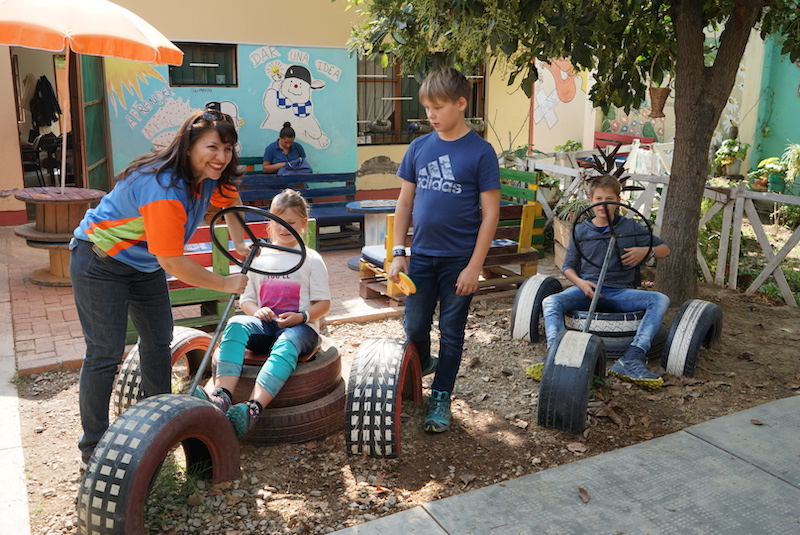
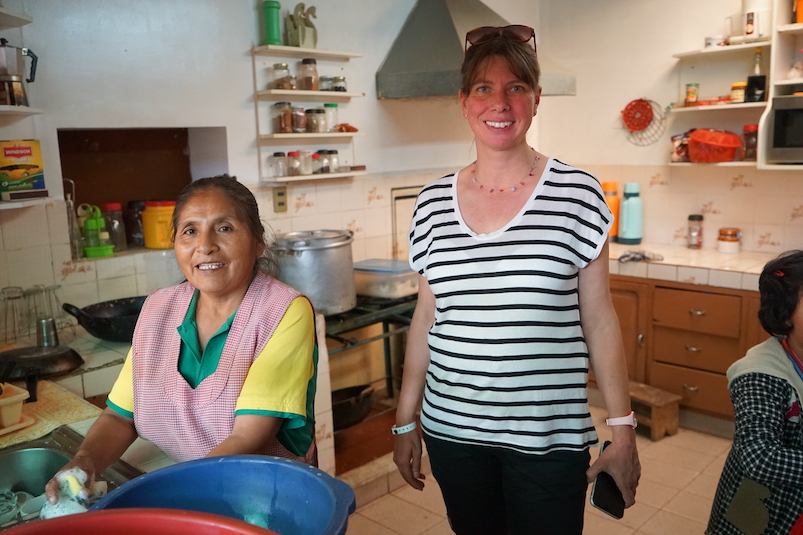
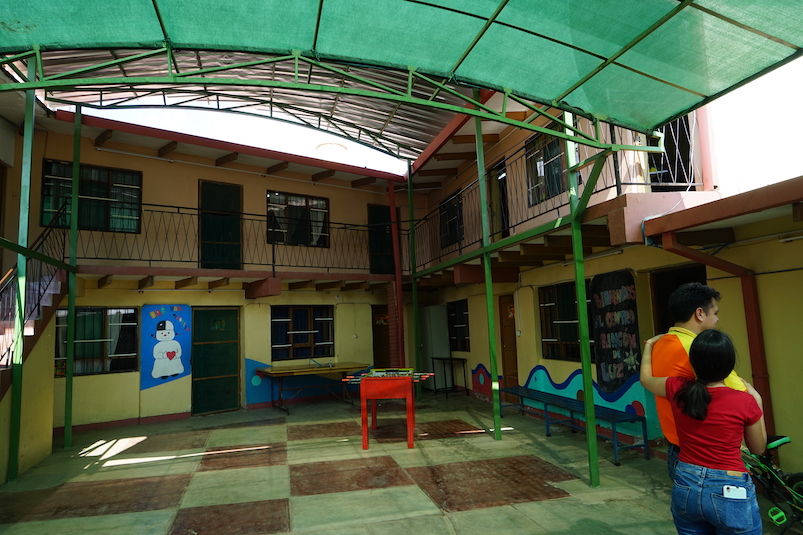
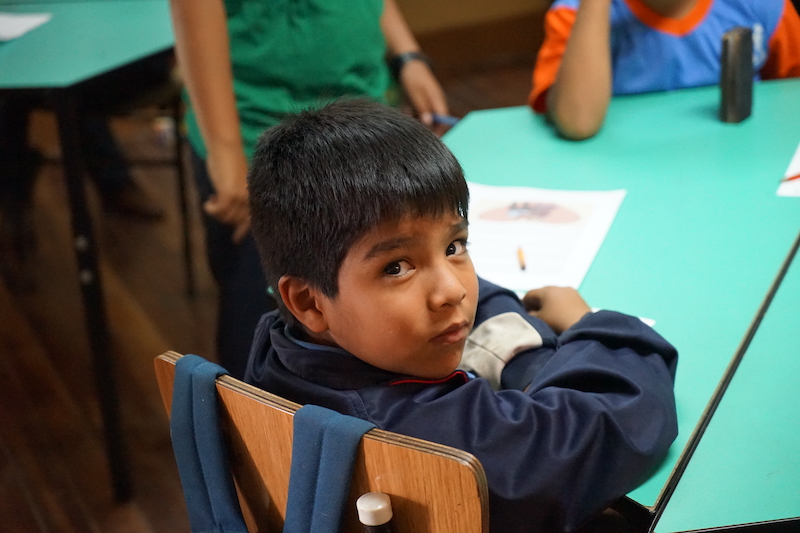
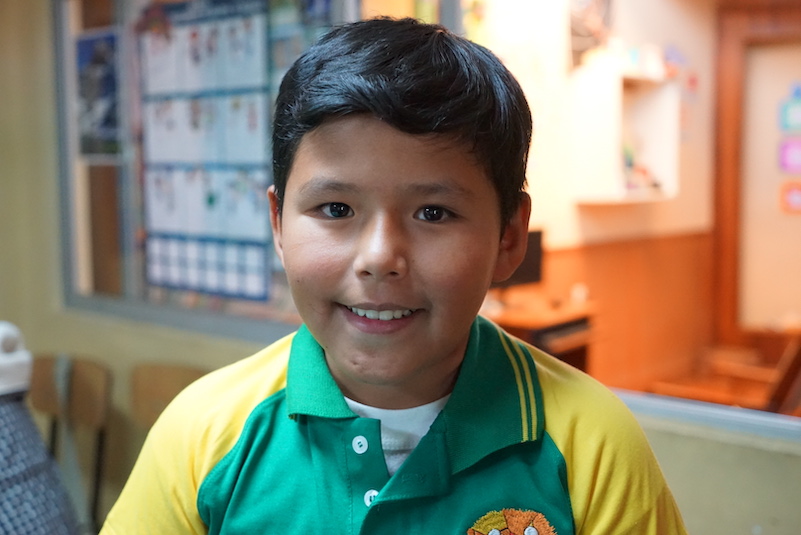
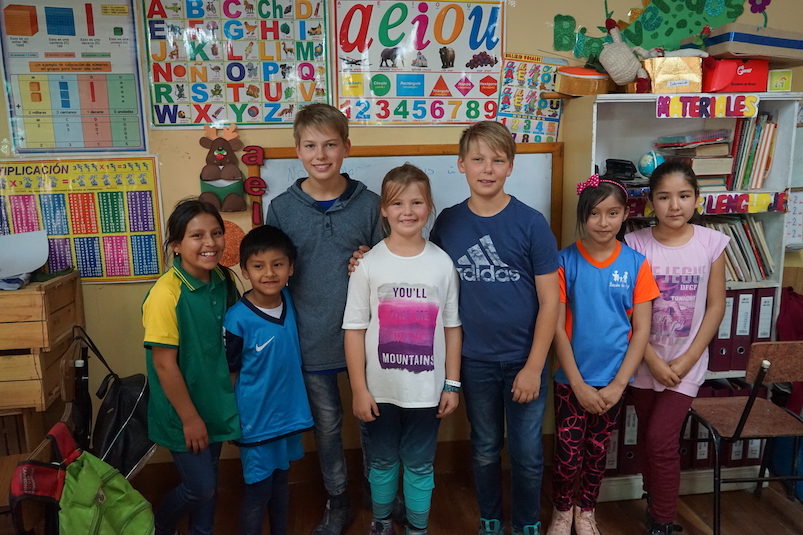
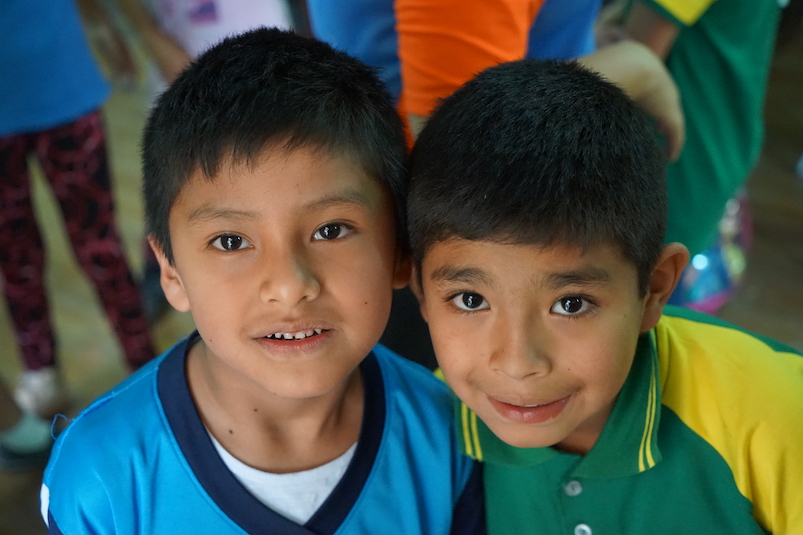
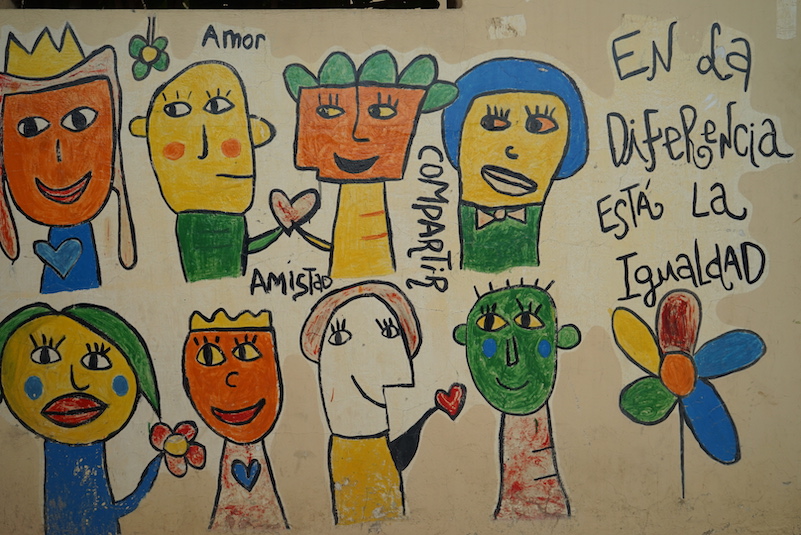
The association Casa de los Niños welcomes in its center more than 400 children and adults with special needs. The association also has an educational center called Arcoiris de Paz (Rainbow of Peace), a bakery and a kitchen. Its main aims are: to facilitate access to health care for families; to reintegrate disabled people, sick or abandoned children into their families; to ensure the right to education; to prevent the abandonment of children through family support programmes.
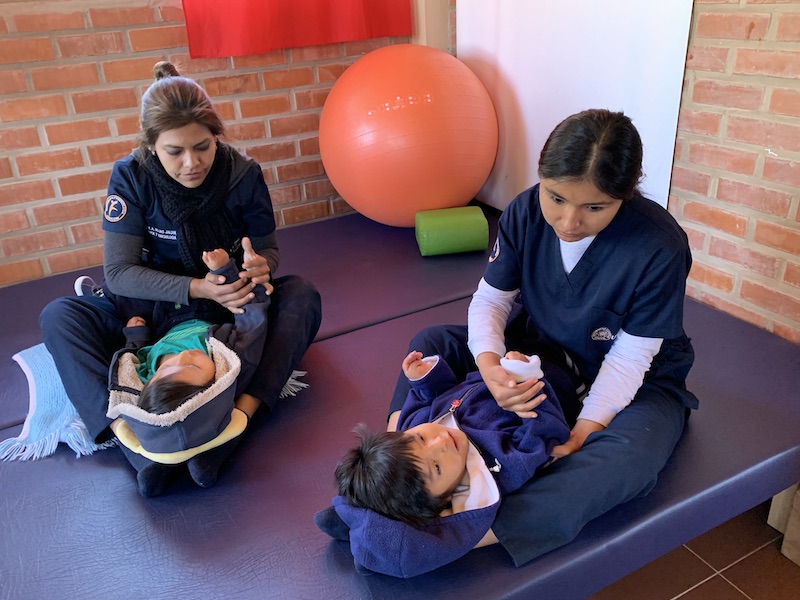
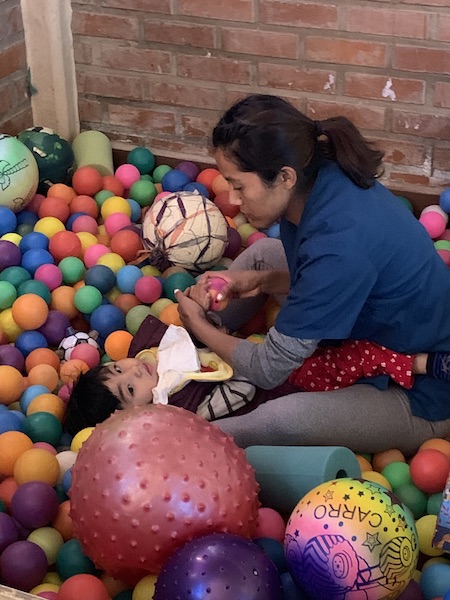
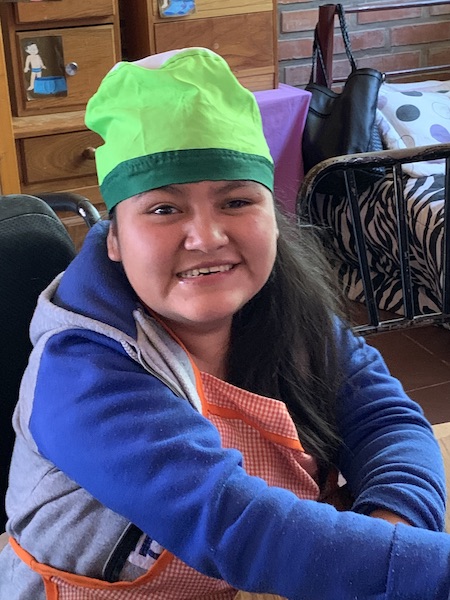
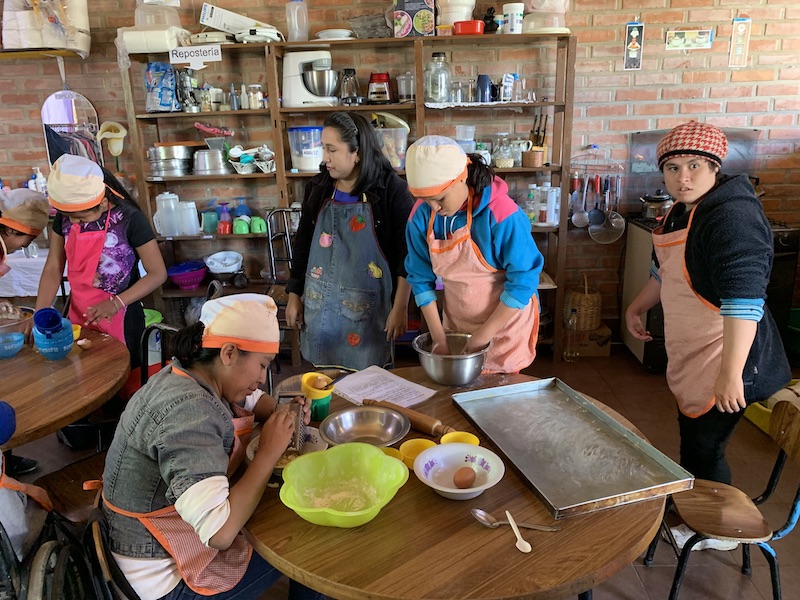
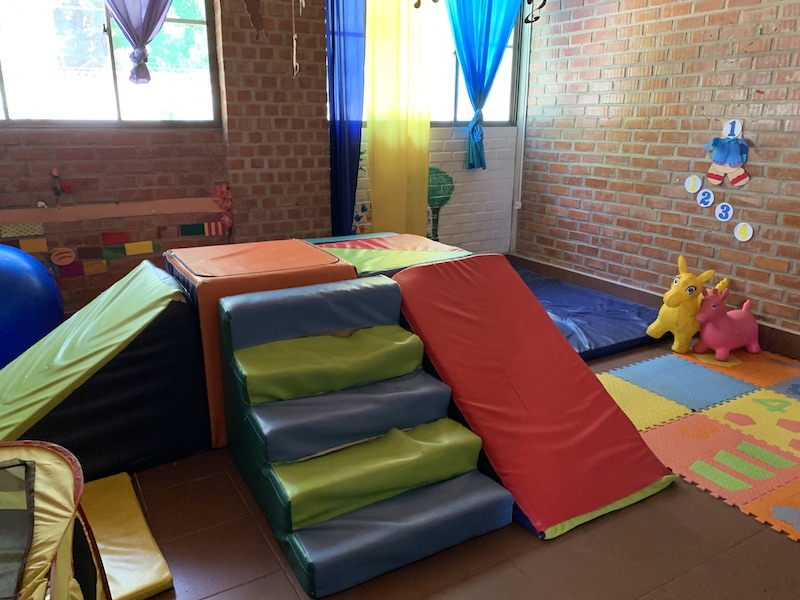

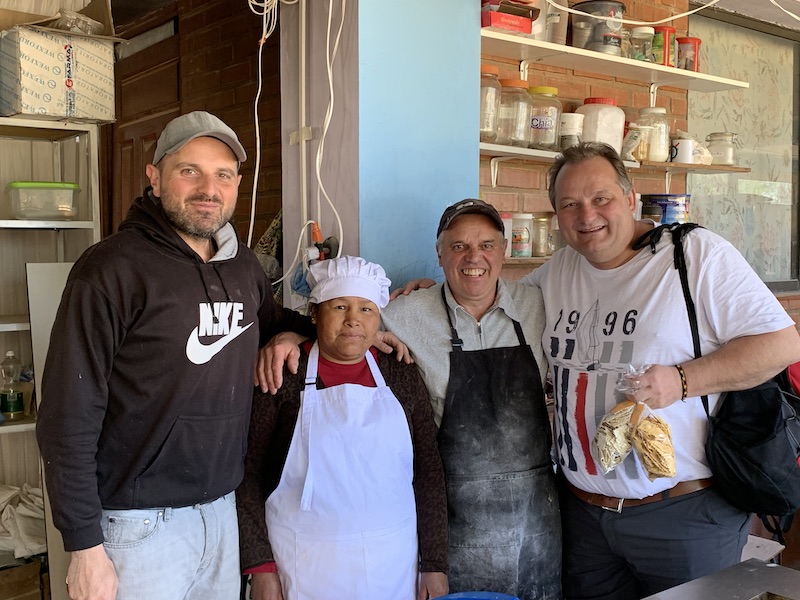

APADIS works with people with disabilities and bases its work on the social model of Human Rights. The association was created to contribute to the importance of integrating people with disabilities in the work process, especially for people living in conditions of extreme poverty. Today, the NGO has a workshop that offers work opportunities for people with disabilities, who are accompanied by professional assistants.
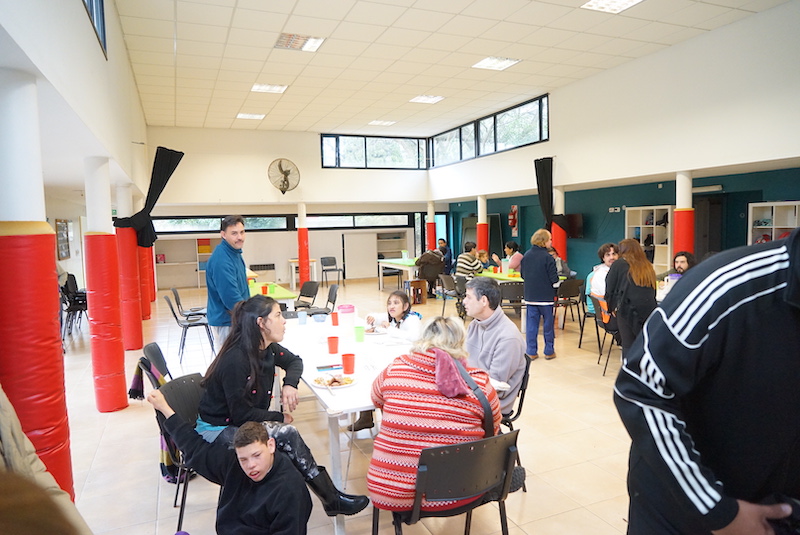
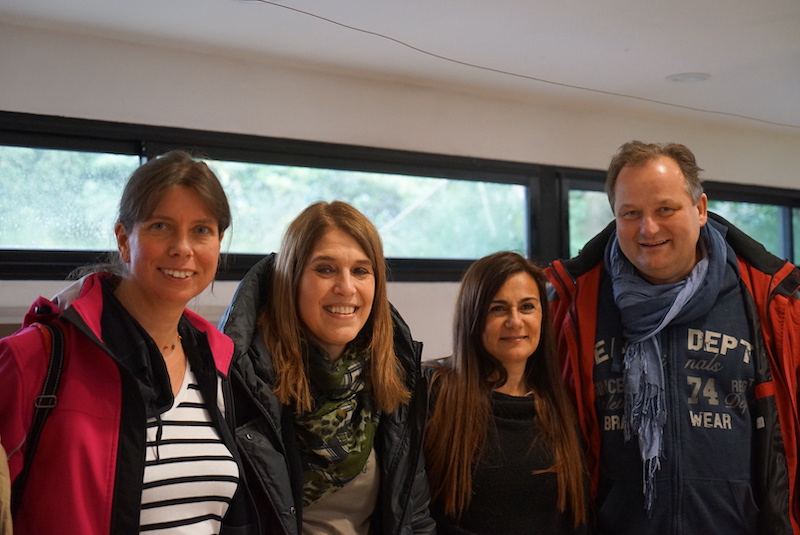
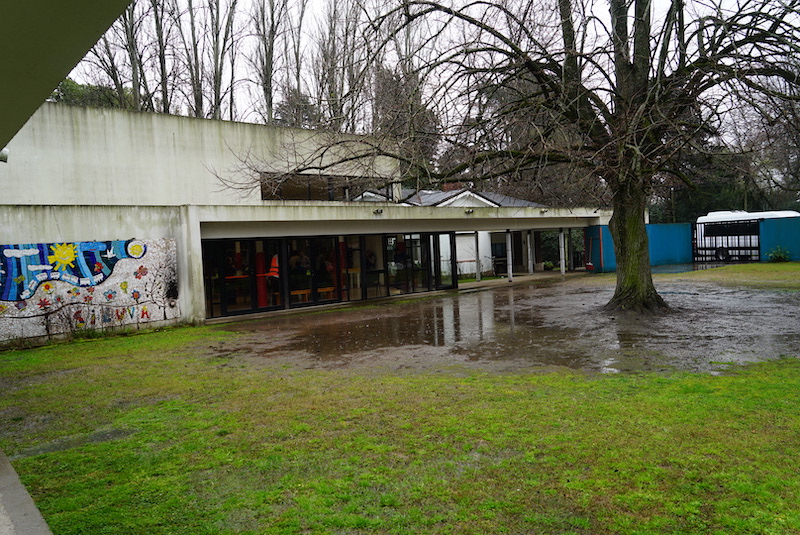
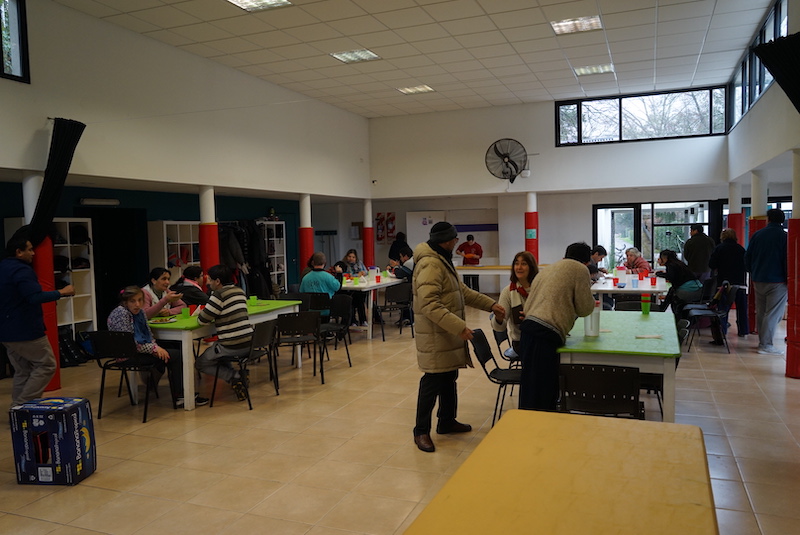
The "Center for Migrants" is located in Isidro Casanova (La Matanza neighbourhood, west of Buenos Aires). Its mission is to provide comprehensive care for migrant women in vulnerable situations, from abroad and from other Argentine provinces. The center aims at maximum social protection and respect for fundamental human rights.
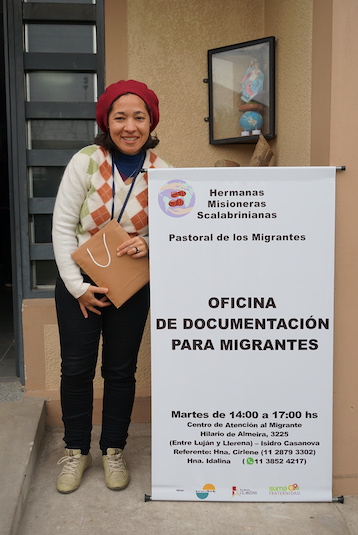
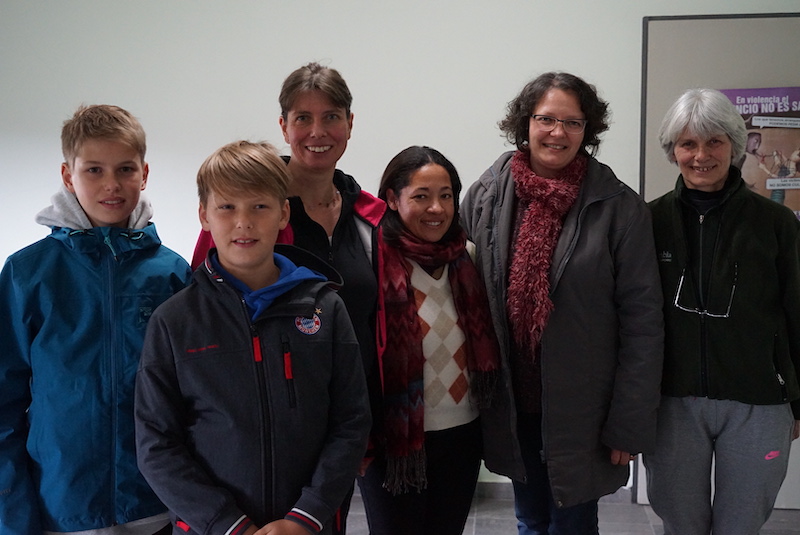
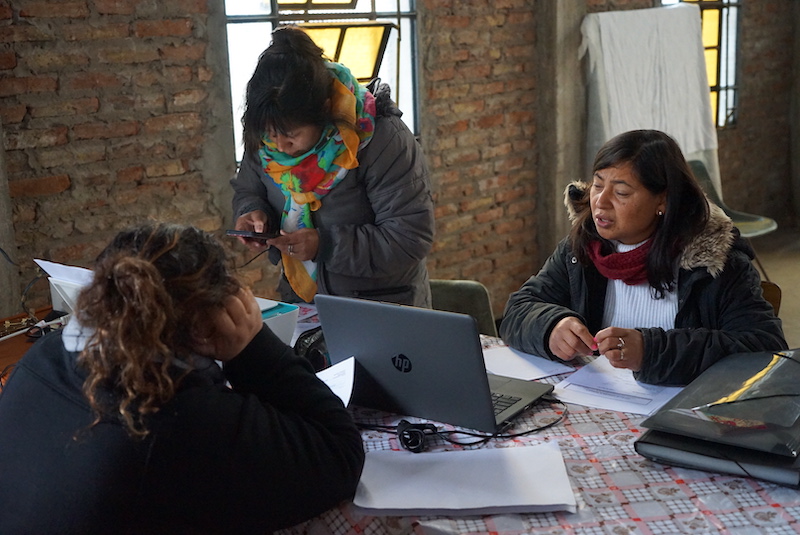
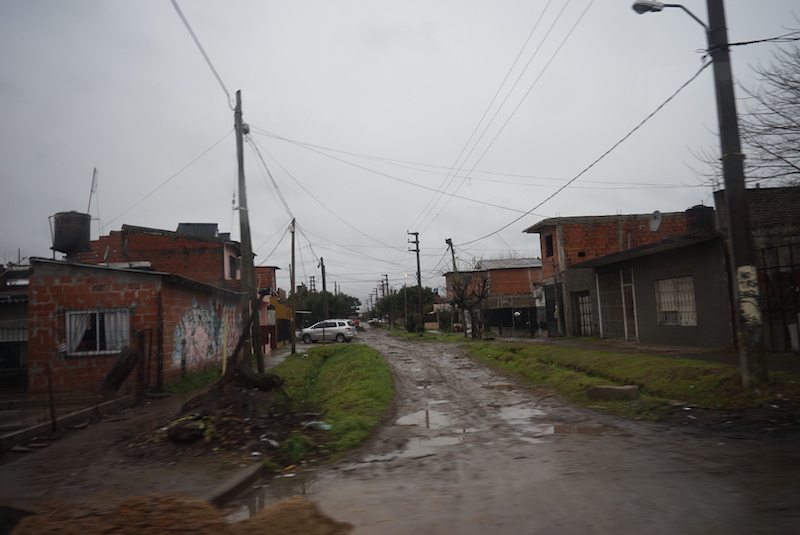
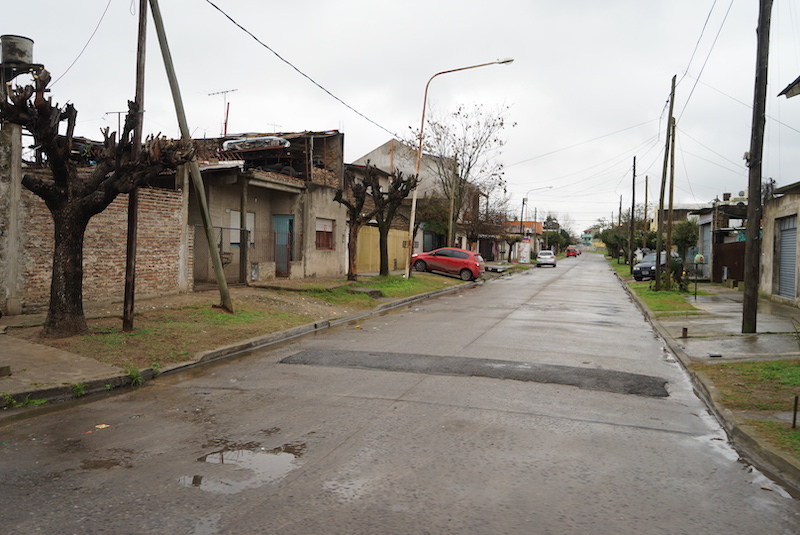
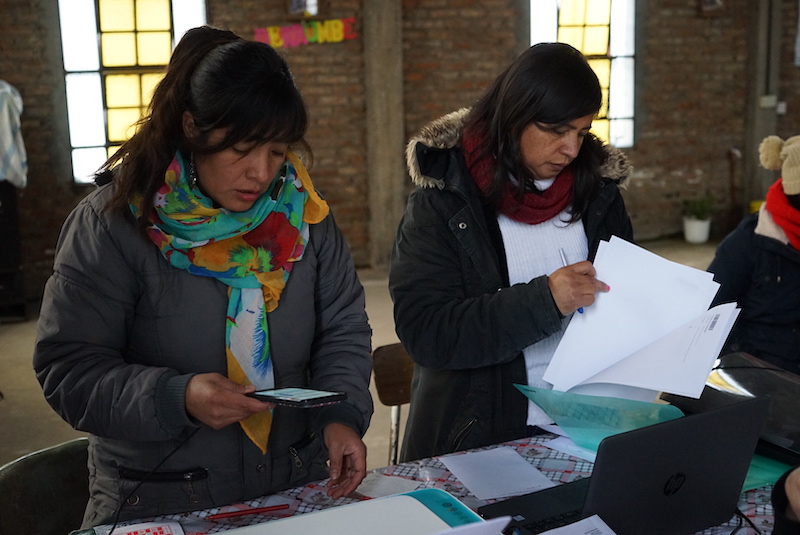
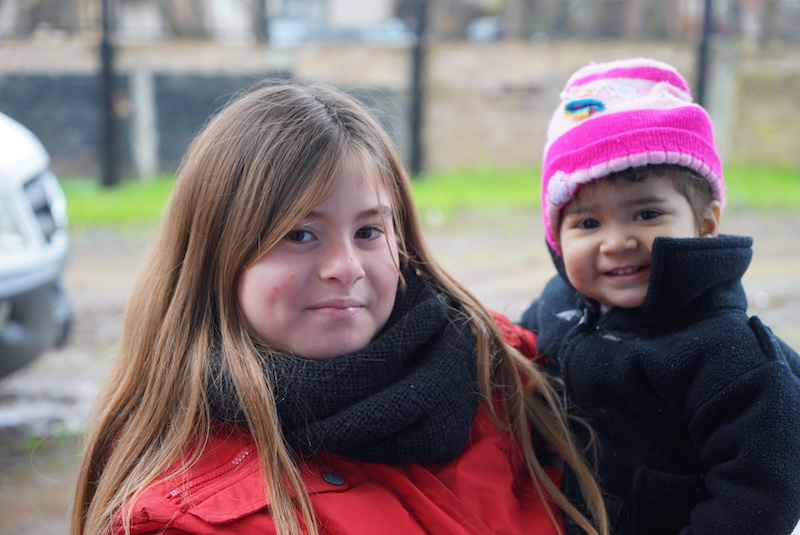
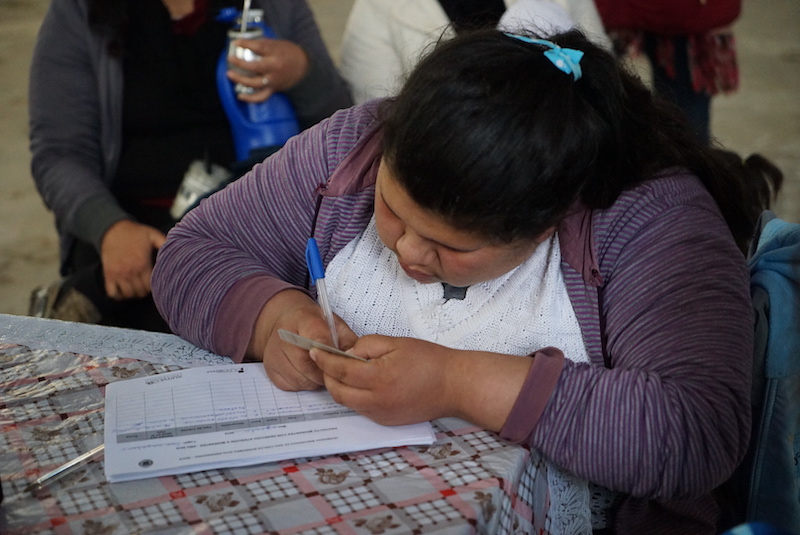
Casita Estrella was established eight years ago to address the needs of children living in extreme poverty near the Paraná River. The organization offers several activities, such as tutoring and sports. In addition, it provides sick children with dental care, speech therapy and primary health care. It encourages the children and their families to show their willingness and responsibility to pursue their dreams and build their future, transmitting brotherhood, tolerance and solidarity. Mothers receive special support and can participate in handicraft workshops and sewing classes.
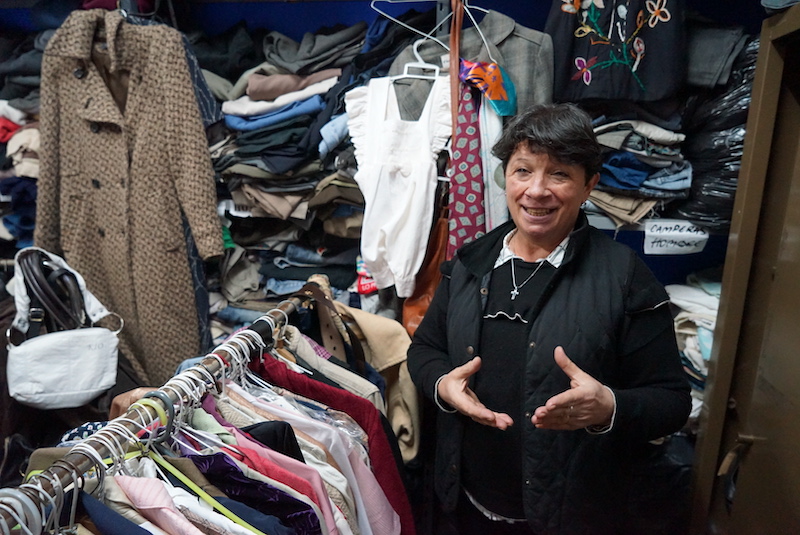
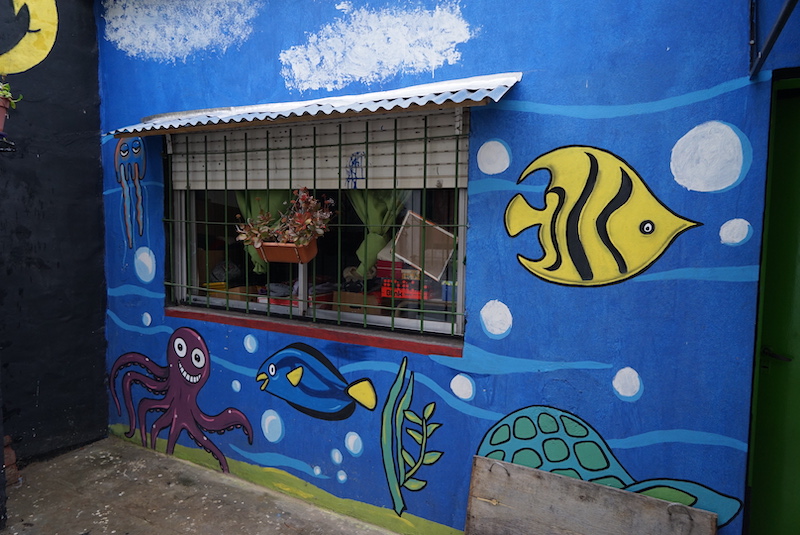

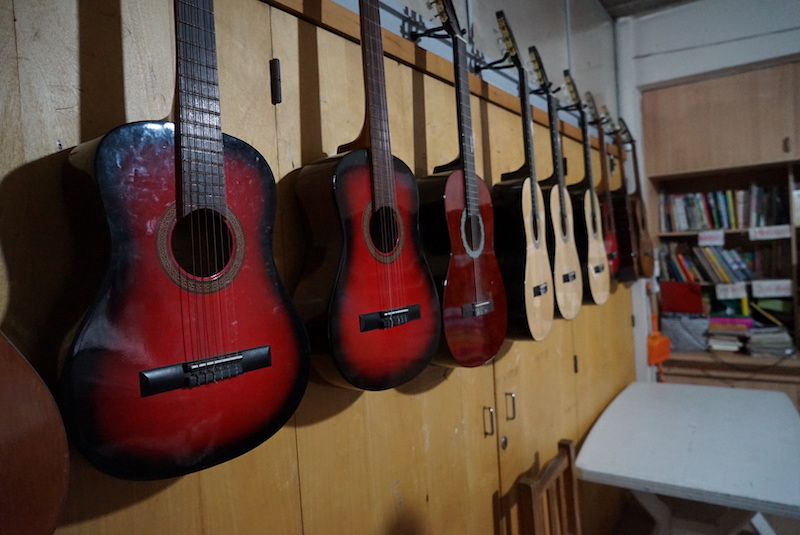
The Aurora School is a study center, with more than 20 years of experience in teaching traditional trades, recognised by the Provincial Ministry of Education of Catamarca. The mission is to integrate especially the women of Catamarca, who are often victims of gender discrimination, and to help preserve their ancestral cultures. Their vision is that education is the key to strengthening women's identity and self-esteem. To this end, they offer three art degrees: ceramics, textiles and artistic metallurgy.
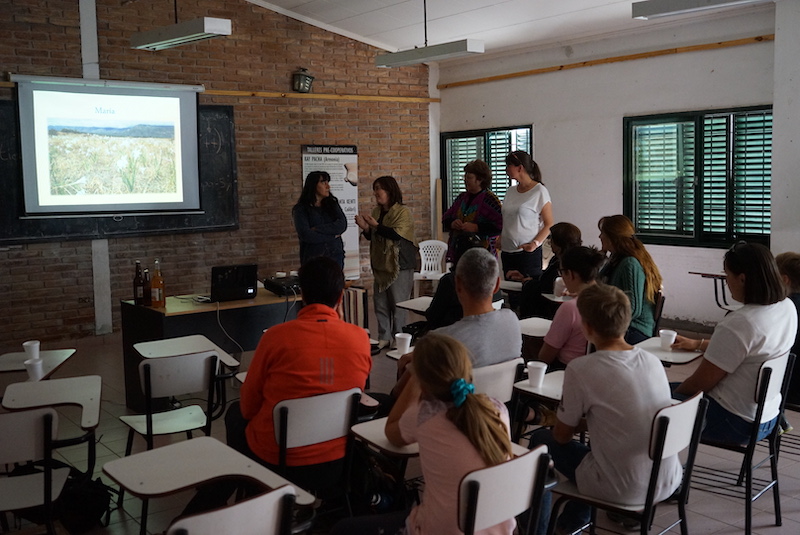
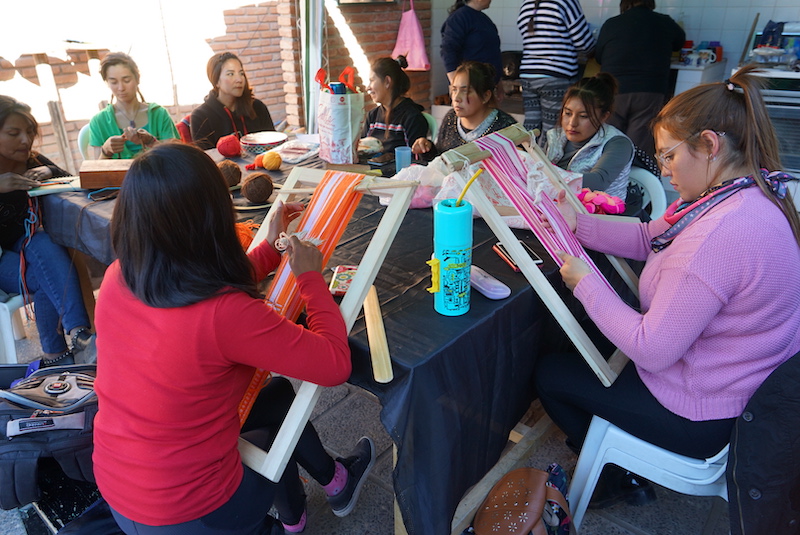

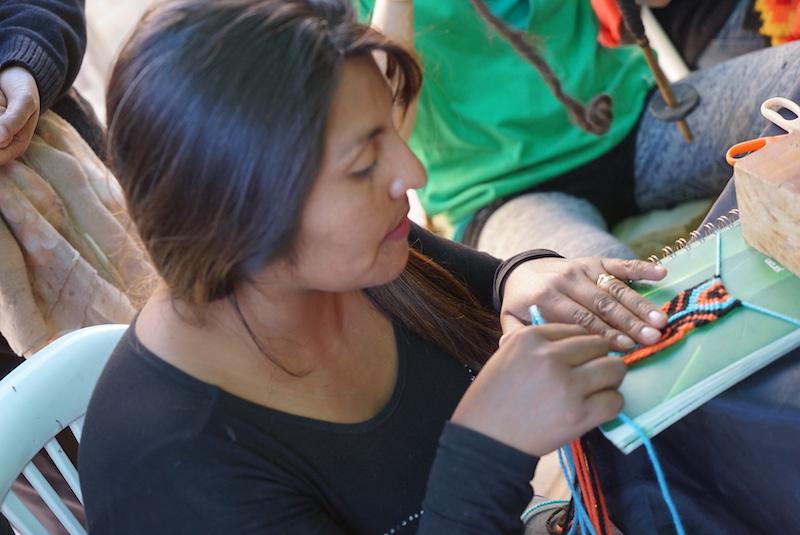

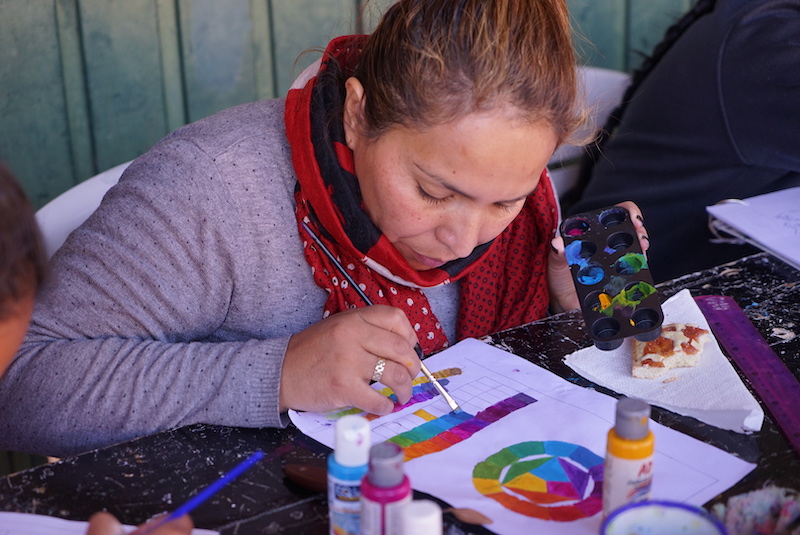
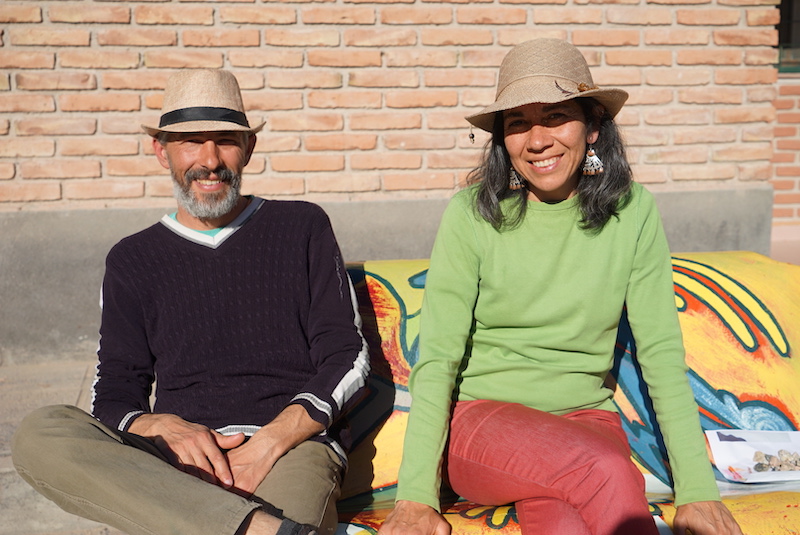
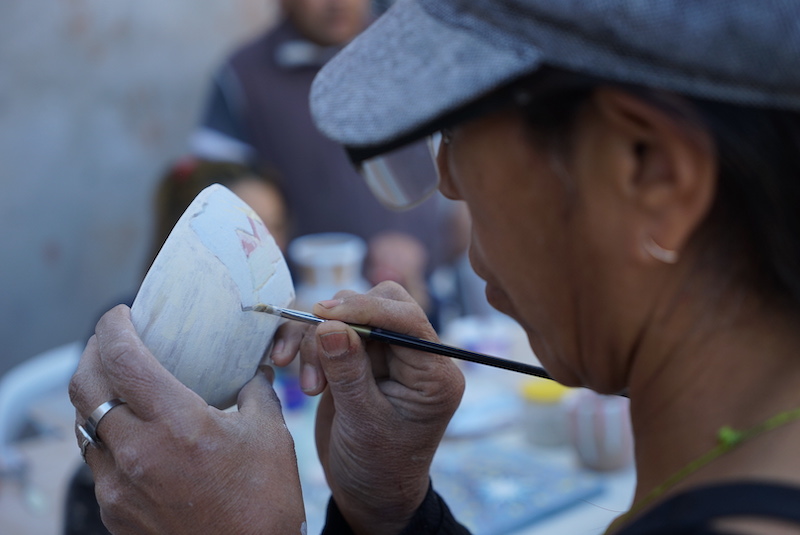
291'075.17 EUR: Budget allocated to the project
215'395.62 EUR: Contribution of the Luxembourgish Government
75'679.55 EUR: Contribution of Action pour un Monde Uni asbl :
Local partner in Argentina: Fundación Cláritas/Suma Fraternidad
Co-financed by the Luxembourgish Ministry according to the framework agreement signed between the Luxembourgish Ministry and the NGO Action pour un Monde Uni on 11.01.2018.
2007-2010 Creation of workshops for the manufacture and sale of handicrafts in the "Aurora" school in Santa Maria di Catamarca, Argentina








Total budget of the project: 183'509.33 €
Action pour un Monde Uni: 61'169.78 €
Luxembourgish Government: 122'339.55 €
Overall objective:
To contribute to the socio-economic development of the Catamarca region by increasing the space for teaching in the existing premises and creating workshops for weaving, ceramics and metalworking. To promote the social integration of young people and women by offering them training and employment opportunities.
Specific objective:
Many families living in rural areas close to the Andean Cordillera in the department of Santa Maria risk social marginalisation due to the process of globalisation. This project offers, through the creation of additional premises in the "Aurora" school in Santa Maria, young people the opportunity to train and learn a craft in the field of traditional handicrafts and thus preserve ancestral techniques. The "Aurora" school in Santa Maria is currently the first institution in Argentina and the second in Latin America to protect the ancestral culture which for many people represents a means of survival.

Current situation
From 2015 to 2018, AMU supported 21 different organizations throughout Latin America which are operating in the social sector. They received technical, organizational and financial trainings. The aim was to strengthen the organizations’ structures and professional capacities. Out of these 21 organizations, 9 were selected for a second project which aims to put the acquired knowledge into practice.
The current project supports 7 organizations in Argentina and 2 in Bolivia. Following the trainings which the organizations received during the first project, the 9 organizations are now being supported in the elaboration of project proposals, intended for national and international donors. The planned activities are:
- Training in management skills
- Support for the formulation of 9 project proposals which will be funded by AMU
- Support for the formulation of 6 additional project proposals that will be funded by other national or international donors
- Trainings in monitoring and evaluation of the projects
Organizations and projects supported
In Argentina:
1. Siluva (La Plata): Hydrotherapy activities for disabled people
2. Proarva / Escuela Aurora (Catamarca): Teaching of traditional crafts and marketing of these handcrafts
3. Por Igual Más (Córdoba): Lectures about the rights of disabled children in primary and secondary schools
4. Centro de Atención al Migrante (La Matanza): Training for community leaders on the protection of migrants' labor rights
5. Asociación Civil Nuevo Signos (Punta Alta): Workshops on the prevention of sexual abuse of children in 8 educational centers
6. Fundación Lucía (Tucumán): Educational inclusion through sports activities
7. Se Trata de nosotros (Salta): Workshops to prevent human trafficking and exploitation in schools
In Bolivia:
8. UNISOL (Santa Cruz): Systematization of the educational model and of the training of teachers
9. Casa de los Niños (Cochabamba): Improvement of the educational structures of the school Arcoris de Paz
Description of the project (download Flyer)
The beneficiaries of the project are the staff of the 9 supported organizations as well as the beneficiaries of the 9 projects that are carried out with the support of AMU. Further to the trainings received, the organizations will be able to carry out more professional projects in the future that will benefit a large number of people.
291'075.17 EUR: Budget allocated to the project
215'395.62 EUR: Contribution of the Luxembourgish Government
75'679.55 EUR: Contribution of Action pour un Monde Uni asbl :
Local partner in Argentina: Fundación Cláritas/Suma Fraternidad
Co-financed by the Luxembourgish Ministry according to the framework agreement signed between the Luxembourgish Ministry and the NGO Action pour un Monde Uni on 11.01.2018.
A testimony from Gianluca Scannapieco, Project Manager from "Casa de los Niños" in Cochabamba, Bolivia
Bolivia is currently suffering a political and health crisis that affects all social classes. It is obvious that the weakest are always the ones who suffer the most.
The health problem caused by Covid-19 has turned into political propaganda in view of the presidential elections scheduled for September 6, 2020. The various economic bonuses (of 500 Bs = 65 €) and some discounts in the payment of basic services (electricity, water, gas) have been unproductive, leaving the lower social classes (politically close to the political party of Evo Morales, still in exile in Argentina) in obvious economic and social difficulties.
The current transitional government has experienced cases of corruption and proves its inability to keep the country under a stable and effective policy. The city of Cochabamba has also suffered the loss of its mayor (still legally represented), also due to corruption. In the southern part of the city, there are currently demonstrations and blockades that prevent the passage of garbage trucks: the whole city of Cochabamba is full of rubbish in the streets.
Hospitals have never been equipped to deal with the Covid-19 crisis: the number of infected people continues to rise (we have exceeded 30,000 infected people), some patients die in the street or at home, there are mass graves in cemeteries and some health structures have closed due to lack of staff. Since June 29, 2020, we have again entered a very rigid quarantine that only allows the purchase of food on July 6 and 7. We are forced to close all institutions and suspend activities. There is no possibility to move in the streets.
The foundation "Asociación Casa de los Niños" is everyday involved in this "invisible war": we continue to bring children and people with serious illnesses from their homes to hospitals, even from very remote villages, every day. Every week, we travel hundreds of kilometres to deliver food and medicine to the southern part of Cochabamba and to villages in Andean communities. They call us to retrieve the bodies of the deceased (unfortunately many children with cancer and leukemia) from their rooms and to make arrangements for their burial or cremation.
Since March 12th we have had to suspend the activities of the community kitchen, the educational unit and the integral development zone that works with disabled children. The educators tried, at the risk of their lives, to carry out pedagogical activities when the quarantines were more flexible. At present, however, this is impossible for us, since our community does not have much access to the internet (I don't know how many photocopies of homework I have had to print these months to give to the students, house by house). Fortunately, we are supported by the community through our organization: families who do not have enough to eat ask for help from the community, which permanently manages a food deposit thanks to the contributions of other families and the donations that arrive.
There are people in our community with symptoms of the Covid-19 virus. In our school, especially in the dining room, we receive the sick and isolate them from the community.
We must resist for a few more months and pray that the damage caused by this critical event will not be irrecoverable.
I would like to take this opportunity to thank you very much for the support received from your institution. In the hope that you are all well, I thank you from the bottom of my heart for your constant concern for the children, young people and adults of the "Asociación Casa de los Niños".
Take care and see you soon!
Gianluca Scannapieco







2018-2021: Supporting farmer communities in Brazil through the strengthening of agro-ecological practices
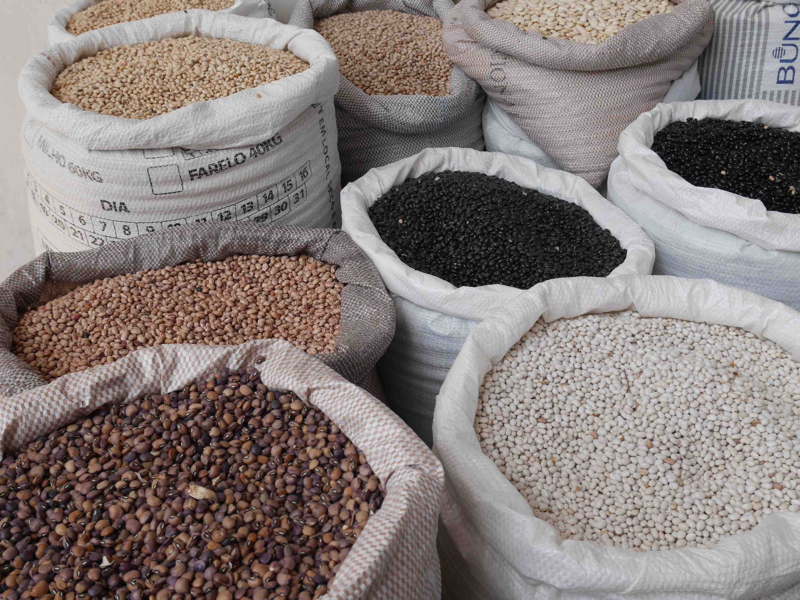
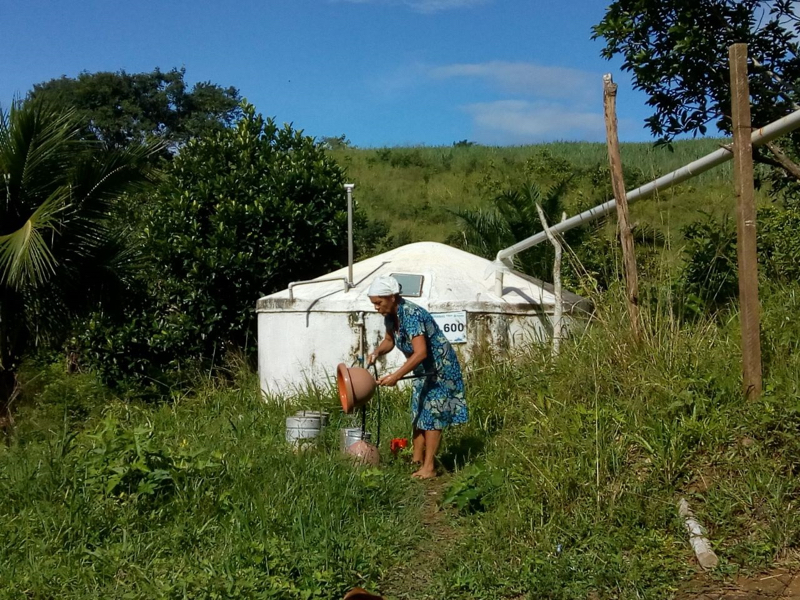
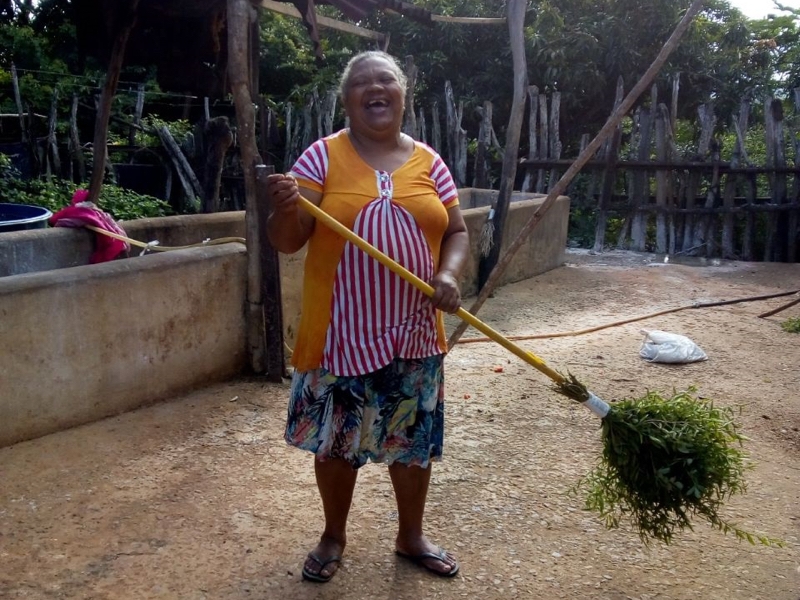
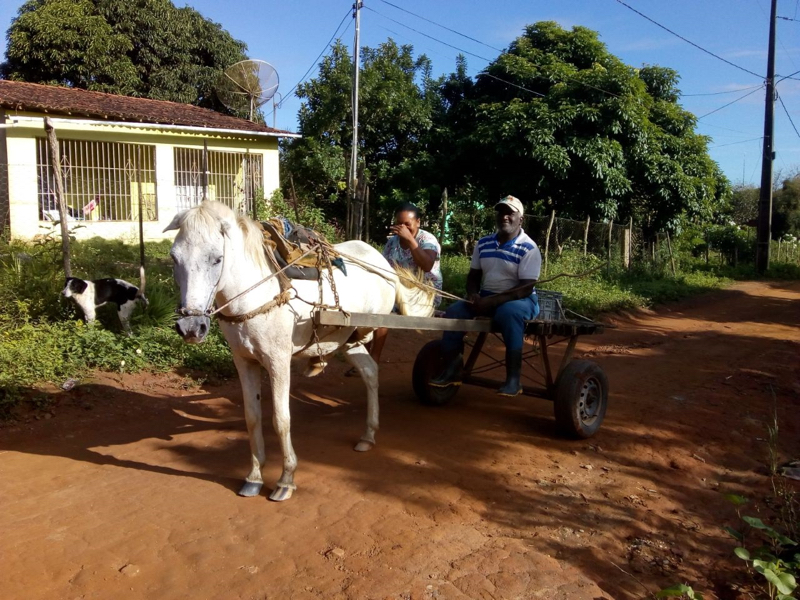
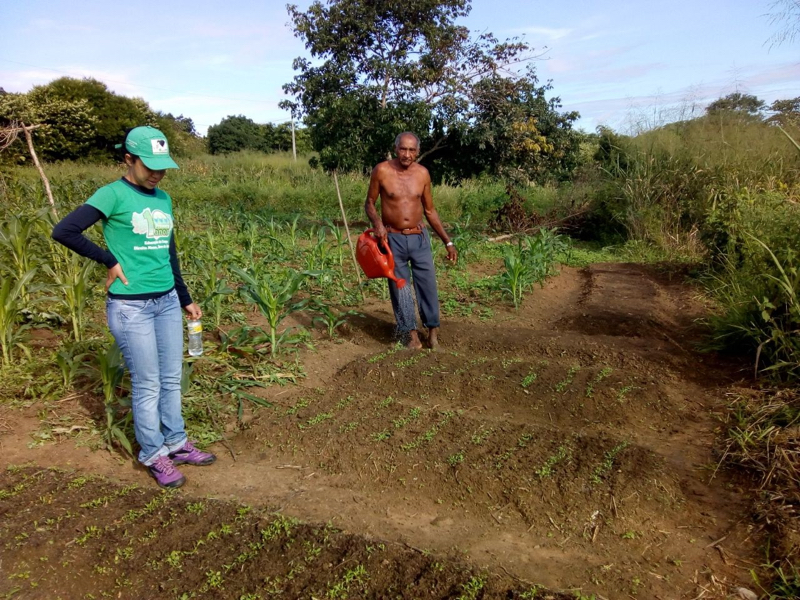
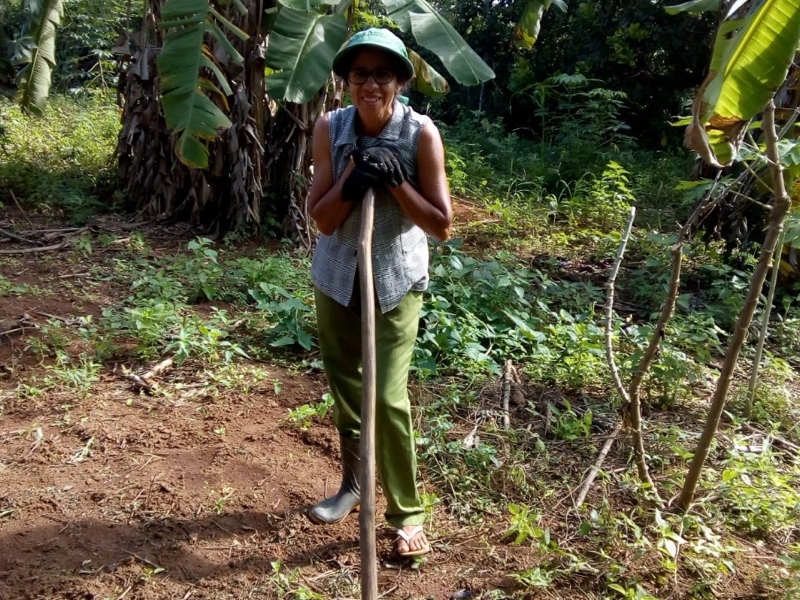
Location
The project is realized in the Mata Norte region in Pernambuco, near Recife, in northeastern Brazil. The state of Pernambuco has about 9 million inhabitants and has a surface similar to that of Portugal. During the colonization in the 17th century, Brazil was the world's largest sugar producer. The majority of this sugar was grown on the fertile lands of Pernambuco.
Current situation
Nowadays, the economic sector of the Mata Norte region is dominated by the production of sugar cane and of alcohol for "green petrol" engines. The majority of the land in the region is owned by large landowners. In recent years, agrarian conflicts and rural land liberation struggles have led to an agrarian reform.
On the one hand, farmer families have regained access to farmer land as a result of this agrarian reform. However, they are now facing challenges in satisfying their daily economic needs and in cultivating healthy and sustainable food. On the other hand, a lot of land remains in the hands of the large sugar cane factories that continue their monocultural exploitation of the land. This type of production involves the use of agrochemicals, environmental degradation and labor exploitation.
Objectives
To tackle this problem of a monocultural production mode, it is necessary to offer practical trainings to farmer families in order for them to learn methods of alternative farming. The aim is to increase the farmers' knowledge in an environmentally friendly and sustainable production. Brazil is currently considered the world’s largest consumer of agrochemicals.
Description du projet (download Flyer)
Project description (download Flyer)
The project aims to improve the quality of life of the farmer families by raising their awareness around the needs to change the productive system. The introduction of an environmentally friendly and sustainable agriculture will promote an ecological balance and a cultural diversification. A fundamental goal of this project is the transmission of the acquired knowledge to other families and especially to the next generation.
314'547.86 EUR : Budget allocated to the project
232'765.41 EUR : Contribution of the Luxembourgish Government
81'782.45 EUR : Contribution of l’Action pour un Monde Uni asbl
Local partner in Brazil: CPT- Comissão Pastoral da Terre
Co-financed by the Luxembourgish Ministry according to the framework agreement signed between the Luxembourgish Ministry and the NGO Action pour un Monde Uni on 11.01.2018.
30.10.2020 Plácido Junior and Renata Albuquerque, Pastoral Agent of the NE2 Pastoral Land Commission.
Brazil has been one of the countries most affected by the new coronavirus pandemic in the world. According to figures from the Ministry of Health, the country has over five million people infected and over 150,000 deaths from the disease, placing it in the fourth position of highest per capita contamination on the planet. Government measures to confront Covid-19 have unfortunately not helped to alleviate the damage to the health of the Brazilian population in the face of the pandemic. For four months - from June to September - the Ministry of Health was without a minister, which damaged the dialogue with society and revealed the contempt with which the issue of combating the coronavirus was treated by the government.
The impacts of the pandemic have worsened the economic and labor crisis in Brazil, mainly affecting the most impoverished working class. According to data from the Brazilian Institute of Geography and Statistics (IBGE), the unemployment rate reached 14.3% in August. Last year, the average unemployment rate in the country was 11.9%, according to data from the Institute. Instead of implementing measures to combat Brazil's social crisis, the Brazilian government announced a halving of emergency aid to the country's low-income population. The amount of the aid is now R$300 (US$300.00) per month, which is less than the value of a basic food basket that costs an average of R$400 (US$400.00), according to the Department of Statistics and Socioeconomic Studies (DIEESE).
Such measures aggravate the injustices and social inequalities that already exist in Brazil and reduce the population's purchasing capacity, even for basic and fundamental items of life, such as food. Families accompanied by the CPT say they already feel that less food from peasant agriculture is being purchased. Thus, they are facing the difficulty of selling all their products, leaving them with huge economic challenges. The cycle of inequality and impoverishment is thus gaining new momentum in the country.
To meet the challenge, some experiences gain prominence. Among them, there is international solidarity which allows us to purchase part of the food produced in the North Forest of Pernambuco, and to distribute it to low-income and street populations. This gesture has been made by the Luxembourg organization, a friend and partner of CPT, AMU - Action pour un Monde Uni. Some peasant families in the region have also resorted to the use of technology, commercializing their products through the internet, even with all the challenges and limitations of connection found in the rural area. Moreover, the practice of short circuit marketing gains even more strength in these times, with the sale or exchange of food between members of the same community or between neighboring communities. Gestures of solidarity, community organization and a lot of healthy food production are some of the ingredients that are helping farming families in Mata Norte to get through this pandemic.
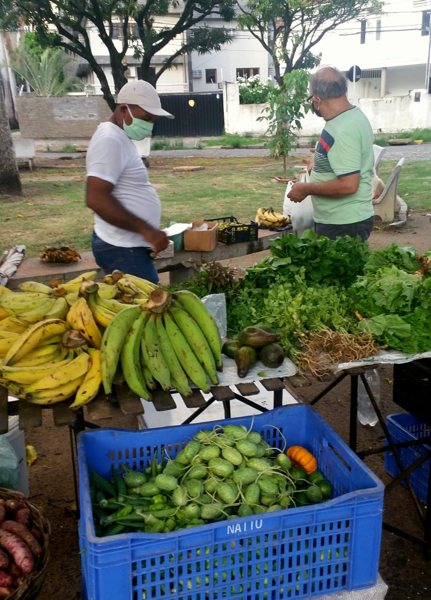
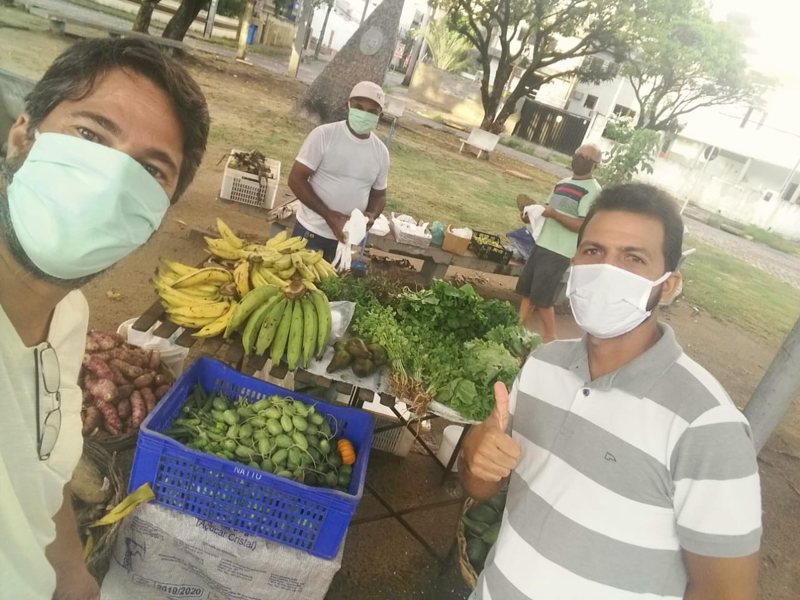




Total budget of the project: 436'864.88 €
Contribution of the local partner: 18'400.00 €
Action pour un Monde Uni: 120'166.52 €
Luxembourgish Government: 277'133.04 €
Overall objective:
To create more educational opportunities for children and young people in the Vargem Grande Paulista region.
Construction of a building for the "Aurora" Educational Center on a 121.000 m2 plot of land located in the Municipality of Vargem Grande Paulista, Commune of Cotia, State of Sao Paulo.
Specific objective:
To make available the necessary infrastructure from pre-school to primary and middle education through the construction of a building, which will be used as an Educational Center.
The building will:
- adapt classrooms to the national standards in force;
- improve the conditions in which education takes place, in application of the Decree-Law specifying the standards for the promotion, protection and recovery of health within the competence of the Brazilian Secretariat of State for Health;
- group together 13 classes of pupils dispersed in different rented private houses;
- increase the capacity and number of classrooms in order to be able to offer education to a larger number of pupils, a complete cycle of medium education and to avoid having young people travel more than 150 km.




Total budget of the project: 60'000 €
Action pour un Monde Uni: 20,000 €
Luxembourgish Government: 40'000 €
The school "Jardin Feliz", which operates with the authorization of the Ministry of Education, currently has 7 classrooms, 5 of which are for the first five years of primary education and 2 for kindergarten. The school has been in existence for nine years and currently employs seven teachers and four assistants (physical education, music, etc.) for a total of 176 children.
"Jardin Feliz" takes in children from low-income families who contribute only 40% to the school fees - mainly for food. The other 60% of the running costs are covered by the school through grants and donations as well as the sale of bakery and pastry items.
The aim of the project is to guarantee the children's integral growth by means of a complementary diet including breakfast and refreshments. This can only be done under hygienic conditions, which is why the construction of a refectory and a fully equipped kitchen is required.




Total budget of the project: 424'779.00 €
Local partner contribution: 104'167.00 €
Luxembourgish Government: 320'612.00 €
This project is financed by the Luxembourg Ministry of Finance, which has a programme to combat certain forms of crime.
Street girls and adolescents are minors between the ages of 7 and 18, who live and sleep on the streets of the city, have totally or partially broken ties with their families, are in a state of moral and material abandonment, are generally drug users (especially inhalants) and thus constitute a high-risk group.
In general they come from unstructured families, have been victims of physical abuse by their parents or parental figures, and face important economic problems and high indices of school dissertations. These are girls and adolescents who have "escaped" from their home of origin due to a series of circumstances. They tend to present the following personality characteristics: low tolerance of frustration, irritability, lack of self-control, distrust in front of others, problems with authority and exacerbation of sexuality and aggressiveness.
If these girls are not lifted out of marginality and receive timely help, the future of these girls, with their antisocial behavior, lack of schooling, lack of minimum rules of social coexistence, addiction to psychoactive substances such as inhalants ("terokal") and cocaine (PBC), early parenthood, sexual promiscuity, is uncertain as human beings.
The rehabilitation process for girls who use psychoactive substances requires multidisciplinary and consistent treatment. In this treatment needs to be included: food, shelter and clothing. The treatment provides group and individual psychological therapies as well as training and empowerment in workshops of two types: therapeutic and productive.
Currently the Institute "Mundo Libre" - Girls' House, carries out its activities in a rented building, located in the Jesús María neighborhood of Lima. It is an old house, whose surroundings have been adapted to develop the activities, but do not meet the optimal conditions for the development of the therapeutic community. In this room they receive up to 25 girls and adolescents.
The location of the workshops as well as the social welfare services (topical, psychological, social service, educators) were carried out considering the current layout of the house, which limits the adequate functioning of the same ones. The current house does not have green areas and sufficient and adequate entertainment for the population we work with, so we have to go to the parks to carry out physical activities like sports, which are far from our current premises.
The building is small and does not have adequate ventilation. The capacity of the workshop area limits the number of female residents attending each workshop. The project is oriented to the social sector with the objective of serving girls in a state of abandonment by providing them with a safe home, with a quality infrastructure and special features of comfort and structural safety.
The construction project will provide space to double the supply of residential treatment with more hostel capacity and will improve the therapeutic attention for girls and adolescents in a state of abandonment and users of psychoactive substances, who wish to voluntarily enter the therapeutic community with the hope of a dignified and healthy life.
The Institute "Mundo Libre" for these reasons considered the construction of a room for therapeutic community rehabilitation and capacitation of abandoned street girls and adolescents using psychoactive substances an urgent need in order to safeguard the dignity of these human lives and save them from the misery of the streets, drugs and prostitution.
The presence of adequate premises and workshops will allow us to widen the coverage of attention in this case especially for street girls and adolescents. The quality of the therapies will improve by offering an environment with adequate infrastructure for development and rehabilitation.




Total budget of the project: 282'843.99 €
Action pour un Monde Uni: 55'093.61 €
Local partner contribution: 39'187.72 €
Luxembourgish Government: 188'562.66 €
This project will be carried out in the District of Pachacamac, Province of Lima. This metropolis has almost 8,000,000 inhabitants.
Since 2007, AMU has been collaborating with the Instituto Mundo Libre from Lima in Peru for the development of the new therapeutic center for drug prevention. The first phase of construction has already been carried out by AMU (financing through the Anti-Drugs Fund).
The second phase of the project is currently being drawn up and provides for the construction of a building comprising: a kitchen with a canteen, sanitary facilities, a warehouse, an infirmary with a rest room, the equipping of a chocolate factory for the manufacture of small chocolates for sale to the general public, the financing of human resources for this chocolate factory for a start-up phase of two years.
The project is oriented towards the social sector with the primary objective of helping abandoned girls and adolescents during their drug and alcohol rehabilitation process. The center offers a safe home with quality infrastructure. The street girls and adolescents are between 10 and 18 years old, living and sleeping on the streets of the city. They have totally or partially disrupted their ties with their families. They find themselves in a state of moral and material abandonment; in general they are drug users (especially inhalants).
On the other hand, the majority of street girls and adolescents have dropped out of school at an early age. There are even a few who cannot read or write. This situation makes it difficult for them to continue their education after rehabilitation. Therefore, it is necessary during their rehabilitation period that they learn a productive activity such as, for example, the making of chocotejas (typical Peruvian chocolates or pralines) or other workshops. In general, they come from broken families, have often been victims of physical abuse by parents or relatives, have serious economic problems and a high school dropout rate. They are girls and adolescents who have run away from their homes of origin, due to a series of circumstances. On average, 70 girls per year can benefit from rehabilitation therapies. The center will have a housing capacity for 40 girls for a therapy programme that lasts an average of 18 months.




Total budget of the project: 320'513.41 €
Action pour un Monde Uni: 66'891.61 €
Local partner contribution: 39'946.19 €
Luxembourgish Government: 213'675.61 €
This project is being carried out in the District of Pachacamac, Province of Lima. The Peruvian capital has a population of 9,450,585 inhabitants.
Background:
AMU has been collaborating with the Instituto Mundo Libre from Lima in Peru since 2007.
- Coverage of various operating costs.
- Development of the new therapeutic center for drug prevention.
- The first phase of construction has already been carried out by AMU (financing through the Anti-Drug Fund).
Beneficiaries:
On average, 70 girls per year can benefit from rehabilitation therapies. The center will have a housing capacity for 40 girls. The therapy program lasts an average of 1.5 years.
Purpose of the overall project:
Contribution to the fight against urban poverty and the reduction of the population of girls and adolescent girls on the streets of Lima. Decrease in violence, sexual abuse and drug use by these girls.
Specific objective
Construction of a building comprising:
- Kitchen with canteen
- Sanitary installations
- Storage for nursery equipment with resting room
- Project description
Equipment of a factory for the production of small chocolates for sale to the general public; this factory will operate according to the principles of the economy of communion.
Financing of human resources for the chocolate workshop for a two-year start-up phase.




Total budget of the project: 144'994.90 €
Action pour un Monde Uni: 48'331.63 €
Luxembourgish Government: 96'663.27 €
Objectives of the project:
To give back social dignity to the people of the neighbourhood through an education of values based on fraternity and solidarity and to improve the professional prospects of the adolescents of the poor neighbourhood "Barrio Borro".
- To support the adolescents not to abandon their studies.
- To teach adolescents social and human values through courses and workshops.
- To offer vocational training to adolescents to enable them to find a job afterwards.
- Activities:
- To offer trainings in social ethics, adolescent rights, health and welfare, Uruguayan culture, citizenship,...
- To launch a training program in gastronomy in collaboration with the Uruguayan Labour University.
- To build a room to ensure the smooth running of the handicraft workshop and to hold the training courses mentioned above.
Beneficiaries:
The beneficiaries of the project are the adolescents who attend the "Centro Juvenil". The number of direct beneficiaries are the 62 young people who currently participate in the activities of the "Centro Juvenil". Over an estimated project period of 3 years, +/- 120 young people can benefit directly from this project. Indirect beneficiaries are estimated at 480 people from the young people's family circle.
The situation of young people in the Barrio Borro district:
The situation of the young people in the Barrio Borro neighbourhood is very difficult and leaves little room for imagination for a better future.
Most of the young people have dropped out of school, even though studies up to the third year of secondary school are compulsory. Those who still attend school do so very irregularly.
As far as young girls are concerned, it is perfectly normal to be pregnant for the first time before reaching the age of 18. Often a woman finds herself with 5 or 6 children, alone at home, and it is common for the eldest to stay at home to look after the youngest. Boys are obliged to help support the family. Thus, in most cases, the young people, like the father, start emptying the garbage cans during the night in Montevideo to find something to eat or materials for recycling.
Thus young people have no input from their parents to continue their studies. It should also be pointed out that young people looking for work often do not find an employer who gives them a real chance. This situation quickly pushes young people to become more and more inactive and to hang out on the streets, exposed to problems such as drugs, prostitution and violence. To break this vicious circle and to change the situation of young people in the neighbourhood at the grassroots level, it is important to show them other perspectives and teach them values that they have lost over generations. Moreover, it is important to offer them the opportunity to learn a dignified profession other than garbage collection.
Africa
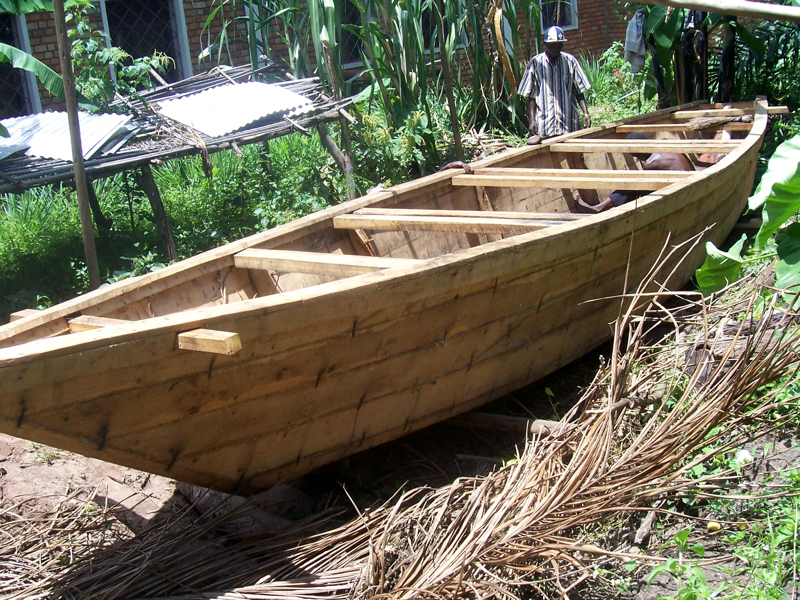
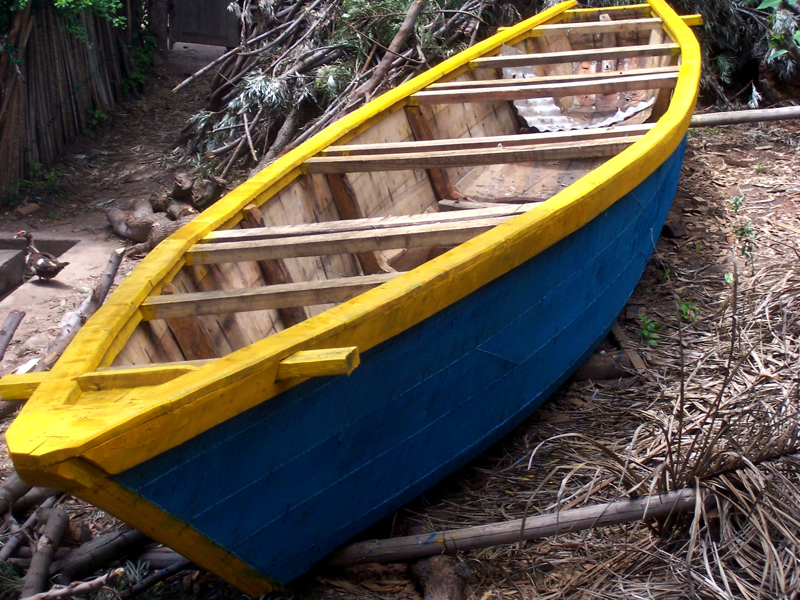
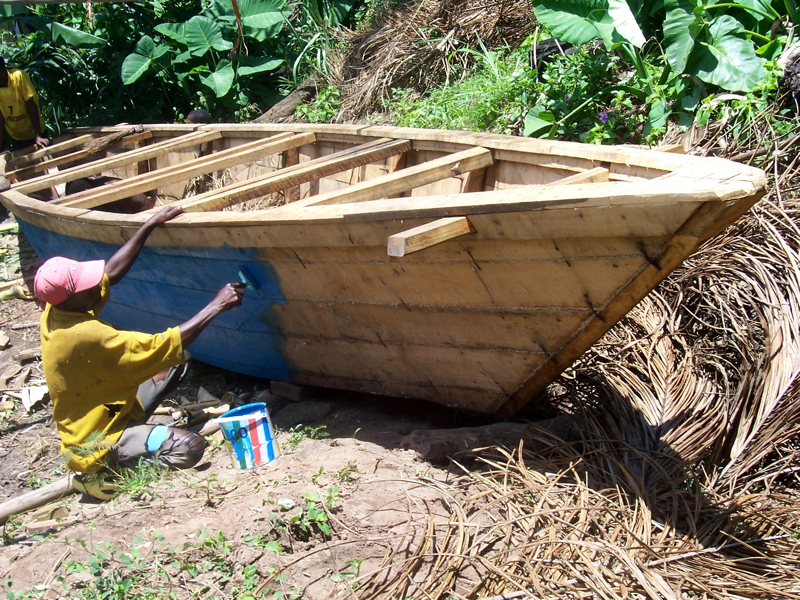
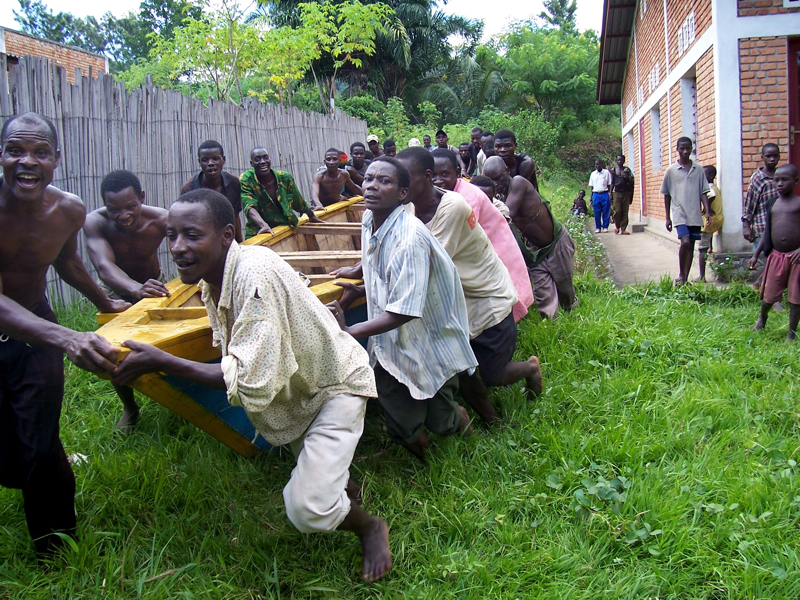
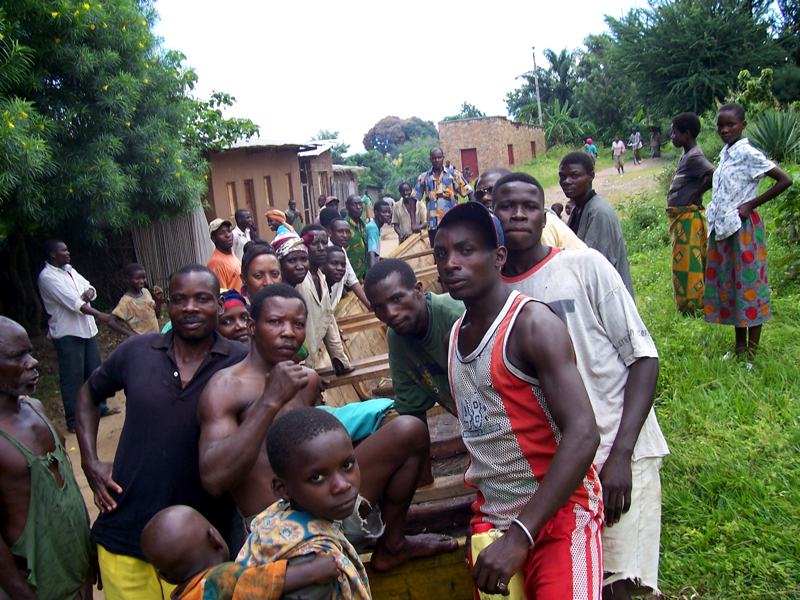
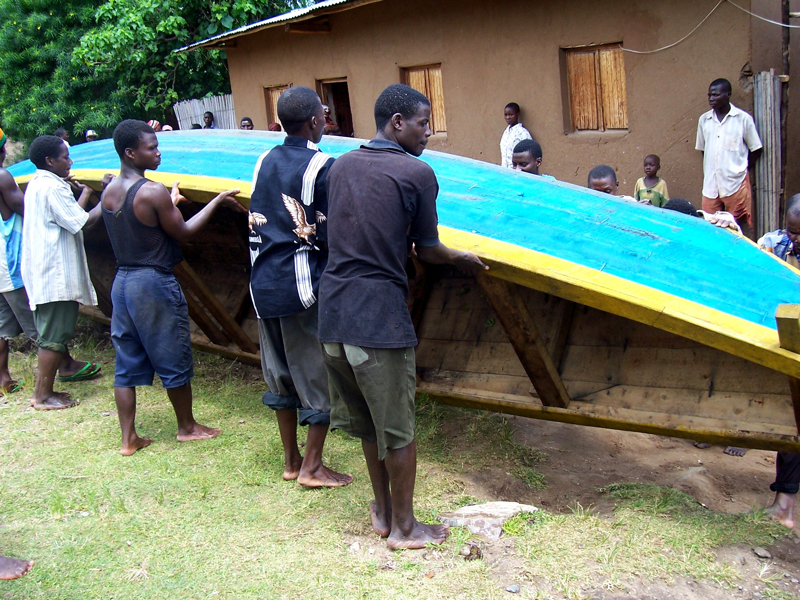
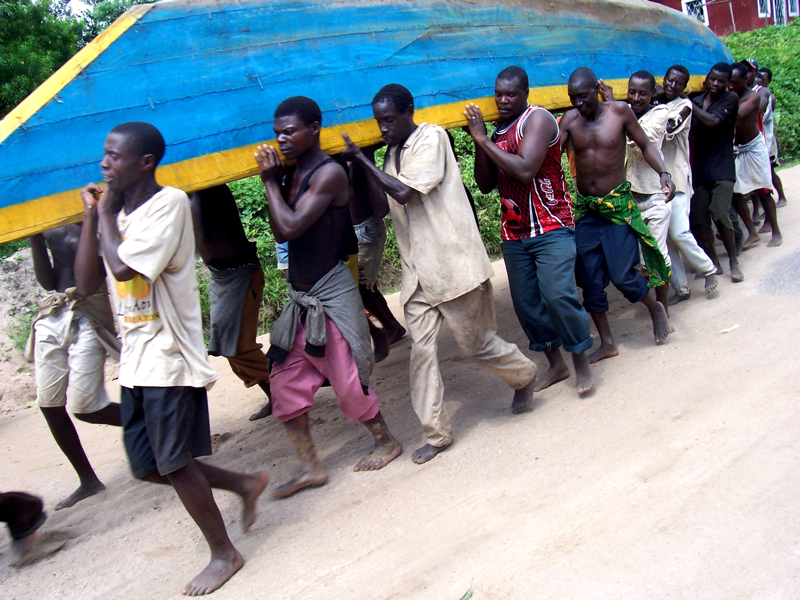
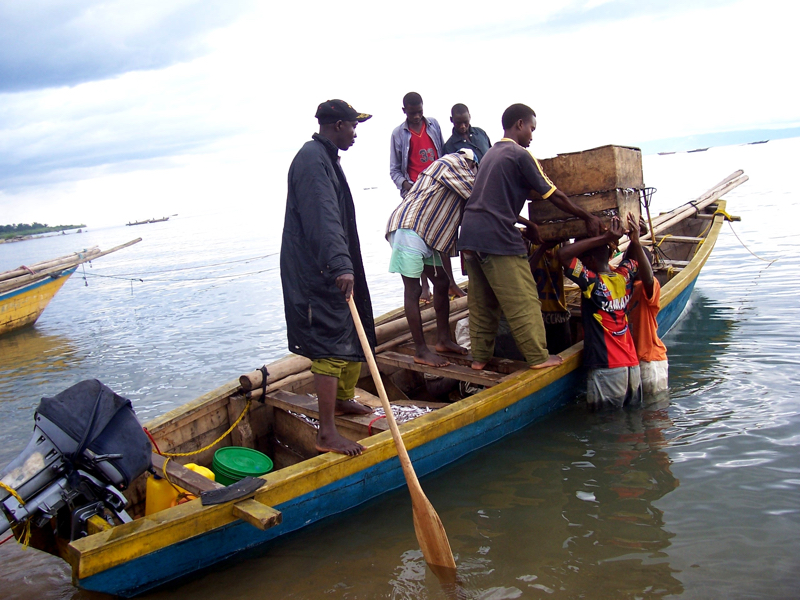
Objective:
This project, carried out in 5 months, allowed the construction of two "Apollo" type motor catamaran boats as well as the training of about ten fishermen grouped in an association. The boat which belongs to our partner CASOBU asbl allows these families to practice fishing on the lake Tanganyika, this since March 2006. The catch that is not consumed is sold on the market of the capital Bujumbura and the profit that is made can be used for the construction of their own fishing boats in 3 years’ time.
Beneficiaries:
The beneficiaries of this project are 64 people, all members of 10 families repatriated to Burundi after having fled to Tanzania because of the violent conflicts between Hutu and Tutsi.
Financing:
Total budget of the project: 9'813.74 €
Action pour un Monde Uni: 3'271.25 €
Luxembourgish Government: 6'542.49 €
Local partner:
Cadre Associatif des Solidaires du Burundi (CASOBU asbl)
2006-2010 Skills training and job creation for young girls in the bakery and catering sectors in Akum/Bamenda



Total budget of the project: 51'262.40 €
Action pour un Monde Uni: 17'087.47 €
Luxembourgish Government: 34'174.93 €
Local partner: Focolare Movement in Bamenda
The bakery activities have gradually developed through the production of bread, cakes, fish pie and chinchini- a local speciality.
Since July 2008 bread has been sold in three shops, one of which is a supermarket, which means that the bread offer reaches a wider range of customers. Since March 2009 the bread has also been delivered to the hospital for diabetics and to a specialized health food store.
Cakes and pastries are mostly sold for special events such as weddings, family celebrations or birthdays.
Although cakes are in increasing demand, bread is still the best-selling product.
The training in catering, initiated in March 2008, went according to plan and is beginning to bear fruit. Between April 2008 and March 2009 the catering service was offered four times. All kinds of cakes could be delivered for weddings, funerals and other family celebrations.
In order to be able to offer an even more complete service, some sewing activities for the decoration of the festival halls were started in November 2008.




Total budget of the project: 155'989.77 €
Local partner (CODEK): building plot
Action pour un Monde Uni: 51'996.59 €
Luxembourgish Government: 103'993.18 €
The village of Kosmadji 1 is located in a very landlocked area, and has one of the lowest school enrolment rates in the country due to the lack of adequate infrastructure. The same applies to the surrounding villages of Kosmadji 2, Bila, Woueha piste, Kap, Koumba Mbang, Mbeque, Mbang 1, Mbang 2 and Bika. The total population of these ten target villages is estimated at 20'000 inhabitants.
All these populations are well below the poverty line (less than EUR 0.50 per day per capita). They live mainly on the products of small-scale farming and hunting. Life expectancy is very low, with the juvenile age group representing 70% of the local population.
Around 600 children aged between 4 and 15 years in Kosmadji 1 and the nine other villages will benefit from the construction of a new primary school planned by Action pour un Monde Uni.




Total budget of the project: 409'559.87 €
Local partner (AECOM): 44'000 €
Action pour un Monde Uni: 92'519.96 €
Luxembourgish Government: 273'039.91 €
As some of you already know, for some time now the AMU team has been working on a new project to build a maternity ward and supply equipment to a pediatric ward in Kinshasa.
You certainly still know the medical center "MOYI MWA NTONGO" which means sunrise. In 2007, "Action pour un Monde Uni" has already financed the refurbishment of an additional building as a center for voluntary AIDS testing and various treatments by the medical center.
The application for co-financing for the maternity ward was submitted to the Ministry at the beginning of April. This project provides for the construction and equipment of a maternity and pediatric ward in order to end the inadequate capacity of the existing medical center.
At present, all pregnant women attending antenatal consultations at "MOYI MWA NTONGO" must go to the nearest hospital to give birth. Approximately 10 women are transferred each month to other facilities for delivery with risk of fatal complications.
By providing quality care, this project aims to reduce maternal and child mortality.
In concrete terms, this means:
- to build a one-story building of 650 m²;
- to install the maternity ward on the ground floor and the pediatric ward on the first floor with 23 rooms and 15 beds;
- equipping the premises with specific medical equipment.
Only a few days after the agreement by the Ministry, we were lucky enough to welcome here in Luxembourg Dr Arthur Ngoy, gynecologist and chief doctor of this center. Dr. Ngoy, who was head of department in the large St Joseph's hospital in Kinshasa, had the courage to give up this beautiful career to join the still rather modest "MOYI MWA NTONGO" medical center. A decision against the tide, not easy to understand by his entourage, but after a few years, Dr. Ngoy says he is sure he made the right choice.
Our host, called Arthur by his friends, brought us a wooden statue of a Congolese woman carrying her newborn baby on her back. This woman gets up around three o'clock in the morning, she takes her hoe to go to work in the fields. Her baby stays with her throughout the day so that she can breastfeed it as needed. Before returning home in the evening, she goes to fetch water from the spring and brings it back to give her family something to drink.
Arthur explains that if this woman is missing in a family, the whole family is destabilized and often the children are treated as witches and are socially excluded. Recent statistics show that in the Democratic Republic of Congo about 550/100,000 women die during childbirth, and two women die every hour for preventable causes! Childbirth is therefore by no means risk-free in this country. As a gynecologist, Dr. Ngoy's ambition is to commit himself as much as he can to reduce these deaths, both maternal and infant. It is important to know that currently in the DRC one child out of six does not reach the age of five and the time just after birth remains a very delicate moment. The health zone where the medical center is located has more than 500,000 inhabitants. It is the only health area where there is not a state hospital, which makes it difficult for the population to seek adequate care.
Dr. Ngoy expressed his heartfelt thanks to AMU, all the donors and the many people who are committed to supporting this project. Various highlights characterized this short visit, including two meetings with children working to support this construction and the presentation of the cheque from the international lunch organized by Jeunes pour un Monde Uni.
Our Congolese friend is impressed by the commitment of the people here in Luxembourg and we are touched by the reality of Kinshasa and by the self-sacrifice of the staff at the medical center. These few hours confirm to us how much we are working, here and there, for the same cause.
2018-2020: First emergency aid for the reinstatement of the Moyi mwa Ntongo medical center in Kinshasa, DRC, after the collapse of a silo in a neighboring factory
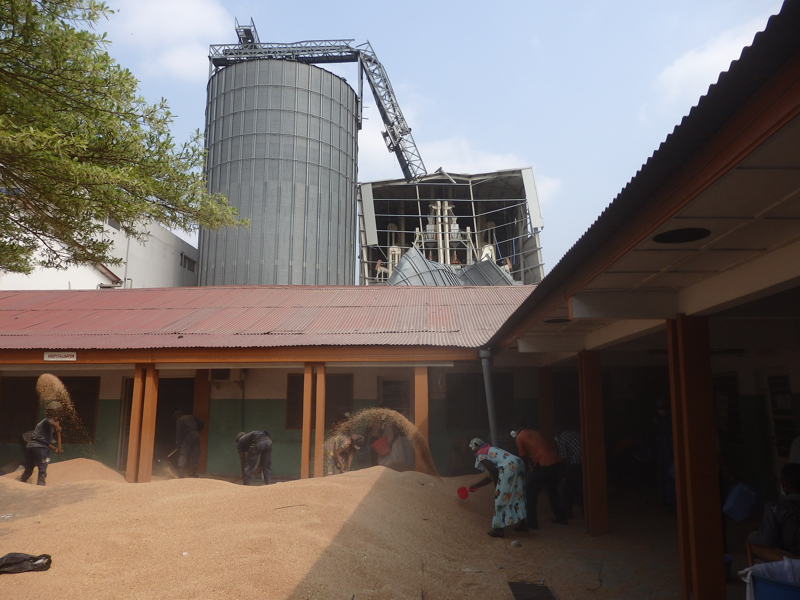
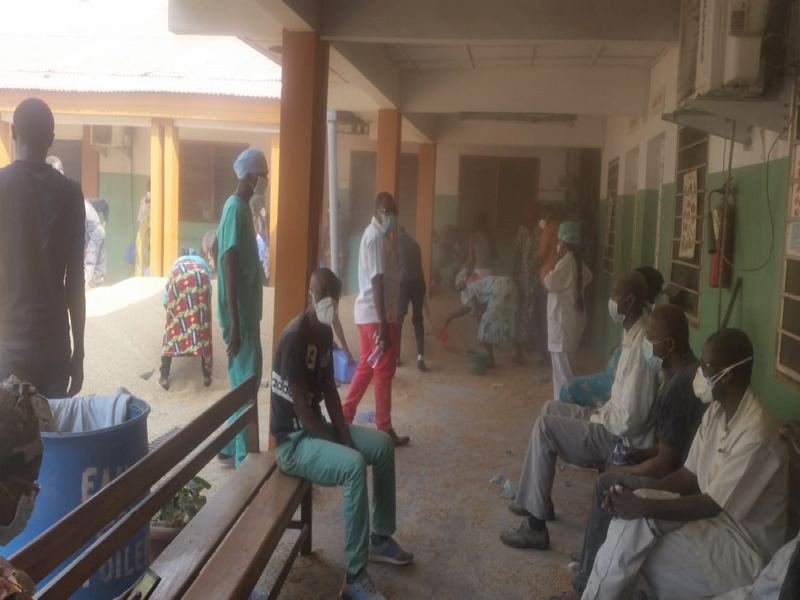
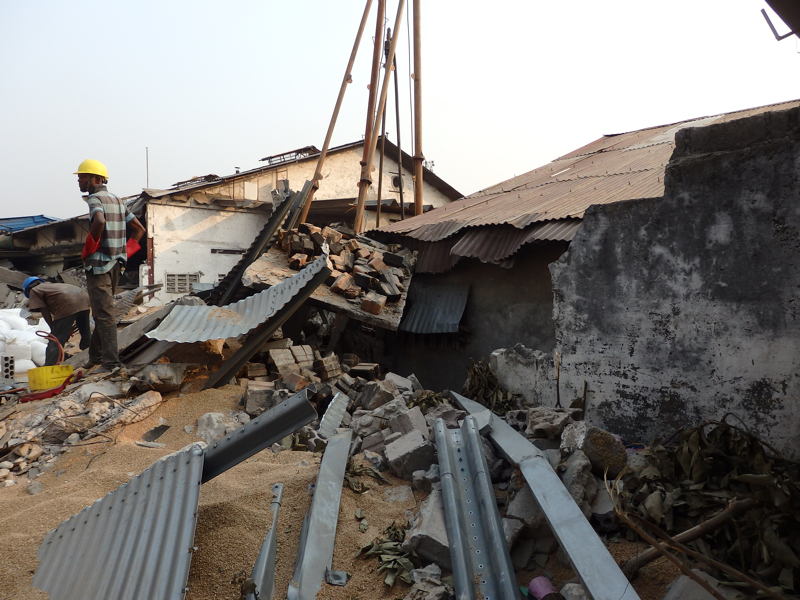
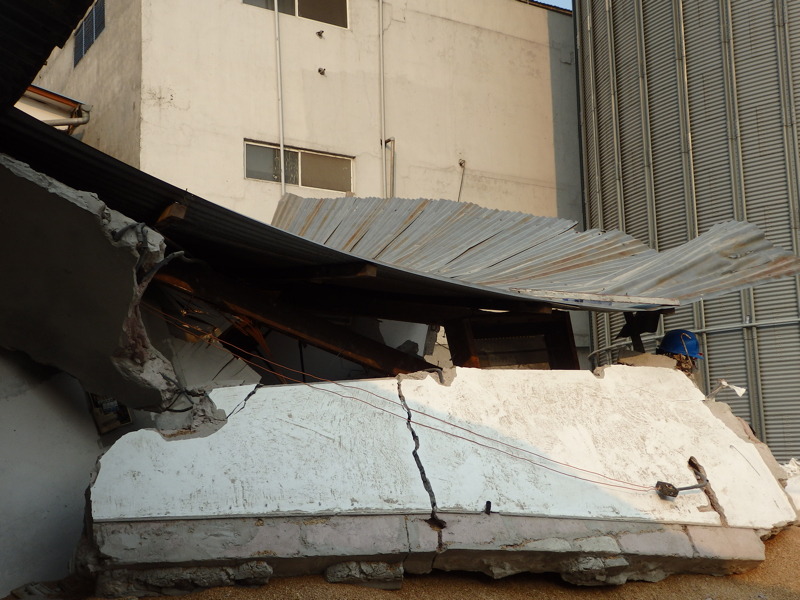
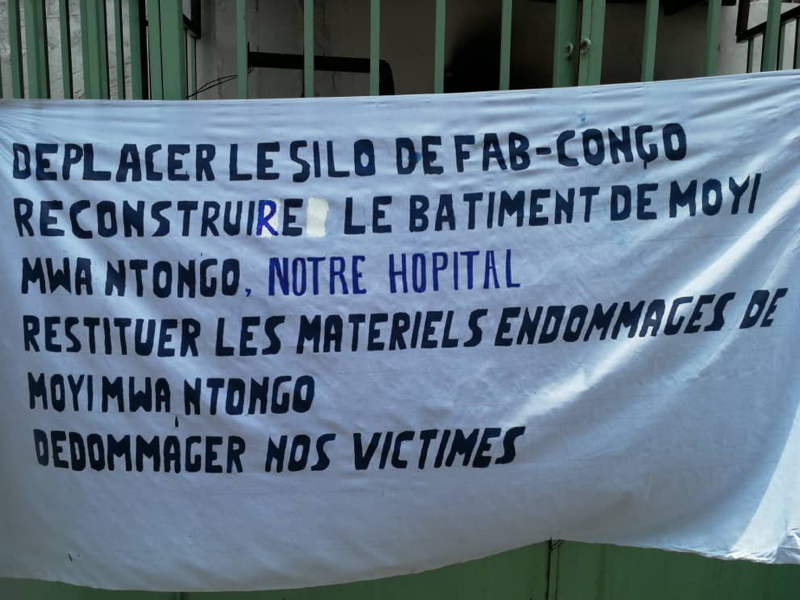
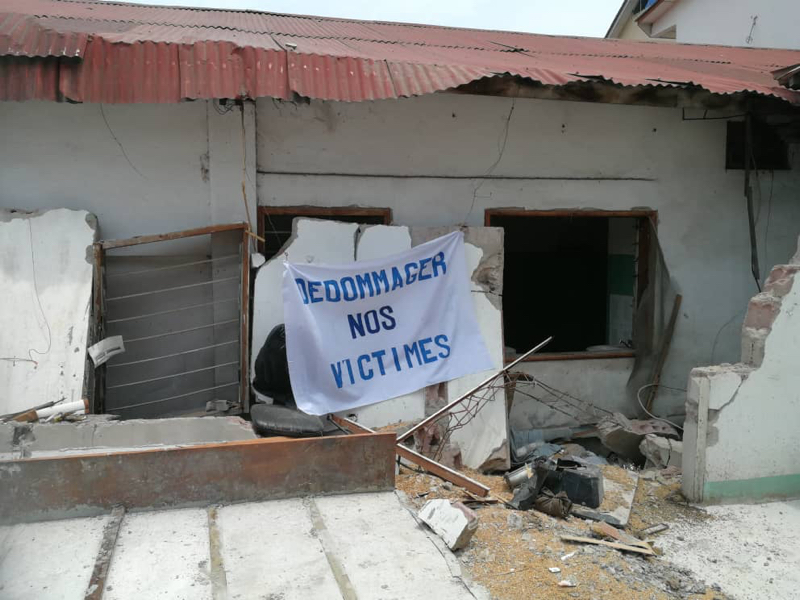
Location
The Moyi mwa Ntongo medical center is located in Kinshasa, the capital of the Democratic Republic of Congo, in the commune of Limete.
The hospital Moyi mwa Ntongo
In 2006, the Moyi mwa Ntongo Medical Center was built to solve the difficulties in caring for people living with HIV/AIDS and for people who are visually impaired. Over time, other preventive, curative and even promotional medical activities have been added. The hospital treats all patients coming to the center and offers specialized consultations in general medicine, ophthalmology, surgery, pediatrics, stomatology, ENT, gynecology, as well as all forms of infectious diseases.
Brief description of the humanitarian situation
During a project visit (27.08.2018-07.09.2018) of a delegation from AMU, a grain silo of a factory near the medical center Moyi mwa Ntongo collapsed. This accident occured Tuesday, August 28, 2018 around 9:25am. Having just left the hotel located near the medical center, the AMU delegation observed the crash of the silo. Parts of the silo, along with tons of wheat grains, fell on a part of the hospital. The situation was very precarious and chaotic during the first days. The two twin silos had a height of approximately 40 m and had only been inaugurated in March 2018. This accident caused great damage and counted numerous causalities. At the end of our stay in the DRC, 2 deaths were confirmed from the side of the hospital while another neighboring factory counted 21 victims.
While the new maternity and pediatrics building, inaugurated in 2016, was not damaged, another building of the hospital was severely damaged by the disaster. In particular, the foundations have collapsed, the beams and lintels are broken on one side and there are huge cracks in the walls. The damaged building was constructed in 2007 by AMU. In this building was found the laundry room, the maintenance office, the incinerator, the changing rooms, the hospital room, the sterilization, the toilets and the dentistry. A reparation of the damaged building would not suffuse to guarantee the safety of the patients and staff according to an Italian engineer who visited the hospital 4 days after the disaster. It is therefore necessary to rebuild this part of the hospital during a later project. For the reinstatement of the maternity and pediatric building, the installation of a new septic tank as well as an incinerator and a sterilizer are necessary.
Description of the project (download FLYER)
This project will reinstate the undamaged parts of the hospital, including the maternity and pediatrics building. These undamaged parts have been reopened for patients, but the services offered are still limited and of a lower quality as a lot of equipment and material has been destroyed by the disaster. Every day, the hospital must refuse more than 100 patients!
As the damaged part arbitrated several services, the loss of material is very important. The following materials are missing (the list is not exhaustive):
All the archives of the last ten years 2006-2016 (records of patients, accounting documents ...), more than two tons of work clothes of doctors, nurses and laboratory technicians, bed sheets, drapes and other masks are missing in the rubble. One standard X-ray machine, one mammography machine, two portable Doppler ultrasound machines, two 300-liter autoclaves, three 25-kilogram washing machines, 5 irons, 4 wooden cabinets, 2 wooden shelves, 20 cans of 25 liters of bracteol, 10 cans of 25 liters of bleach, 2 damaged dental chairs, 21 patient beds plus mattresses, 21 bedside tables, 21 gallows, 100 mosquito nets, an anesthesia machine ...
Needs assessment
Currently, Moyi Mwa Ntongo Medical Center continues to provide medical services. However, services are limited and inferior in quality, as a lot of the medical equipment and devices were destroyed during the disaster. In particular, the destruction of the sterilizer and the incinerator makes the realization of surgical services impossible. Moreover, many hospital rooms are destroyed or seriously damaged.
The reconstruction of the damaged building requires more financial resources and time, so it has to be realized during a later project. However, for a good restitution of the undamaged parts of the hospital, our local partner presented us the following project. It covers all essential material to reinsure good patient care.
The different activities to be carried out, in order to allow quality treatments of patients, are the following ones:
1. Sanitation, disinfestation, demolition, emptying, disposal of waste.
2. Construction works of the sewage and toilet drainage ways.
3. Construction work of the incinerator.
4. Purchase of essential materials and other basic consumables.
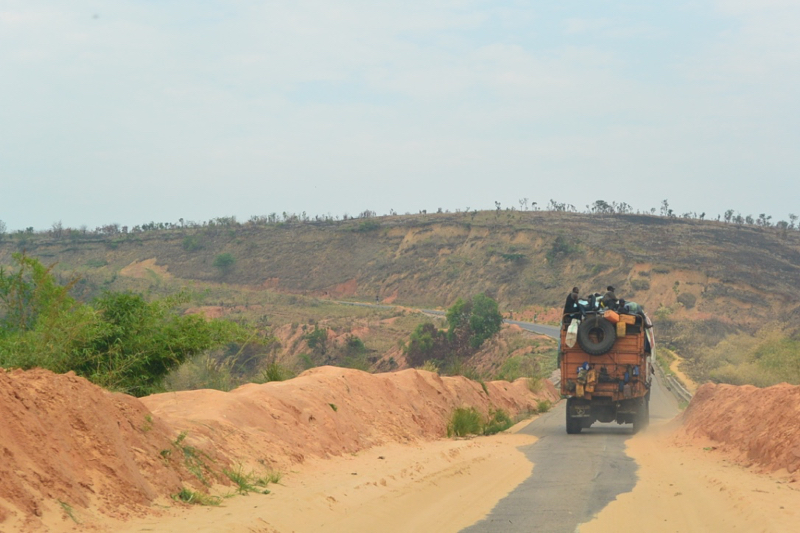
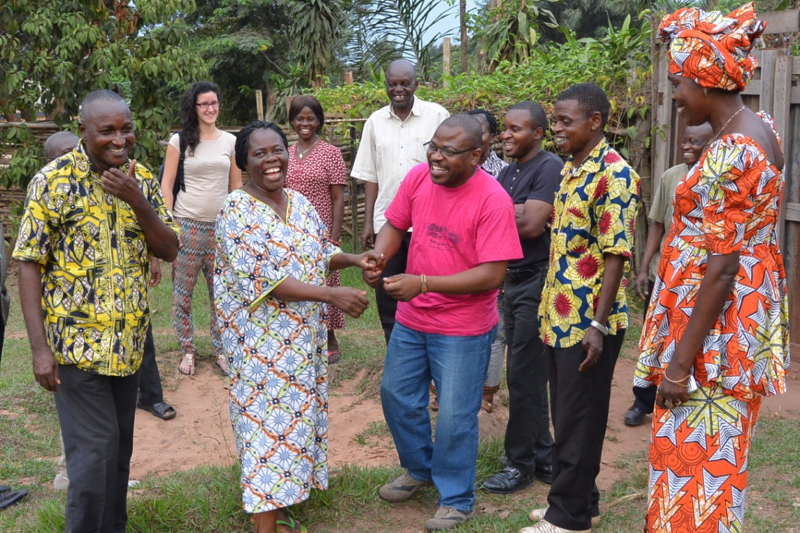
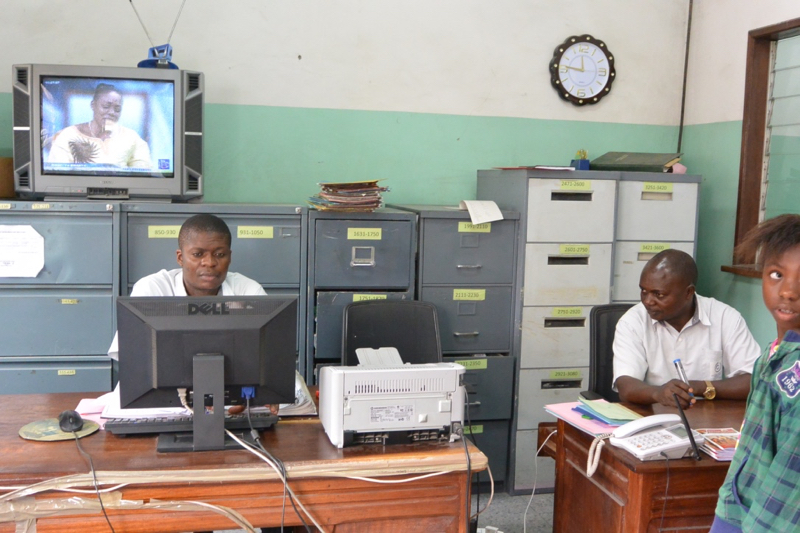
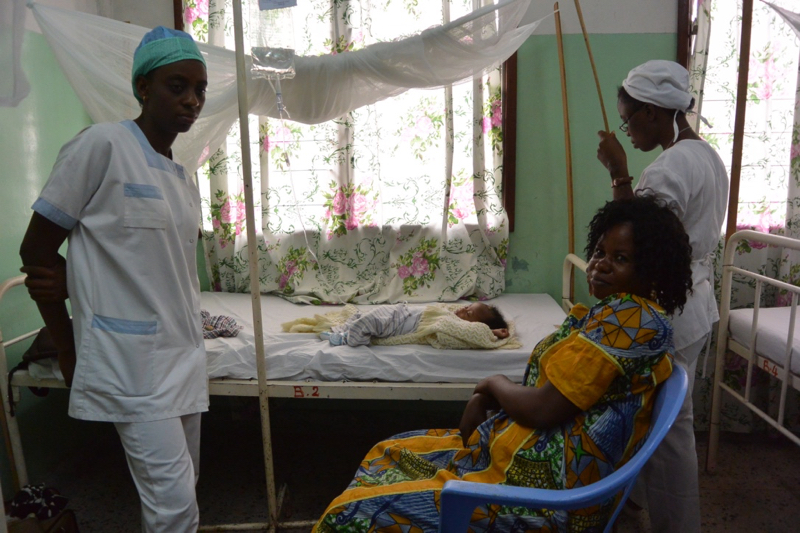
Location
The project is carried out in three different cities in the Democratic Republic of the Congo (DRC), namely in Kinshasa, in Kikwit and in Lubumbashi. Kinshasa is the vibrant capital of the DRC with more than 17 million inhabitants. Kikwit is the main city of Kwilu province, located east of Kinshasa. The capital of the province of Upper Katanga, Lubumbahsi, is located in the south of the country, near the border with Zambia.
Current situation
The DRC counts nearly 77 million people and there are major gaps in the provision of health, education, infrastructure and energy. Life in the three cities is not easy, many people do not have access to vocational training and therefore have difficulties in finding a job. Lack of education leads to particularly high unemployment rates (more than 46% in 2018).
Some statistics:
Despite the enormous wealth of the DRC in raw materials (coltan, diamonds, copper, etc.) and despite a drop in the poverty rate from 71% to 64% between 2005 and 2012, the country is ranked only 176th out of 188 in the Human Development Index (UNDP, 2016). It is a particularly vulnerable country that lacks coping mechanisms. Life expectancy at birth is 59 years and average years of schooling are 6 years (UNDP, 2016).
Description of the project (download FLYER)
The project aims to strengthen the capacity of the local population through vocational trainings in 7 different areas: health, social economy, computer science, sewing, hairdressing, agriculture and renewable energies. The project also offers trainings to trainers who will then teach young trainees and entrepreneurs in these different fields. These trainings will be held in Kinshasa, in Kikwit and in Lubumbashi. The purpose of the trainings is to enable the population to start income-generating activities.
Across the three cities, a total of 1.482 people will benefit from this project, including girls and boys, young entrepreneurs, medical staff, teachers and trainers. The number of beneficiaries per area of intervention is: health (126), social economy (66), computer science (606), sewing (156), hairdressing (156), agriculture (306), renewable energies (66).
375.527,68 EUR : Budget allocated to the project
277.890,48 EUR : Contribution of the Luxembourgish Government
97.637,20 EUR : Contribution of Action pour un Monde Uni asbl
Local partner at DR Congo : AECOM.
Co-financed by the Luxembourgish Ministry according to the framework agreement signed between the Luxembourgish Ministry and the NGO Action pour un Monde Uni on 11.01.2018.
2016-2019: Development of the village of Kikoti in the D.R.Congo through a school and agricultural project
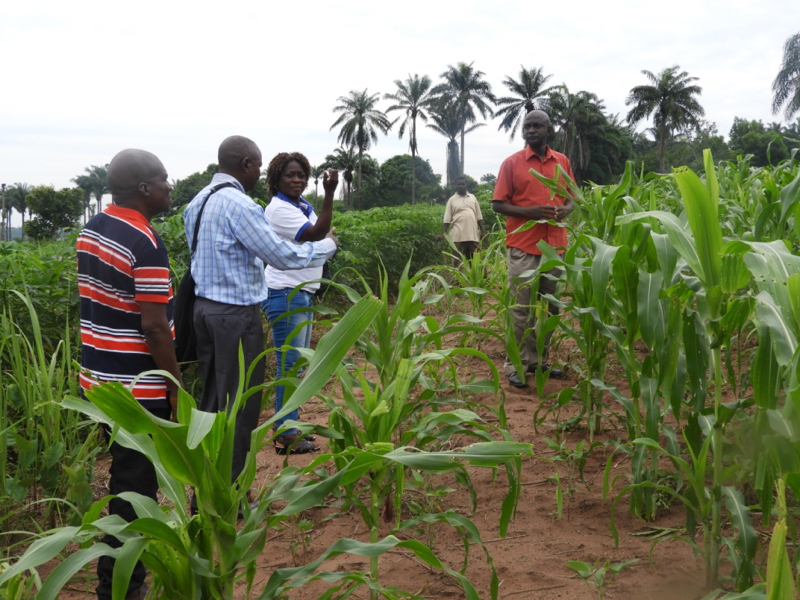
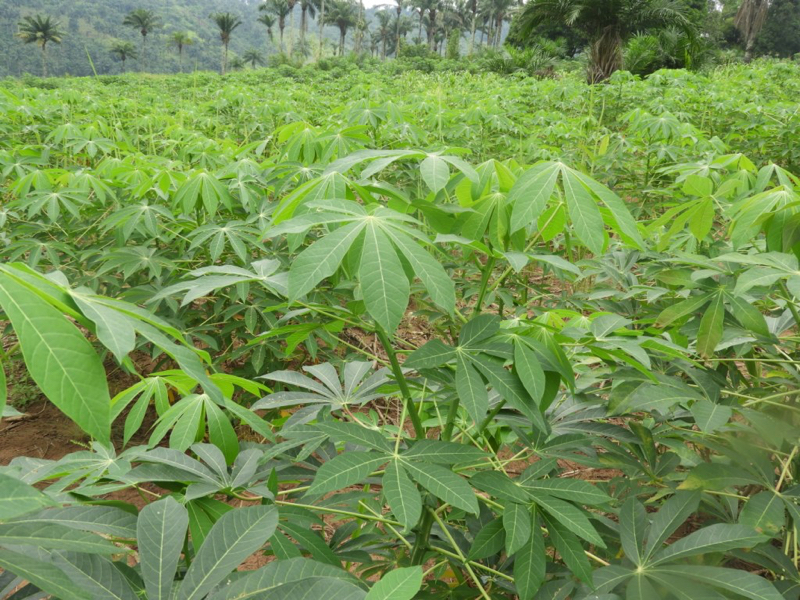
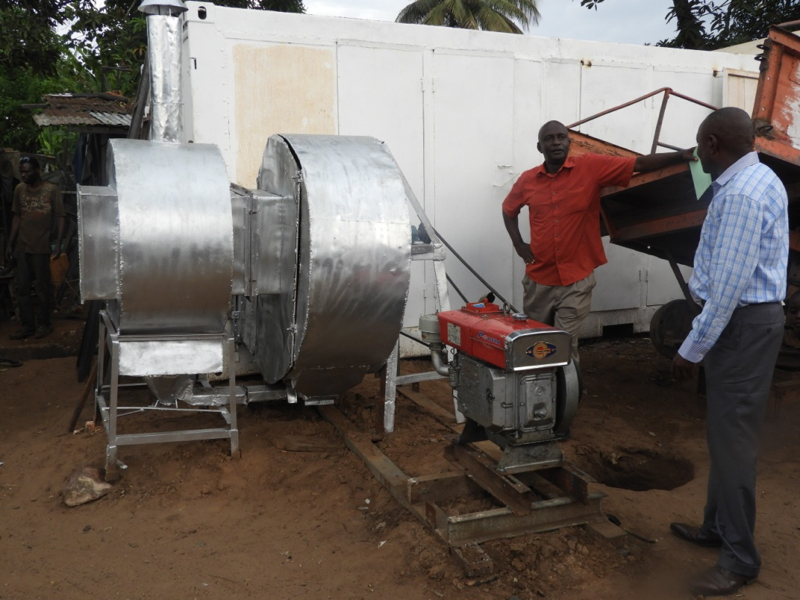
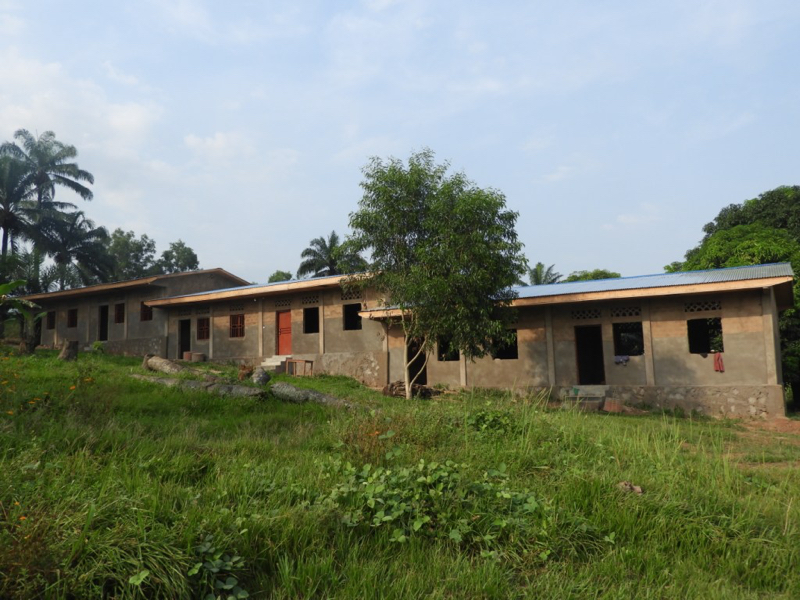
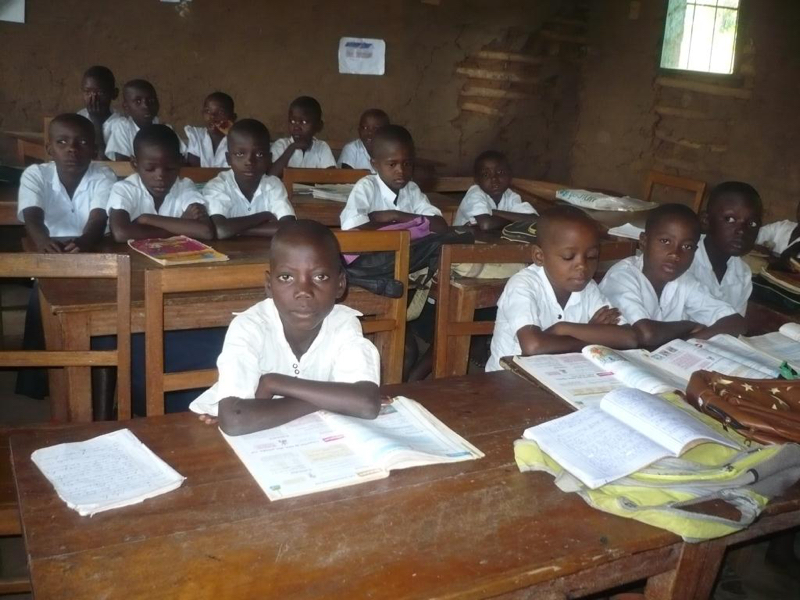
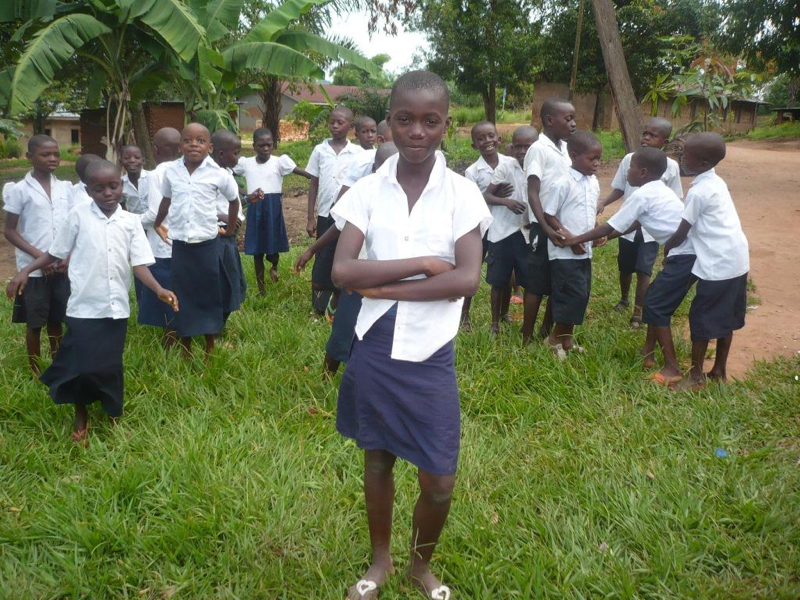
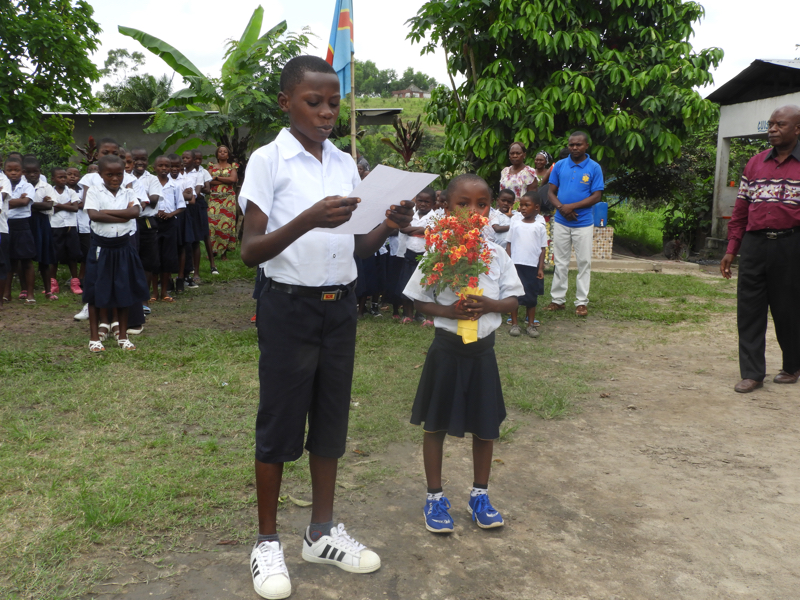
Location:
The project is run in Kikoti, a village in the province of Kwilu in the Democratic Republic of the Congo. Kikoti is located about 500 km east of Kinshasa. The inhabitants of Kikoti village live mainly from a simple agriculture.
Current situation:
Living in the village of Kikoti is not easy: People do not have access to drinking water, nor to the public electricity network. There are only a few shops, few public infrastructures and few transport opportunities available. Agricultural techniques and manioc drying techniques are not appropriated, the next manioc and corn mill is extremely far away.
Some information:
The village of Kikoti covers an area of 25 km2 and has population of about 42.000 inhabitants. Numerous people from surrounding areas, who have been unable to find a job have come to Kikoti in search for a better future. The few existing schools in the village are often not accessible for children from poor families. Mostly, classrooms are in rudimentary buildings without the necessary infrastructure such as desks and chairs.
Description of the project (download FLYER)
- Construction and equipment of 6 classrooms with adequate sanitary facilities.
- Training of new farming techniques for 250 villagers.
- Classes in agriculture for 450 students.
- Installation of a manioc dryer and a mill for manioc and corn
309'630.35 EUR : Budget allocated to the project
206'420.23 EUR : Contribution of the Luxembourgish Government
103'210.12 EUR : Contribution of Action pour un Monde Uni asbl
Local partner in the DR Congo : AECOM.
Co-financed by the Luxembourgish Ministry according to the framework agreement signed between the Luxembourgish Ministry and the NGO Action pour un Monde Uni on 11.01.2018.




Total budget of the project: 473'374.40 €
Sant'Egidio ACAP Guinea 53'000 €
Action pour un Monde Uni: 104'791.47 €
Luxembourgish Government: 315'582.93 €
The activities of the DREAM centers in Dixinn, Fassia and Dubreka
Dixinn DREAM center
The DREAM center also has a molecular biology laboratory, the only one in the country where viral load calculations can be performed and where early diagnosis can be made for newborns. The laboratory therefore makes an important contribution to the fight against HIV/AIDS in the country as a whole, in particular by enabling other public care structures or other NGOs to carry out blood tests.
The two satellite DREAM centers in Fassia and Dubreka
To get to the DREAM center, many patients take taxis, which is a significant cost. Reports from health and social workers, especially the activists (HIV-positive people active in the project), have shown that patients sometimes prefer to save on transport costs and therefore do not go to the medical consultation, which is free of charge. Access to health care is therefore affected.
In response to this problem, two satellite health centers were opened by DREAM: the first in the outskirts of Conakry, in Fassia (Coyah prefecture) in 2010, and the other in a small town, Dubreka, 50 km from Conakry, in 2011. These two centres provide easy access for many patients living in these areas. These centers depend on the laboratory at the Dixinn center in Conakry.
Currently, they operate 4 days a week and can only accommodate a limited number of patients. It is proposed to strengthen their capacity so that they can reach more patients in the suburban and rural areas around Conakry.
In Fassia, since 2010, the DREAM mobile unit has been supporting a satellite center in which a small dispensary has been set up, where all the services of the Dixinn DREAM center can be offered: screening tests, blood samples, medical check-ups, delivery of medicines and nutritional support.
This light and flexible structure thus makes it possible to offer care and follow-up to a vulnerable group of the population that cannot move to the city center for economic and accessibility reasons.
The agreement between DREAM and the Ministry of Health was extended in July 2011 for a period of 3 years. As a result of this new agreement, the DREAM programme has been included in the National Strategic Plan for the Fight against AIDS. This made it possible to strengthen collaboration with the Ministry of Health, in particular, so that the DREAM centers are supported by the authorities in the supply of antiretroviral drugs.
On September 20, 2011, a new DREAM center specially dedicated to mother-child prevention was inaugurated in Dubreka, a city located 50 km from Conakry, but which is only an extension of the large agglomeration that extends over ever greater distances. This centre is a response to the transport problems faced by many patients from this area to reach the DREAM center in Conakry. The same care is now available closer to home. Support from UNAIDS has enabled DREAM to initially accommodate 30 HIV-positive pregnant women to follow the full course of preventing transmission of the virus, while at the same time working to increase the capacity of the center. The center is small but the hope is great: the medical practice is located in a large courtyard, a sheltered place, but close to the most important regional road leading to the interior of the Maritime Guinea region. The First Lady of the country was present at the inauguration of the new center and pledged to support the DREAM program through her Foundation.




Total budget of the project: 325'870.25 €
Contribution AMIZERO Lux: 108'623.41 €
Luxembourgish Government: 217'246.83 €.
Local partner: Turere Ibibondo asbl
Project carried out in partnership between AMU and AMIZERO-LUX.
Initial situation:
The School Center currently has 17 rooms (15 of which are used as classrooms, one room houses the principal's office and secretariat and another houses a small nursery for girls) and is faced with an ever-increasing number of students.
The school has too few classrooms to provide students with an adequate learning environment. There is often a lack of the necessary teaching materials to ensure the smooth running of classes. A number of students are found to be malnourished. Prolonged absences of students are due to health problems. There is no professional follow-up of pupils and their families in case of prolonged school absence, e.g. psychological follow-up for problems due to the aftermath of the genocide.
In Ruhango there is currently no reliable Internet access point, the first such access point being in Gitarama, i.e. approx. 25 km away.
Solutions retained:
Provide the school with adequate infrastructure: construction of two additional classrooms, a management office with a secretariat and an infirmary (to carry out prevention and education in hygiene, nutrition and sexual education, and in case of need, refer children to health centres).
To provide the school with the required teaching staff in accordance with educational and hygiene standards.
Reduce the number of children in class to a maximum of 36 children.
Solve the problem of malnutrition affecting a number of pupils by integrating into the project a school canteen on the one hand and an infirmary for advice on nutrition, prevention and treatment of certain diseases (e.g. malaria) on the other.
Putting in place additional staff (nurse, social worker).
To equip the Amizero School Center with a meeting center with an Internet access point, a library, a meeting room and a projection room. This meeting center could be used by the local population and would contribute to adult information and education. In addition, communication between the local community and the Luxembourg community would be facilitated.
To support the TURERE IBIBONDO association financially to cover part of the running costs for a certain period, while it prepares in the long term to provide itself a greater share of the financing and management of the school (through contributions from parents, membership fees, income from the rental of premises and computer and music equipment, and computer courses).
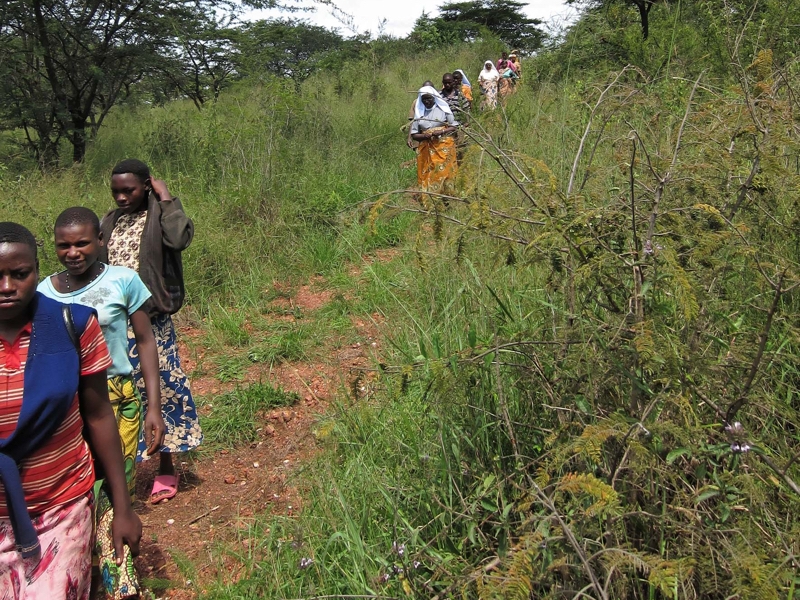
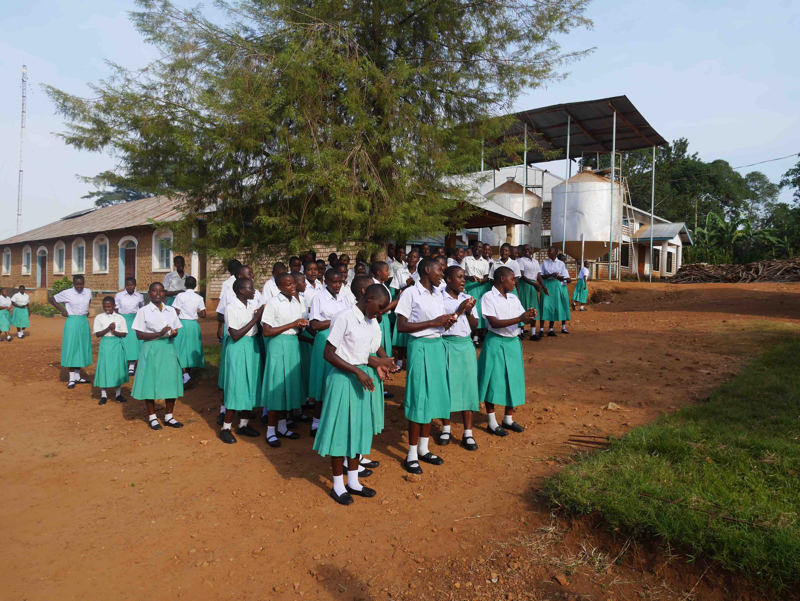
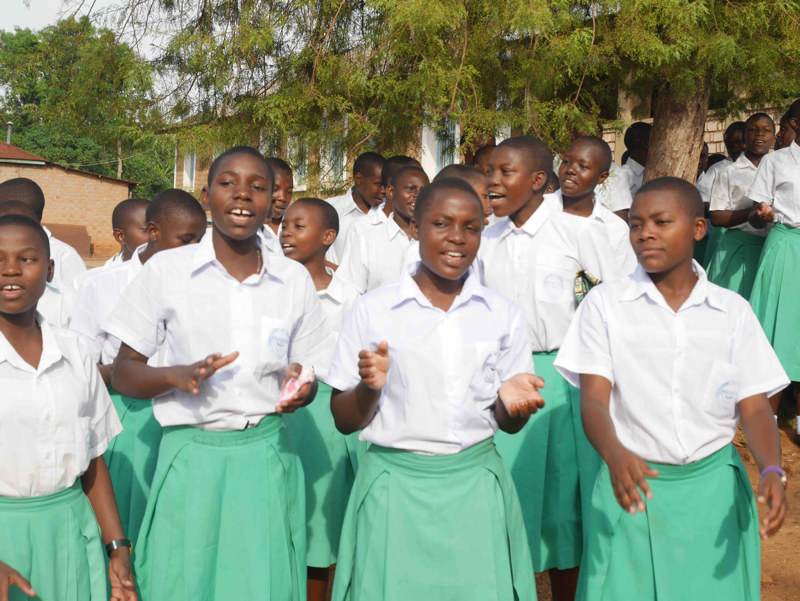
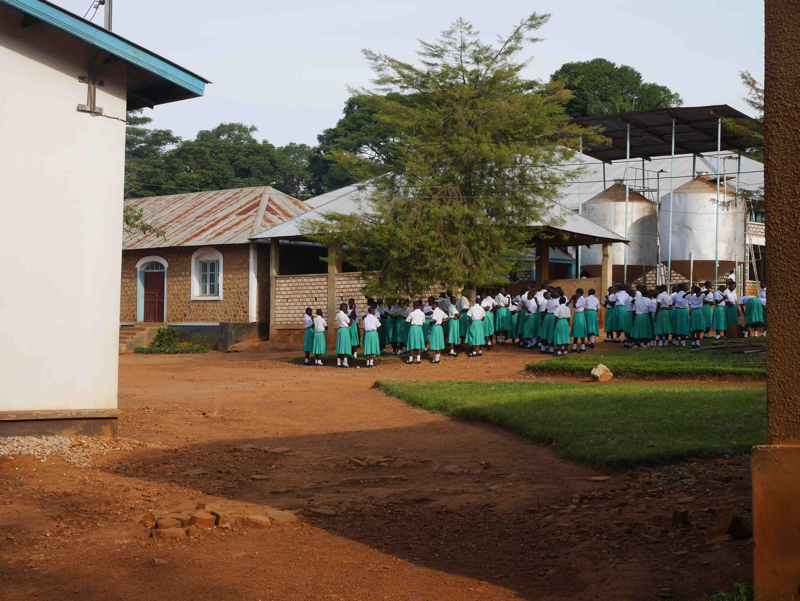
Location
The Hekima High School is located in Bukoba (about 100.000 inhabitants) in the north-west of Tanzania, next to the Lake Victoria. Tanzania is a low-income country, whose population is one of the youngest in the world, 43% of the population are under 15 years old.
Current situation
The buildings of Hekima High School were built in the 1930s. Over the years, some renovation works have been undertaken, but the school does not yet dispose of adequate and sufficient technological equipment. Meanwhile, the use of modern technologies in Tanzania is becoming increasingly more important.
Some information about Hekima High School
Although the buildings were constructed in the 1930s, Hekima High School only exists since 1988. The school was founded to provide young girls the opportunity to receive a good secondary education. Even though the situation has significantly improved since the 1980s, 1.5 million adolescents in Tanzania still do not have access to a secondary education due to a lack of resources (Human Rights Watch, 2017). The goal of Hekima High School is to lift girls out of poverty by providing them with a good education. The knowledge of new technologies will further enable these girls to emancipate themselves and thus to find good jobs.
Description of the project (download Flyer)
- Renovation activities for floors, windows, ceilings and walls
- Revision of the electrical system
- Equipment by computers and projectors
- Installation of the internet
- Trainings for students and teachers about the new technologies
The primary beneficiaries of this project are the students and teachers of Hekima High School. Indirectly, the community and the families will benefit from the additional qualifications which the students and teachers have acquired. Moreover, community members and students of the public schools will also be able to use the computers on demand. It is therefore estimated that the project will benefit a total of 400 people.
84'700.09 EUR : Budget allocated to the project
62'678.07 EUR : Contribution of the Luxembourgish Government
22'022.02 EUR : Contribution of Action pour un Monde Uni asbl
Local partner in Tanzania: Sisters of St. Therese of the Child Jesus.
Co-financed by the Luxembourgish Ministry according to the framework agreement signed between the Luxembourgish Ministry and the NGO Action pour un Monde Uni on 11.01.2018.
next visit planned for October 2019
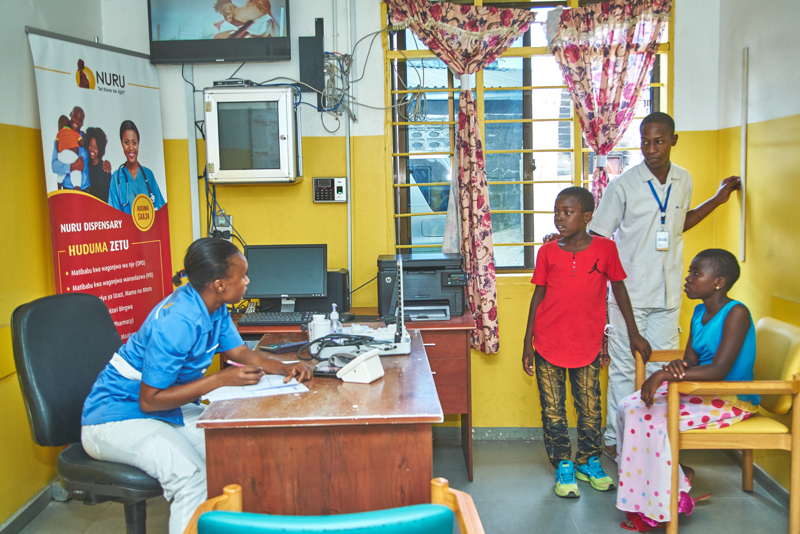
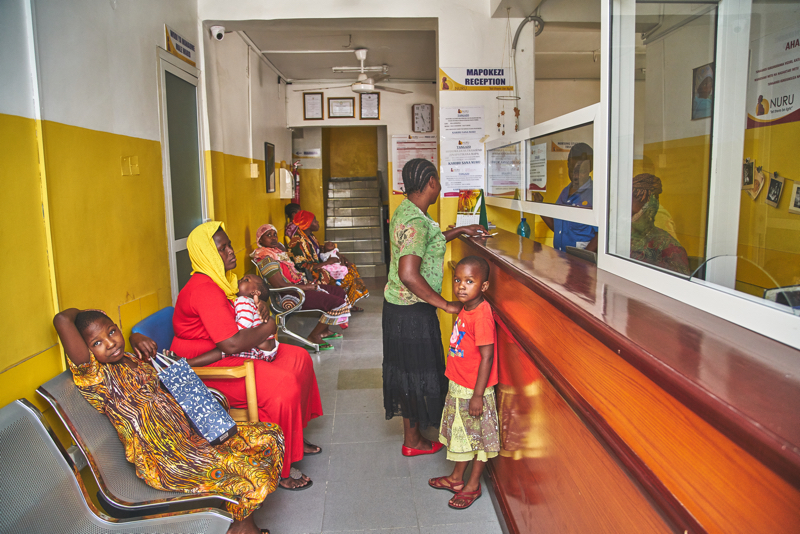
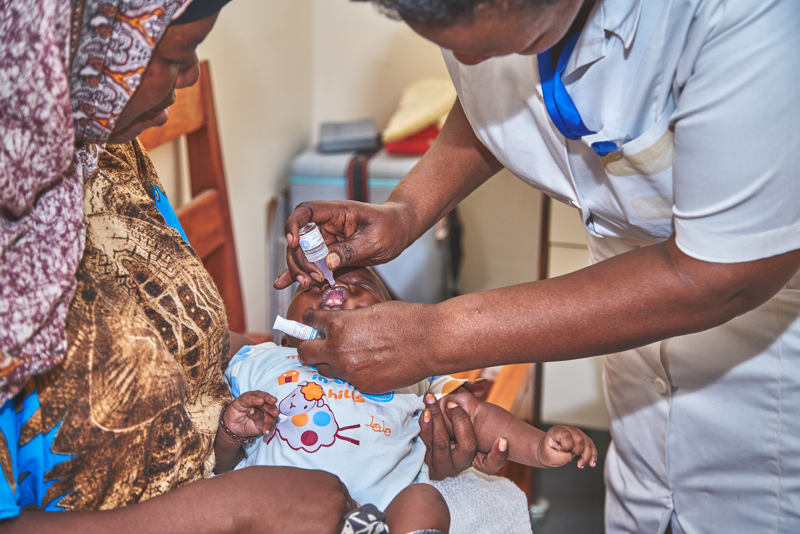
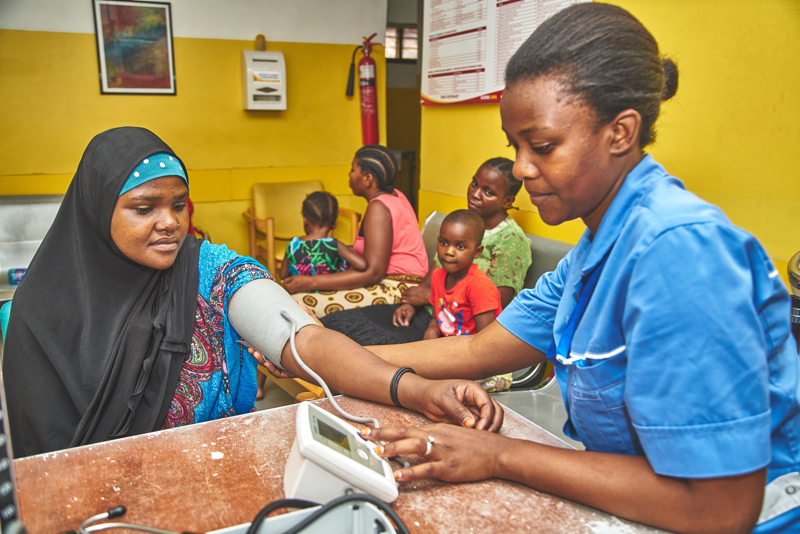
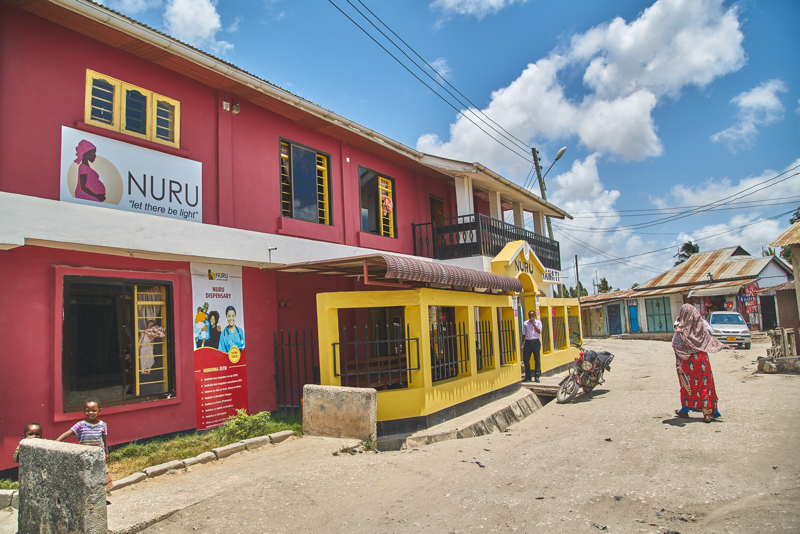
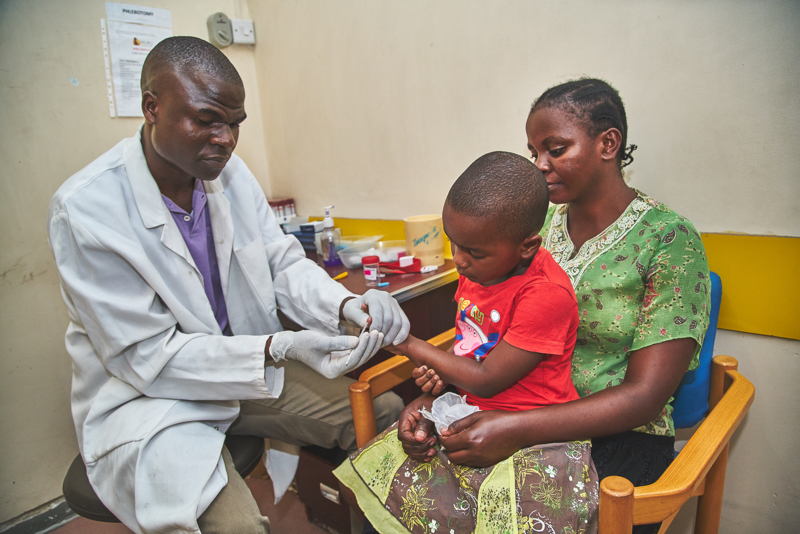
Location:
The project is located in Temeke district in Dar es Salaam, Tanzania. Dar es Salaam has about 5.3 million inhabitants. The city is divided into three main districts, of which Temeke is the poorest.
Current situation:
In Tanzania, health facilities often lack sufficient staff, adequate infrastructures, equipment and appropriate management capabilities. It is not uncommon for women to share beds during delivery or to give birth on the floor.
The district Temeke has about 1.4 million inhabitants but has only public hospital, the "Temeke Referral Hospital", which as a result is completely overloaded. No other hospital in Dar es Salaam records such a high child mortality rate as the Temeke Referral Hospital.
In Tanzania, every year 8.000 women die from complications during childbirth, representing more than four out of 100 women. During pregnancy, only 15% of women receive prenatal care and consultations. 50 out of 100 babies die during or up to one year after birth. In Dar es Salaam, 10 children die every day during childbirth (NURU Foundation). With regards to malnutrition, the current situation indicates a very high level of stunting as a result of chronic malnutrition, especially among children under five.
Description of the "NURU" dispensary:
The "NURU" dispensary was launched in December 2016 by a very dynamic team. The purpose of the dispensary is to provide quality health services in the fields of reproductive and child health. The dispensary offers prenatal consultations, consultations for children under-five, family planning and childbirth services.
Description of the project (download Flyer)
The objective of the project is to improve the health of mothers and children in the Temeke district of Dar es Salaam, Tanzania.
The project aims to improve access to affordable, high-quality maternal and child health services and to provide nutritional services to children, pregnant women and nursing mothers.
The primary beneficiaries are women and children from Temeke district that are in a vulnerable situation. Women and children that attend the NURU dispensary directly benefit from nutrition programs and health care services. On average, more than 500 children under 5 and 300 children aged between 5 and 15 receive health care services in the clinic every month, while approximately 130 pregnant women receive prenatal consultations.
In addition, the medical and non-medical staff from NURU dispensary will benefit from a training program which aims to strengthen their professional capacities.
68'750.00 EUR : Budget allocated to the project
50'875.00 EUR : Contribution of the Luxembourgish Government
17'875.00 EUR : Contribution of Action pour un Monde Uni asbl :
Local partner in Tanzania: NURU Fondation
Co-financed by the Luxembourgish Ministry according to the framework agreement signed between the Luxembourgish Ministry and the NGO Action pour un Monde Uni on 11.01.2018.
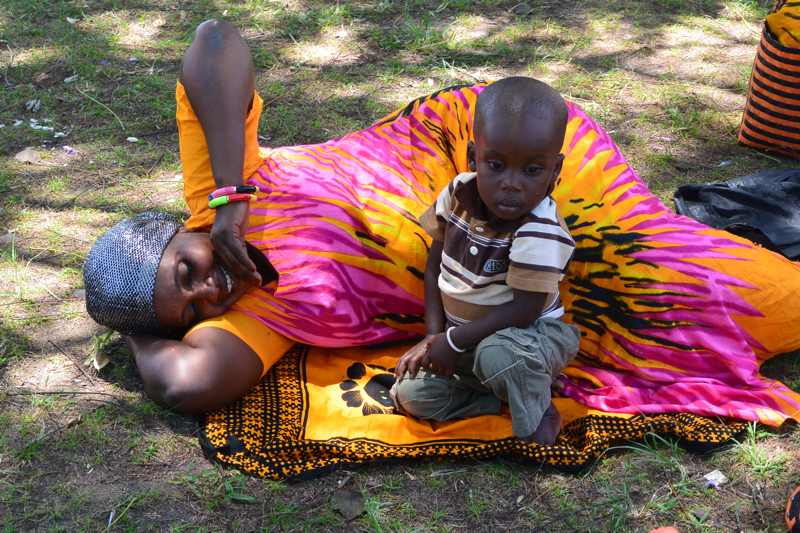
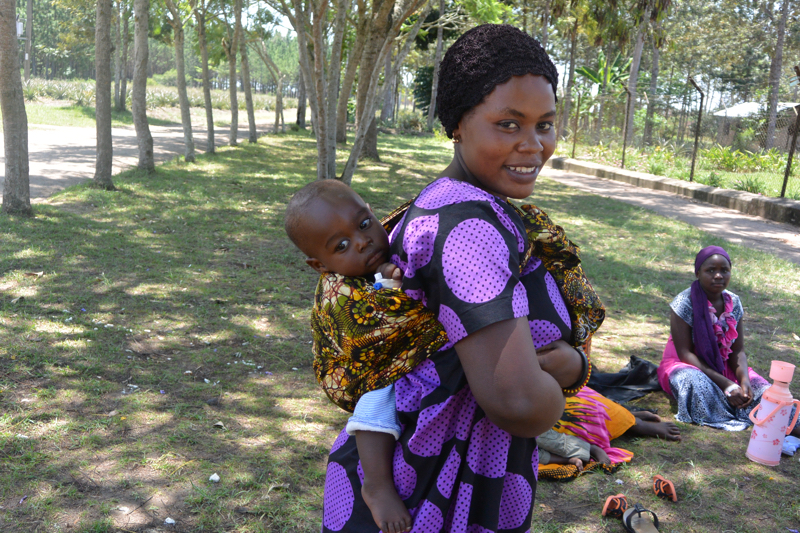
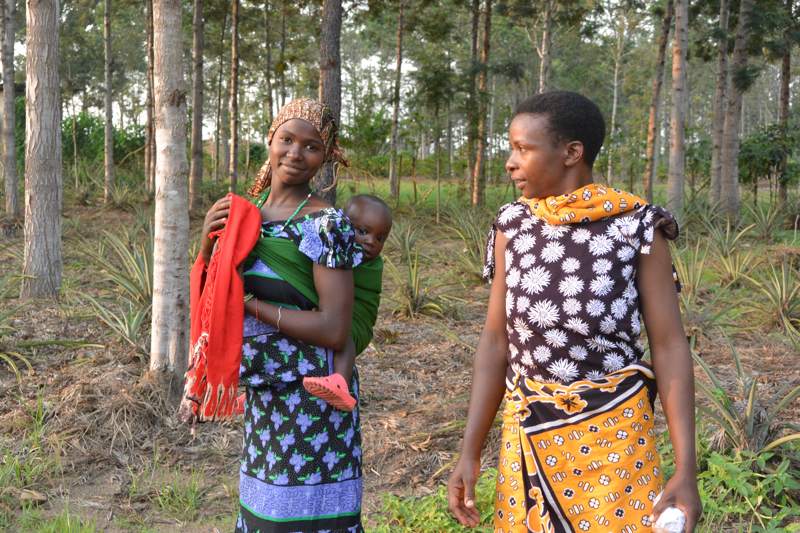

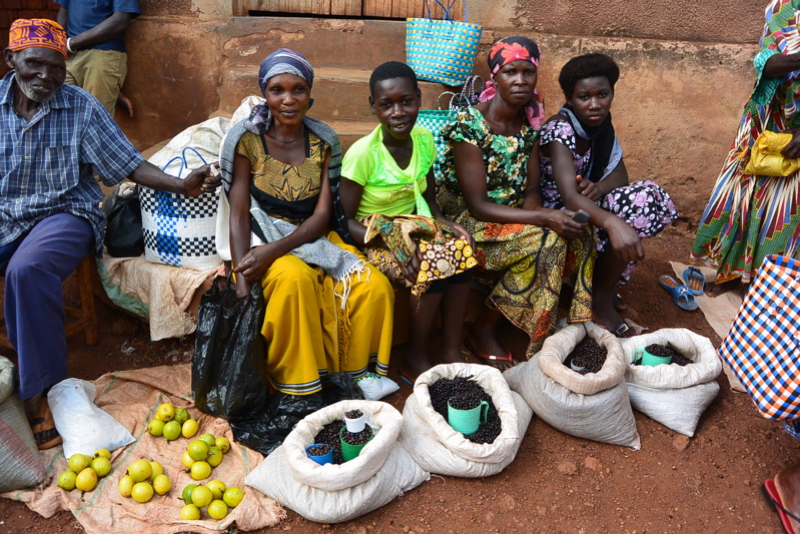
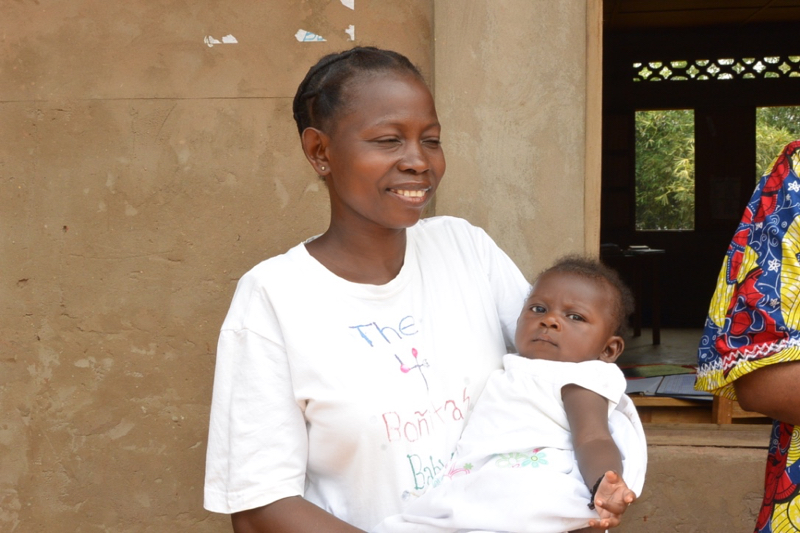
The project is realized in Kagera, in northwestern Tanzania, close to the Lake Victoria. This region is one of the poorest in the country.
Current situation:
In Tanzania, women face many oppressions and challenges. They often do not have the same access as men to education and to the labor market. As a result, they are less informed about their rights and their health. Moreover, women are often forced into marriages or live in polygamous marriages. The rate of domestic violence is high and divorced women are stigmatized in their community. Women are often supposed to submit to men, which can lead to a lack of confidence in oneself.
Some numbers:
According to UN WOMEN (2018), 2 out of 5 women in Tanzania have experienced physical violence and 1 in 10 women is a victim of sexual violence. The difficult situation of women results in a feminization of poverty. Forced by a lack of opportunities, many women end up as prostitutes. Women need a platform to exchange and develop solutions together.
Description of the project (download Flyer)
- Mobilize, sensitize and empower women so that they have more confidence in themselves and start income-generating activities.
- Revive lost hope in women who are victims of physical or sexual violence, in women who are divorced, sick, unemployed, etc.
- Minimize women's dependence on men by raising awareness about gender equality.
- Train women in rights, entrepreneurial skills and economics.
- Support women in their job search.
23'100.00 EUR : Budget allocated to the project
17'094.00 EUR : Contribution of the Luxembourgish Government 6'006.00 EUR : Contribution of Action pour un Monde Uni asbl
Local partner in Tanzania: Sisters of St. Therese of the Child Jesus.
Co-financed by the Luxembourgish Ministry according to the framework agreement signed between the Luxembourgish Ministry and the NGO Action pour un Monde Uni on 11.01.2018.
next visit planned for October 2019




Total budget of the project: 112'962.70 €
Action pour un Monde Uni: 37'654.23 €
Luxembourgish Government: 75'308.47 €
Background:
The dispensary of Kajunguti is one of the health facilities belonging to the Theresian Sisters of the Catholic Diocese of Bukoba.
In the beginning, a hut was built to meet the ever increasing demand for treatment and soon there was the need to build a larger center.
Today, the dispensary has 15 beds and the Sisters are doing their utmost so that a maximum number of patients can be treated. The problems the small dispensary is facing are the lack of space for the treatment of the many outpatients, as well as the few beds for 24-hour observation of the residents, especially pregnant mothers.
In order to meet the needs of the population and to guarantee effective treatment with regular monitoring, the project to be carried out consists of the construction and equipment of a pediatric ward for the care of 26 children.
Description of the project to be carried out:
Pediatrics will not be a new independent center but rather an extension of the existing dispensary. Until now, the care of children and mothers is done together in the same treatment unit. The new construction of the pediatric ward will make it possible to treat children separately from mothers, which will reduce the risk of infections.
1) Treatments and services offered:
- Inpatient services: Treatment of common childhood infections.
- Intensive care of children.
- Nursing care and treatment of children with HIV/AIDS according to national standards.
- Minor surgical interventions.
- Health education for parents and caregivers.
- Promotion and monitoring of child growth and nutrition.
- Follow-up of patients.
2) Construction of the pediatric ward:
- 3 rooms with 6 beds each and 2 rooms with 4 beds each
- 1 treatment room, 1 on-call room and 1 waste disposal room
- 3 bathrooms and 3 toilets
- 1 storage room for staff and 1 storage room for medications
3) Equipment and material:
- 24 beds, bedside tables, bed sheets, mosquito nets, screens, mattresses
- 10 drip stands and 10 bedpans
- 4 medicine trolleys and 4 linen trolleys
- 1 wheelchair and 24 pediatric chairs
- 1 examination lamp and 1 suction machine
Beneficiaries:
The beneficiaries are the inhabitants of Mushasha village.
According to 2011 statistics, Mushasha has 2853 people with 549 households, 144 of whom are children under 1 year old and 387 are under 5 years old. The expected number of pregnancies for the year 2012 is about 150.
Although the population in Misenyi District is not as dense as in other districts, the population is increasing rapidly for several reasons:
- the border with Uganda, which promotes trade,
- the plains along the Nile are favourable for agriculture, there are two harvest seasons,
- The Kagera sugar factory attracts a good number of people to work on the sugar plantations,
- new settlements, schools and small businesses are emerging




Total budget of the project: 91'041.15 €
Local partner contribution (Diocese): 1'012.85 €
Action pour un Monde Uni: 29'334.20 €
Luxembourgish Government: 60'694.10 €
Development of the Kajunguti dispensary:
Phase 1: Construction and equipment of the pediatric ward
Phase 2: Construction of staff accommodations
After successful completion of phase 1 of the project by the Theresian Sisters, we received the agreement by the Ministry of Cooperation on March 16th to start with the second phase of the project.
Kajunguti is located north-west of lake Victoria, near a river, a region that is very affected by Malaria disease. Child mortality in Tanzania lies et 65,74‰ (2012). In order to respond to the needs of the local population and to be able to offer them quality treatments and regular follow-up, the Sisters with support from AMU built a pediatric ward.
The construction of this ward has been completed with success. It is a simple, nice and very functional building. The last activity was the construction of a path between the dispensary, the pediatric ward and the maternity ward in order for the patients and staff to move around easily.
Why is the second phase so important?
Close to the dispensary there are no accommodation possibilities for the dispensary staff, leading to issues of transportation. In case of emergencies, it is essential that the staff can reach the dispensary quickly.
Kagera District covers the salaries of those staff members that are offered accommodation by the dispensary.
This has a direct impact for the local population:
If the running costs of the dispensary are partially covered, it enables the dispensary to demand cheaper prices for treatment.
What is the project about?
It is planned to construct two houses where eight staff members can live. Each house has four bedrooms and four living rooms. The kitchen, bathroom and a small courtyard are each time shared by two people. The houses will also be furnished.
2007-2010 Solar electricity project for a hospital, a school, a training centre and the village of Nyakaiga in the surroundings of Lake Victoria




Total budget of the project: 567'925.76 €
Local contribution: 15'015.01 €
Action pour un Monde Uni: 174'293.58 €
Luxembourgish Government: 378'617.17 €
Electrification project in 2007:
The problems Nyakaiga village and the surrounding area faces are that not only the inhabitants, but also the hospital for the whole area, the church, the secondary and primary school are deprived of sufficient electricity and have to survive with a very limited supply of clean water.
The people of the Bushangaro region live mainly from agriculture and depend on what they produce. As a result, they are highly dependent on the availability of water. During rainy periods, people produce a lot of fruits and vegetables. However, as they have neither the technical facilities nor the necessary knowledge, they only know how to preserve their crops for a very limited period of time.
In order to better understand the situation Nyakaiga village faces, a delegation, consisting of a solar energy specialist and an economic consultant, mandated by AMU, visited the village in April 2006. During this first contact, it was already confirmed to us by our local partner that the development of this region will depend entirely on the existence of a supply of electricity and water, as well as modern means of communication.
The project aims to increase the standard of living of the population and the economic development of the Bushangaro region. The main goal of this project is to ensure a water and electricity supply to the region. This provision of new resources can be a catalyst which enables an entire region to become a strong point of attraction for trade, more modern agriculture, handicrafts and a higher level of education.
Project ideas
Independent supply of 70 buildings with electrical energy by means of 4 solar energy systems.
Equipping the hospital, the convent center and the Nyabionza school with refrigerators to store food, medicines, vaccines and blood.
Drilling of 4 wells and provision of clean water to the population. Adaptation of the means of communication.
Cultivation of plants for the production of vegetable oil as well as oil for use as an alternative to conventional diesel fuel for power generators. Provision of an oil press.
Training of a team of local technicians in order to guarantee a good maintenance of the technical installations. Teaching the population a respectful use of the new resources.
Beneficiaries:
The beneficiaries of this project are +/- 5000 people from the immediate area (5 Km).
Children and young people of the Bushangaro region who, through this project, benefit from an increase in the level of education.
Young people who no longer have to flee the region to find a better life and a future with new perspectives.
The inhabitants of the Bushangaro region, who no longer have to carry water over a distance of 10 km each day. Residents who no longer have to travel more than 100 km to the next hospital for treatment.
The inhabitants who benefit from the economic development of the region.
The inhabitants of the region who work in agriculture benefit from a modernization of the sector.
The future sisters who benefit from an increase in the level of education.
2013-2016 Further development of the solar energy project in Nyakaiga and construction of a warehouse in Kandegesho




Total budget of the project: 228'248.29 €
Action pour un Monde Uni: 76'082.77 €
Luxembourgish Government: 152'165.52 €
Local partner: The Apostles of Unlimited Love Sisters
Since 2008, the solar energy project has been providing electrical power for the hospital in Nyakaiga. It would be hard to imagine a hospital still operating without electricity.
The village, however, had to be cut off from the power supply for a certain period of time. The consumption by the villagers had exceeded the production of solar energy. Limitations on several levels were necessary.
These measures have been operational for one year and the balance between consumption and production has been restored. This power cut was an important experience for the village, which contributed greatly to a more rational use of solar energy. The inhabitants have finally understood that the supply of this energy has limits.
Last year was therefore a very important year for the solar energy project in Nyakaiga. Moreover, this second phase of the project in Nyakaiga was marked by the collaboration with a new local partner, the Diocese of Kayanga.
This collaboration had been set up by the development office of the Diocese "KADDRO" which is located in Kayanga and has good experience in coordinating and monitoring development aid projects throughout the region.
Since last year, two on-site missions have been carried out by an AMU delegation. The objective was to ensure the smooth running of the facility since the launch of the second phase. The next visit is scheduled for December 2014. The aim of this mission will be to analyse the functioning of the hospital.
A request has been made to us by those in charge of the hospital to cooperate on improving the management of this hospital.
Warehouse in Kandegesho
Most people in rural areas live from agriculture, or more precisely from farming. The normal farmer has very little land. In general, the farmer sells his crops after the harvest. There are often no possibilities to store the harvest. Naturally, prices fall when all farmers rush to the markets at harvest time to sell their products.
At the request of a local partner, AMU has built a warehouse (36,000 €) in Kandegesho. The project was completed at the beginning of this year. We met with some farmers from the region around Kandegesho and listened to their opinion about the project. The farmers are very grateful for the warehouse. They have confirmed to us that if they sell their harvest only 3 months later, they can get double or triple the price.
An agricultural company has settled in the region around Kandegesho because the soil there is very fertile. This company has leased about 60 hectares of land which belong to the diocese. At the beginning we were a little bit worried that the company would drive away the local farmers or take possession of their land.
Prices could further be influenced by large grain suppliers. However, it turned out that this arable company also uses the warehouse, which has strengthened the cooperation with the farmers. This company has already proven the same in other parts of Tanzania.
This means that the local farmers continue to cultivate their fields, in addition they can work for the company and earn some extra money. Another advantage that the farmers have told us about is that they have access to new seeds through the cooperation.
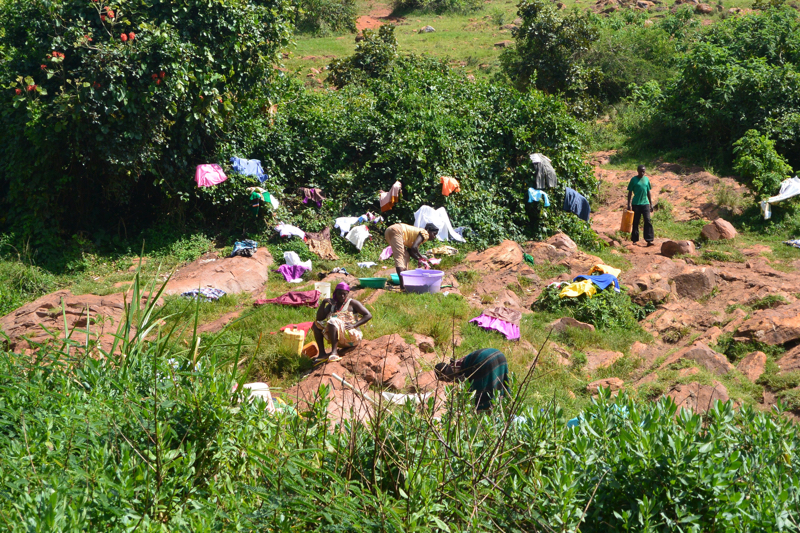
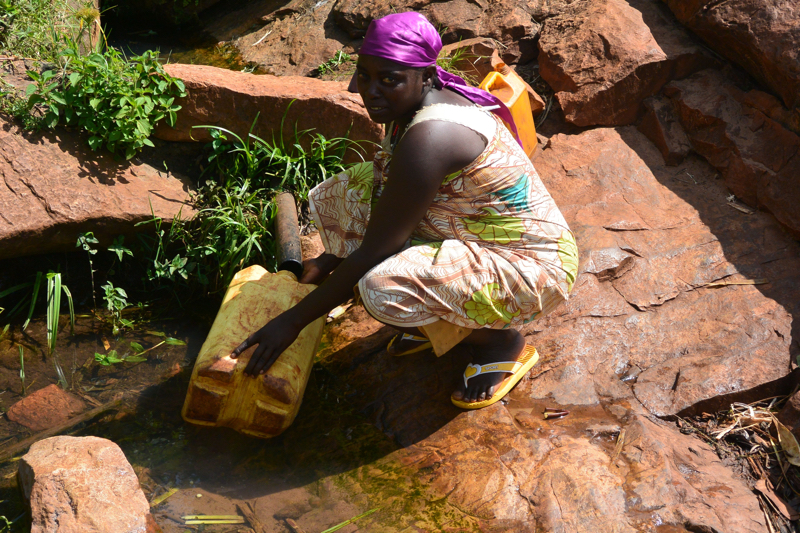
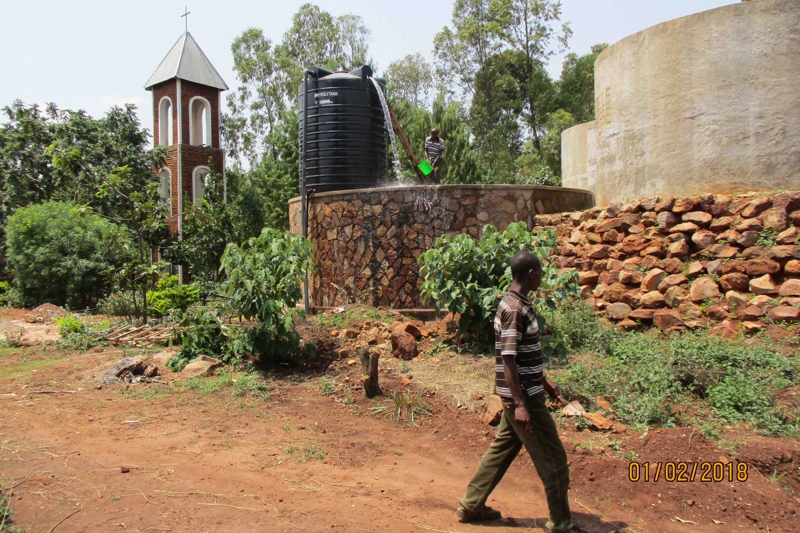
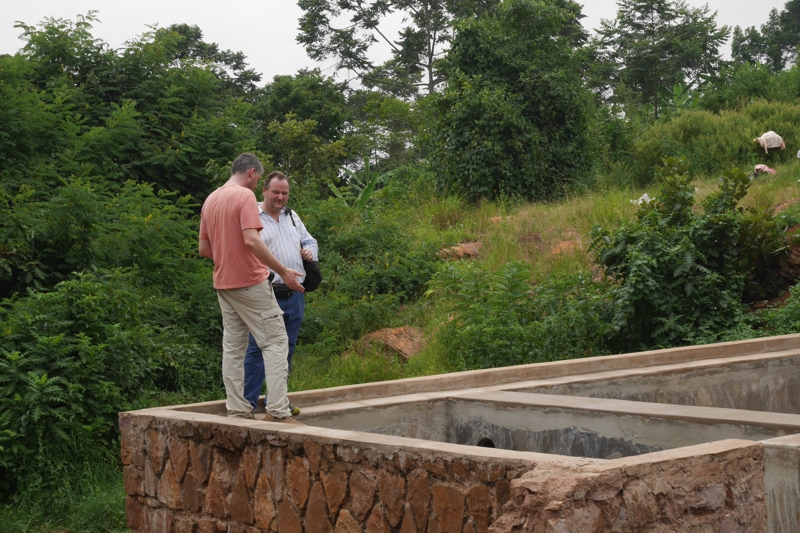
Location
The village of Nyakaiga is located northwest of Lake Victoria, 150 km west of Bukoba, the capital of the Kagera region. The Kagera region borders Uganda in the north, Rwanda and Burundi in the west and Lake Victoria in the east. The village has about 5.650 inhabitants.
Current situation
A problem the village of Nyakaiga faces is that not only the local population, but also a regional hospital, a secondary school and some primary schools must survive with a very limited supply of clean water. The inhabitants of this region mainly live from agriculture and therefore strongly depend on the availability of water. No water supply is in place, as is the case elsewhere in the region. As a result, all of the water used in the village must be transported from sources, located downhill at a certain distance, using containers and 20-liter cans. Generally, children and women are responsible for this work and children often have to get up early and fetch water before going to school. This lack of water is particularly difficult to manage for schools and for the local hospital.
Some numbers
Life expectancy at birth is 53 years for men and 58 years for women. 43.7% of the population in Tanzania is under 14 years old. The infant mortality rate was 65.74 % in 2011.
Description of the project (download Flyer)
Year 1: completion of works, installation of the new infrastructure, trainings
Year 2: monitoring the water supply, support, accompaniment and training of the local water management committee, adaptation of the water supply system if necessary
Year 3: follow-up of the project, accompaniment of the water management committee, evaluation of the project and adaptation of the project if necessary
The village of Nyakaiga comprises 1.215 families, resulting in 5.627 inhabitants.
The secondary and primary schools count 1.059 people (staff included). The hospital hosts a total of about 100 people /day (patients + staff). Therefore, the total of the direct beneficiaries amounts to 6.786 people (women, children and men). The number of indirect beneficiaries is estimated at +/- 10.000 people.
262'003.29 EUR : Budget allocated to the project
174'668.86 EUR : Contribution of the Luxembourgish Government 87'334.43 EUR : Contribution of Action pour un Monde Uni asbl
Local partner at Nyakaiga: KADDRO - Diocèse catholique de Kayanga
Co-financed by the Luxembourgish Ministry according to the framework agreement signed between the Luxembourgish Ministry and the NGO Action pour un Monde Uni on 11.01.2018.
next visit planned for October 2019
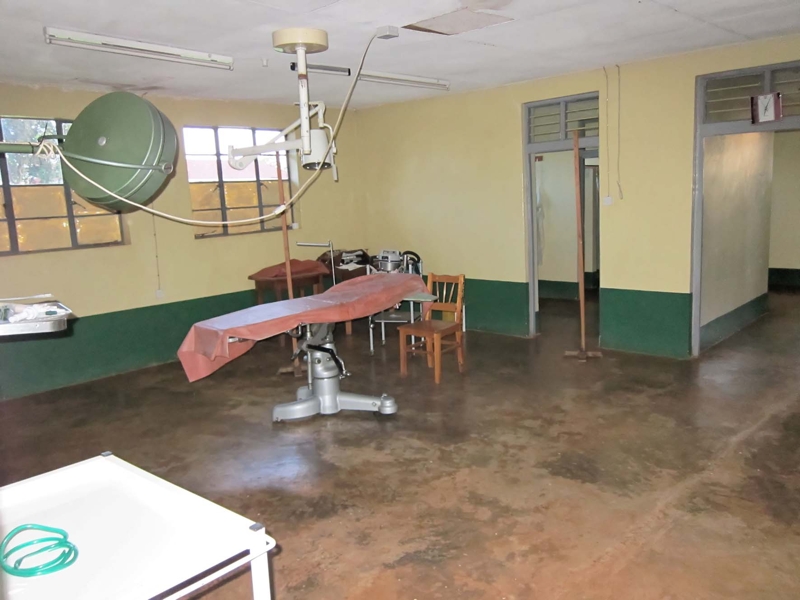
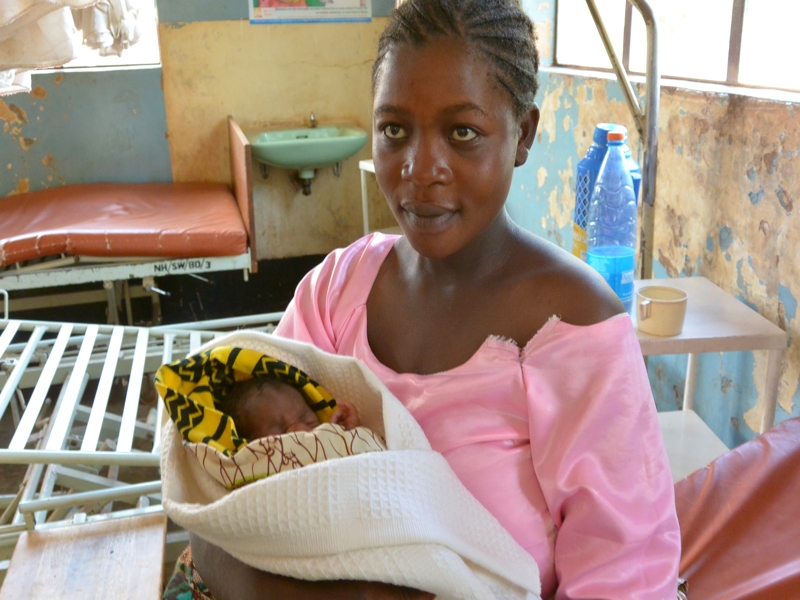
Location:
The project takes place in Nyakaiga, a village in the Karagwe region in northeastern Tanzania, near the Rwandan and Ugandan borders. The Karagwe region has about 332.020 inhabitants (2012 figures).
Current situation:
Currently, the hospital offers curative and preventive health care services. Throughout the region, the hospital provides primary health care and community-based health care through mobile clinics. An earthquake in September 2016 aggravated the precarious situation of the hospital. The walls got cracks and the hospital has to deal with a shortage of qualified staff, drugs and medical devices.
Some statistics:
Diseases like malaria, diarrhea, acute respiratory infections and HIV are particularly widespread in the Nyakaiga region. The Nyakaiga’s hospital was established in 1966 and was originally a small dispensary serving the community of Nyakaiga. In 2006, the dispensary was recognized as a hospital with a capacity of 60 beds and with more than 100.000 patients a year. Nyakaiga hospital has become a referral hospital for the entire region, notwithstanding the many problems and challenges the hospital has to face. Access to medical care is very limited for the local population and all medical facilities are in precarious conditions.
Description of the project (download Flyer)
The project aims to improve the access, availability and quality of the medical services of the hospital in Nyakaiga. The project includes the training of staff as well as the construction and equipment of staffhouses. It is very important in rural areas to offer adequate housing opportunities to staff members. The project strengthens the technical and management capabilities of the staff by providing trainings in financial management as well as in data management. Depending on the detected needs, further trainings will be considered. The hospital will also recruit additional medical staff and provide medical trainings.
The hospital in Nyakaiga serves a total population of 106.166 people, of whom 49.082 are men and 57,084 are women. The project focuses on access to medical care for women and children, as these represent the most vulnerable populations. Moreover, as the hospital in Nyakaiga is a referral hospital, it provides medical care to people from the entire region.
128'288.59 EUR : Budget allocated to the project
94'933.56 EUR : Contribution of the Luxembourgish Government
33'355.03 EUR : Contribution of Action pour un Monde Uni asbl
Local partner in Tanzania: KADDRO (Kayanga Diocesan Development & Relief Office)
Co-financed by the Luxembourgish Ministry according to the framework agreement signed between the Luxembourgish Ministry and the NGO Action pour un Monde Uni on 11.01.2018.
next visit planned for October 2019
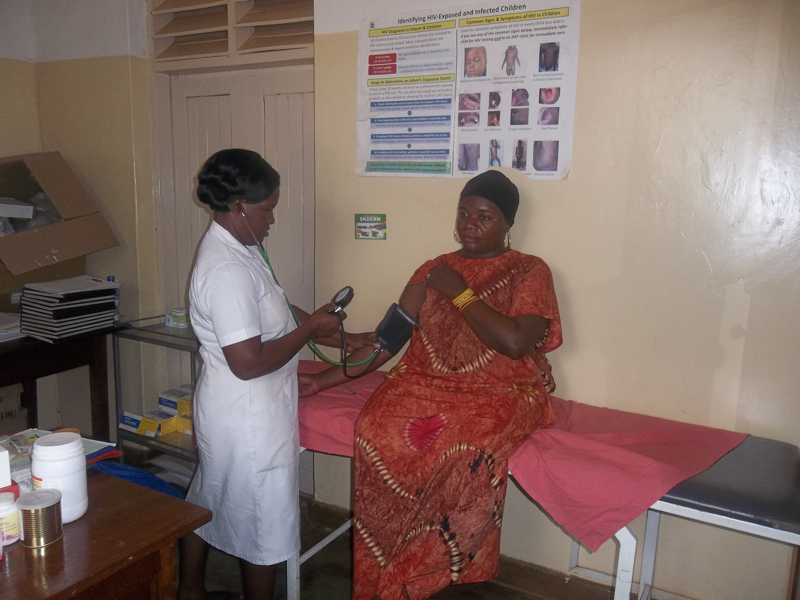
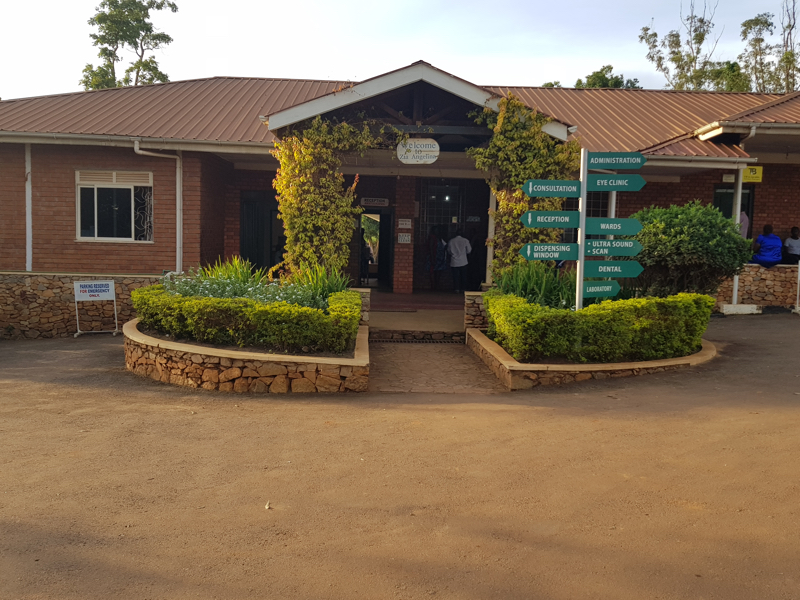

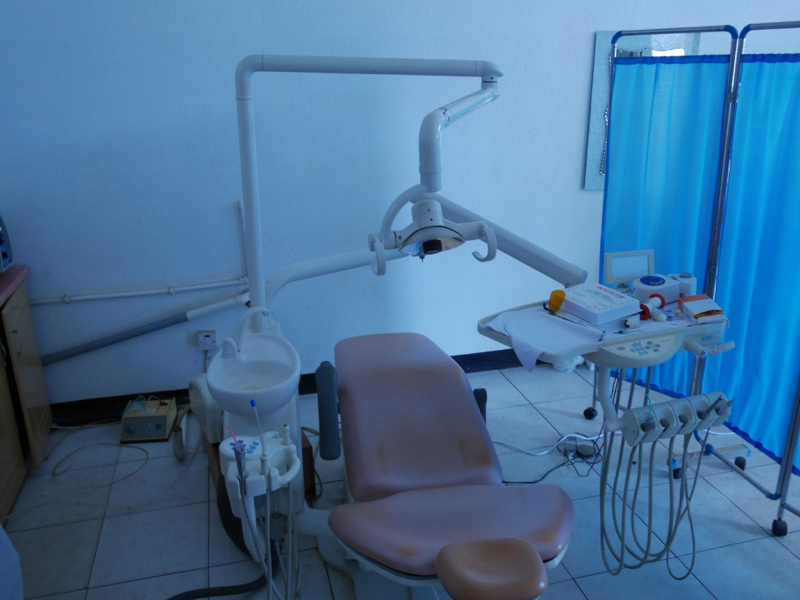
Location:
The project takes place in the hospital Zia Angelina at Namugongo, a town in the district of Wakiso in Uganda. Namugongo is located 16 km from the capital Kampala.
Some statistics:
The main deficiencies in the delivery of health services in Uganda are in the areas of sexual and reproductive health (maternal health, family planning and HIV prevention), especially for married women and young people aged 15 to 24 (ACAPS, 2018). The prevalence of HIV/AIDS in Uganda is particularly high. In 2015, 1.500.000 people were HIV positive, being 7.1% of the adult population (15-49 years old) (UNFPA). Every day, 230 people are infected with HIV - including two young women an hour – while 76 people die each day because of AIDS-related causes (UN Uganda, 2017). To tackle this challenge, the government began distributing ARV treatments for free.
Project-description (download Flyer)
The direct beneficiaries of this project are the 300 HIV positive people who will benefit from ARV therapy and psychosocial support. Moreover, all patients (about 20.000 per year) will benefit from the new structures of the hospital. Approximately 2.880 people will benefit from the awareness raising campaigns around HIV/AIDS. Finally, the indirect beneficiaries of this project are the 313.800 inhabitants of Namugongo.
323'746.50 EUR : Budget allocated to the project
239'572.41 EUR : Contribution of the Luxembourgish Government
84'174.09 EUR : Contribution of Action pour un Monde Uni asbl
Local Partner in Uganda: Zia Angelina Health Center-Namugongo
Co-financed by the Luxembourgish Ministry according to the framework agreement signed between the Luxembourgish Ministry and the NGO Action pour un Monde Uni on 11.01.2018.
next visit planned for october 2019
Asia
2015-2018 First emergency aid for the reconstruction and repair of health and first aid posts in Dhading and Baluwa after the earthquakes of 2015




Total budget of the project: 362'210.65 €
Action pour un Monde Uni: 62'210.65 €
Luxembourgish Government: 300'000 €
The Dhulikhel Hospital (DHOS) in Nepal was established in 1996 as a result of the collaboration between the municipality of Dhulikhel, NepaliMed Austria and the Dhulikhel Health Services Association. The main goal is to provide quality health services to everyone at affordable prices. Since then, the hospital has been continuously developing. The hospital has 16 outsourced first aid stations and a nursing school with a first aid station. These posts are set up in the heart of the villages, thus giving the inhabitants of the mountainous regions, far from any tarmac roads, the possibility of being treated on the spot and they no longer have to be absent for several days because of a health problem.
These centers can house patients who have undergone surgery while allowing a family member to stay with the patient. After the devastating earthquakes of April and May 2015, Dhading District was one of the worst affected districts. The Chhatre-Deurali health center in Dadhing continues to provide services. However, many rooms are badly damaged, the existing health center building is in poor condition and it is dangerous to enter. The government authority has marked this health center as a red zone, so it is not safe to work there and stay inside the building. As a result, a lot of care is done outside. The project will rehabilitate this health center. In Kavrepalanchowk District, which has a population of about 150,000 people, half of the population has become homeless as a result of this disaster. As the damage to the Baluwa health and first aid post is so severe, AMU is planning a total demolition and reconstruction of this first aid post.
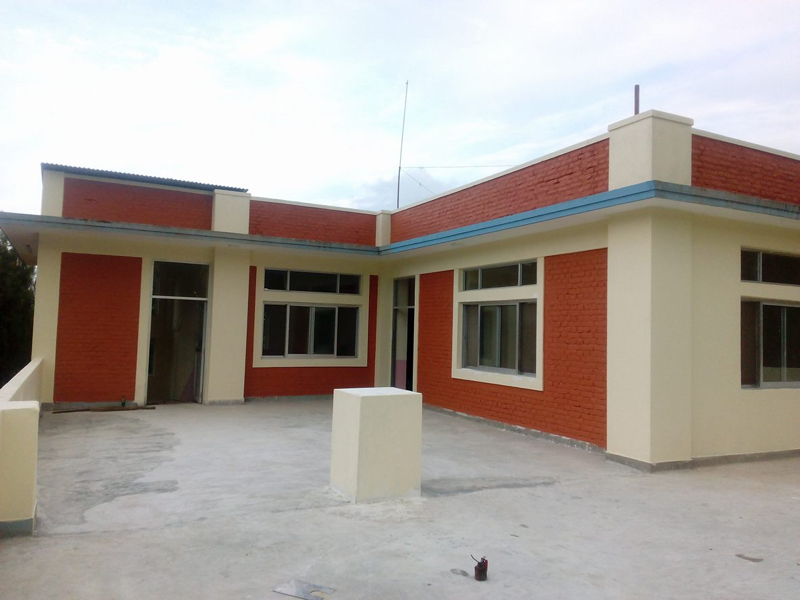
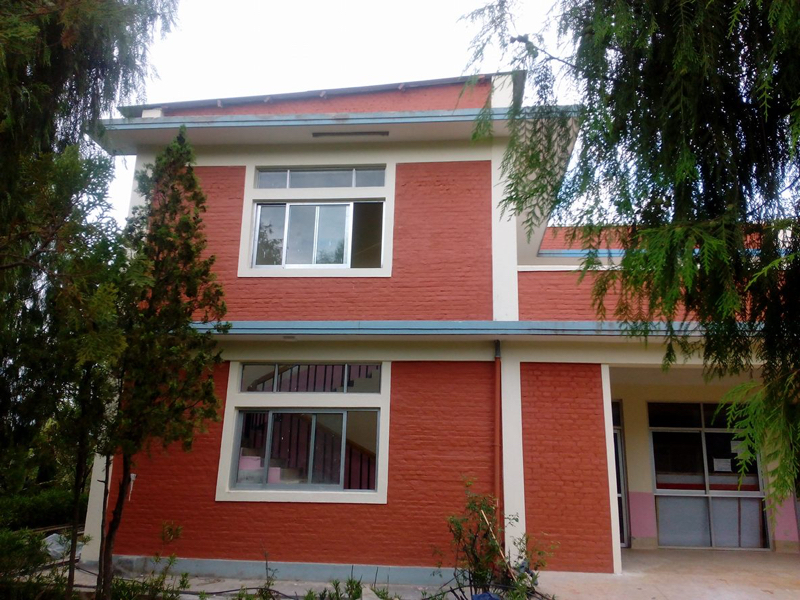
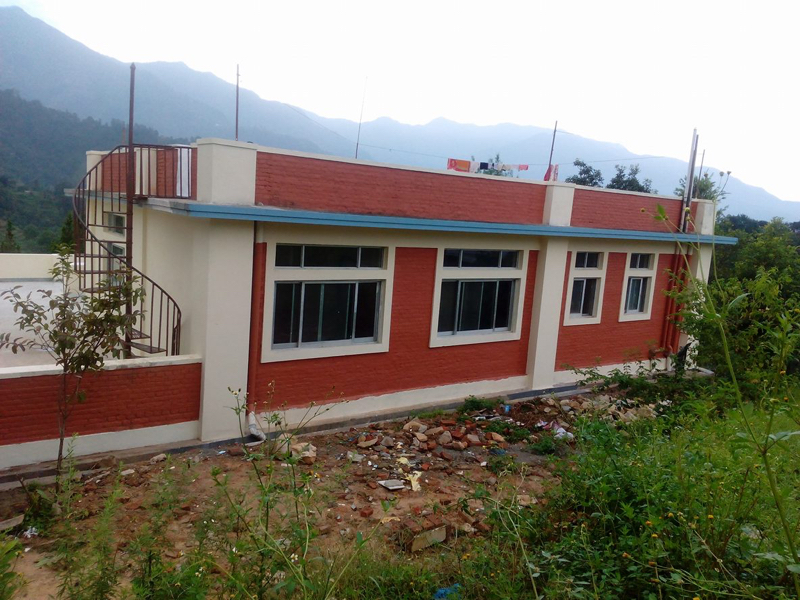
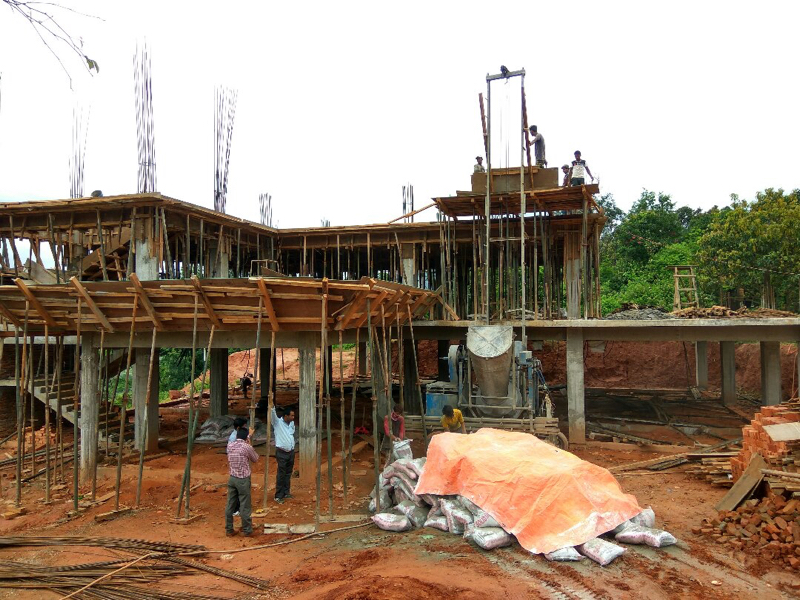
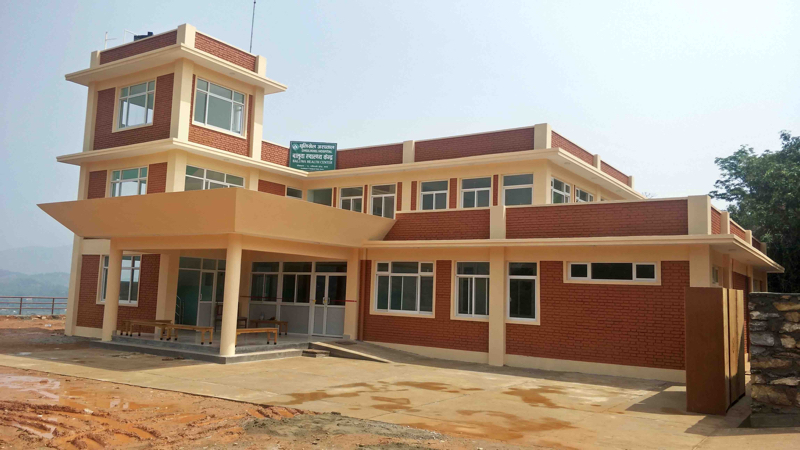
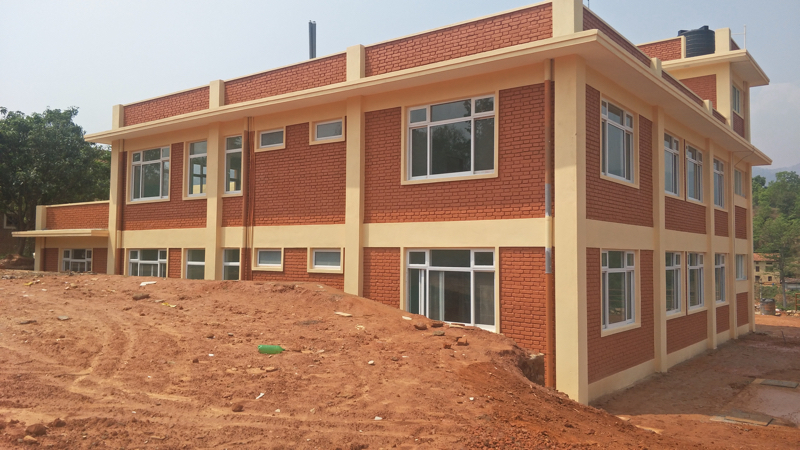
Help for the victims of the devastating earthquakes of April 2015 in Nepal.
The last figures of the earthquake counted more than 7.000 causalities and 14.000 wounded people!
Location
Action pour un Monde Uni a.s.b.l. collaborates with NepaliMed Luxembourg, which has been cooperating for 14 years with the Dhulikhel hospital in Nepal. The hospital, which exists since 1996, is experienced in working with the populations of the most remote and inaccessible regions.
The aftermath of the earthquake
The Dhulikhel hospital was almost spared by the earthquake. Dr. Ram Shrestha and his team were working 24 hours a day to treat the many wounded. The corridors and the outdoor enclosure were crowded with patients. People arrived by foot and carried wounded people on their backs. The Nepalese army had asked for help from the Dhulikhel hospital because the earthquake had destroyed several hospitals in the capital Kathmandu.
Project description
It is essential to rebuild those health centers in the region that have been hit the hardest and are no longer operational. This should be done as quickly as possible and we are required to react urgently! Action pour un Monde Uni is working together with NepaliMed on a project to rebuild the medical facility in Dhading. This project is co-financed by the Luxembourgish Ministry of Cooperation.
Action pour un Monde Uni asbl - NGO accredited Non-Governmental Organization in Luxembourg




